- 2024 TRAVEL UPDATE
- Work with us
- Beyond Bologna
- Regions of Italy
- Travel books
- Best group tours
- Itineraries
- Accommodation guide
- Italian phrases for travel
- Rocket Italian review: 2024 update
- Ultimate Italy Travel Planner
- City Planners
- Essential Guides
- Italy themed gift ideas
- Trip planning services

Learn Italian
101 basic italian phrases for travel you need to know for your trip to italy.
This article may contain compensated links. See our full disclosure here
If you’re planning on visiting Italy then it’s a good idea to learn some key Italian phrases, words and sentences. In this guide to basic Italian phrases for travel, we step you through the most useful ways to communicate on your trip to Italy. After all, language is a big part of Italian culture and you want to experience it all, am I right?
Making an effort to understand and speak Italian on your trip is not simply a matter of respect – although we think this is very important too. When you talk to people in their language they appreciate it and experiences open up to you that would not have been possible if you had been speaking English.
Article contents
So let’s get started with the common Italian phrases and words that will be most useful to you on your travels.
Basic Italian phrases
When you visit Italy, these are the most common words and phrases that will demonstrate you have made some effort to speak the local language. Learning these useful Italian words will help you talk to all manner of people during your trip.
Note – We’ve provided a phonetic pronunciation guide after the Italian translation for each word. If you really want to get the accent right a little extra study is recommended. We’ve provided some useful resources at the end of this article to help you learn Italian travel phrases useful for your trip.
Yes – Si – See
No – No – Noh
Please – Per favore – Pehr fah- voh -reh
Thank you – Grazie – Grah -tsee-eh
You’re welcome – Prego – Preh -goh
Cheers! (To your health) – Salute! – Sah -loo-tay
Excuse me (for attention) – Scusi – S kooh – zee
Excuse me (to pass by) – Permesso – Pehr- mehs -soh
Do you speak English? – Parla Inglese? – Parh-la een-glay-zeh
I don’t understand – Non capisco – Non kah -pee-skoh
I’m sorry – Mi dispiace – Mee dees- pyah -cheh
Common greetings in Italian
One thing we really love about visiting Italy is the cultural differences and norms. In Italy, saying “good morning” is not simply a throwaway line. You should always greet people wherever you go – when entering a shop or restaurant, to hotel staff, on the bus or at a cultural sight. It’s the expected thing to do.
A friendly “buon giorno!” with a smile will go a long way. So here are the most common Italian greetings and their context so you get it right! Generally you use the formal with people you don’t know, especially older people. The informal is used between friends.
Good morning (formal) – Buon giorno – Bwohn- johr -noh
Good afternoon (formal) – Buona sera – Bwoh -nah- seh -rah
Good night (formal) – Buona notte – B woh – nah – noh – teh
Hi / Bye (informal) – Ciao! – C how
Good bye (formal) – Arrivederci – A hr -ree-veh- dehr -chee
My name is … – Mi chiamo – Mee kyah -moh
What is your name? – Come si chiama? – Koh -meh see kyah -mah?
Pleased to meet you – Piacere – Pyah- cheh -reh
How are you? (formal) – Come sta? – Koh -meh stah?
Good thank you – Bene grazie – B eh -neh grah -tsee-eh
How to say numbers in Italian
While you don’t need to be able to count to 100, a good grasp of numbers up to 12 at least (for the hours of the day) will stand you in good stead. After all, you need numbers when you’re at a restaurant – una pizza per favore! (a pizza please!)
One – Uno – Oo -noh
Two – Due – Doo -eh
Three – Tre – Treh
Four – Quattro – Kwah -troh
Five – Cinque – Cheen -kweh
Six – Sei – Say
Seven – Sette – Seht -tey
Eight – Otto – Oh -toh
Nine – Nove – Noh -veh
Ten – Dieci – Dee- EH -chee
Eleven – Undici – Oon – dee-chee
Twelve – Dodici – Doh -dee-chee
To learn more about counting in Italian click here
Telling the time and days of the week
Here are the basics of telling time in Italian, plus days of the week and other useful sentences for making reservations and plans. Italians generally use a 24 hour clock but also understand the 12 hour clock if you specify morning and afternoon.
In the morning – Di M attina – Dee mah- teen -ah
In the afternoon – Di p omeriggio – Dee poh-meh- reed -joh
In the evening – Di Sera – Dee se h – rah
Noon – Mezzogiorno – Mehd-dzoh- johr -noh
At what time? – A che ora? – Ah kay oar-ah?
Nine o’clock in the morning – Le nove – Le noh-vay
Eight o’clock in the evening – Le otto di sera / – Le ot-to dee seh-rah
Monday – Lunedì – Loo-neh- dee
Tuesday – Martedì – Mahr-teh- dee
Wednesday – Mercoledì – Mehr-koh-leh- dee
Thursday – Giovedì – Joh-veh- dee
Friday – Venerdì – Veh-nehr- dee
Saturday – Sabato – Sah -bah-toh
Sunday – Domenica – Doh- meh -nee-kah
Today – Oggi – Ohd -jee
Yesterday – Ieri – Yeh -ree
Tomorrow – Domani – Doh- mah -nee
Want to speak more Italian?
Check out our review of Rocket Italian , one of the best online courses for learning Italian.
Useful phrases at restaurants
No doubt your Italy trip includes a plan to enjoy a few meals at restaurants. And we’re sure ordering a gelato or two is also high on your list. Let’s get you ready with these essential Italian phrases you need for ordering food or at restaurants. These may be the times that you interact with Italians the most so practice your greetings too!
Can I see the menu please? – Il menu, per favore – Eel men-oo, pehr fah- voh -reh
What do you recommend? – Che cosa ci consiglia? – Kay koh-za chee kon-seel-ya?
I’m allergic to… – Sono allergica/o a.. . – Son -oh ah -ler-gee-koh / kah ah
Gluten / Dairy / Fish – Glutine / Lattecini / Pesce – Gloo-teen-ay / Lah-tay-cheen-ee / Pesh-ay
House wine – Vino della casa – Vee -noh del-lah car-sah
Red / white wine – Vino rosso / bianco – Vee – n oh ross-oh / bee-ahn-koh
A glass / bottle – Una bicchiere / una bottiglia – OO -nah beek- kyeh -reh / boht- tee -lyah
Appetizer – Antipasto – Ahn -tee-pah-stoh
First course – Primo – Pree -moh
Second course – Secondo – Sek -kon-doh
Dessert – Dolci – Doll -chee
Two flavors please – Due gusti, per favore – Doo -eh goo-stee, pehr fah- voh -reh
Where’s the bathroom? – Dov’è il bagno? – Doh- veh eel bahn -yoh?
The check (bill) please – Il conto, per favore – Eel kon-toh, pehr fah- voh -reh
Can I pay by card? – Posso pagare con la carta? – Pohs -soh pah- gah -reh kon la cahr-tah?
Words to know when you are visiting museums
Visiting museums and attractions is a big part of many Italian itineraries. In this section, we’ve given you some useful phrases in Italian to help you buy tickets and ask common questions.
When does it open / close? – Quando si apri / chiude? – Kwahn -doh see ah-pree / chee-oo-deh?
Two adults / one child – Due adulti / un bambino – Doo -eh ah-dool-tee / oon bahm-bee-noh
One / two ticket/s – Un / due biglietto/i – Oon beel-yet-toh / tee
One senior – Un pensionato – Oon pen-seyoh-nah-toh
One student – Uno studente – Ooh -noh stoo-den-teh
Where is the bag store / cloak room? – Dov’è la guardaroba? – Doh-veh lah gard-ah-robe-ah?
Asking for directions in Italian
If you get lost or need help with directions, these helpful words in Italian will come in handy.
Where is… ? – Dov’è…? – Doh-veh … ?
Entrance – Entrata – En -trah-tah
Exit – Uscita – Ooh -shee-tah
Left – Sinistra – See – nee-stra
Right – Destra – Deh -stra
Straight ahead – Dritto – Dree-toh
Forward – Avanti – Ah -vahn-tee
Back – Dietro – Dee-et-roh
Useful words for transport and getting around
Most visitors to Italy will need to take a train or bus, or ride in a taxi. These phrases will be useful in these situations when it is likely you may need to ask for help to reach the right platform or bus stop.
Where is the train station? – Dov’è la stazione? – Doh-veh lah stah-tzee-oh-neh?
Where is the bus stop? – Dov’è la fermata – Doh-veh lah fur-mah-tah?
One way – Andata – Ahn – dah-tah
Return – Ritorno – Ree -torn-oh
What platform for Rome? – Da quale binario per Roma? – Dah kwah-lay bin-ah-rio pehr Roh-mah?
Newstand (for bus tickets) – Tabacchi – Tah-back-kee
Shopping words in Italian
Time to go shopping! Make sure you’re ready with these key phrases.
I would like… – Vorrei… – Vor-ray…
How much is this? – Quanto costa questo? – Kwahn -toh kohs -tah kwehs -toh??
OK I’ll take it – Va bene, lo prendo – V ah beh -neh , loh prehn- doh
I don’t want it – Non lo voglio – N ohn loh voh- lyoh
Can you ship to…? – Puoi spedire a? – Pwoy sped -ear-eh ah?
What to say if you need help in Italian
We hope you never need to use these phrases but it’s a good idea to know them “just in case”.
Help! – Aiuto! – Ay-oo-toh!
I need a doctor – Ho bisogno di un dottore – Ho biz-ohn-nyo dee oon dot-tor-reh
Call the police – Chiami la polizia – Kee-ya-mee la po-lee-zee-ah
Look out! – Attento! – At – ten-toh
Go away! – Vai via! – Vy vee-ah!
Want to get beyond basic Italian phrases for travel?
These days there are a wealth of resources to help you learn Italian. You can use handy apps, books and podcasts to get started and we outlined some of the best of these in this article .
But, if you want to construct your own basic Italian sentences and perfect your accent, a systematic approach with a proven method will help you make progress quickly. After much trial and error, we enjoy using Rocket Italian . This online course combines verbal cultural situation lessons with grammar and vocabulary to get you speaking Italian quickly. My accent also improved significantly thanks to the voice recognition tasks.
Another option for travelers wanting a quick start to learning Italian for their trip is the fast track method developed by our friends at Intrepid Italian. Designed to get you speaking the key phrases you need for your trip, this short course aims to get you speaking travel ready Italian in 2 weeks > more info .
Planning a trip to Italy?
We love travel in Italy and sharing our knowledge. Read our Italy trip planning guide or join our FREE Italy travel planning community . Our 140,000+ members are happy to answer questions about your itinerary, how to get from place to place, the best places to stay and fun things to do.
Sign up for our news and podcast updates where we share mini guides, tips, exclusive deals and more and we'll send you our Italy Trip Planning Checklist to say grazie ! >> click here to subscribe
Please share if you found this article useful
An Italian Mama's Guide to Italy
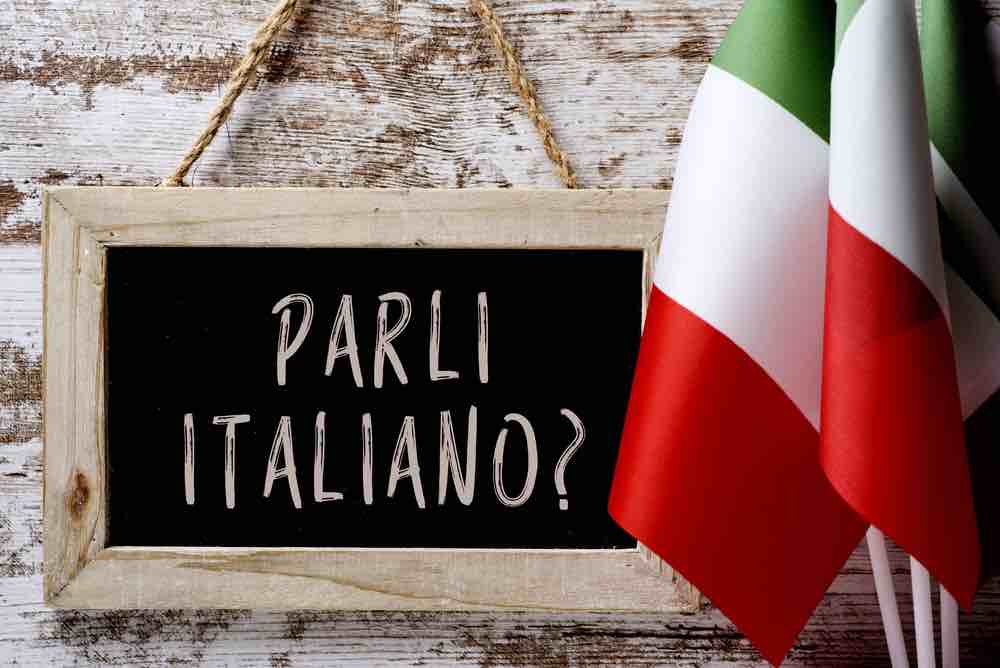
Travelers Italian: 100+ of the most useful Italian phrases for travel
Travelers’ Italian. Over 100 easy and useful Italian phrases for travel and basic Italian words that will help you make the most of your time in Italy (by a teacher)
You do not need to speak Italian to enjoy your time in Italy.
However, knowing basic Italian words or being able to express simple sentences will go a long way to improve your stay.
We Italians love it when foreigners make an effort and while I know it is daunting to express yourself in a language you do not dominate, you will see most people will react with great appreciation!
I am a qualified teacher of Italian as a second language and most of my students came to class before a trip to Italy, to learn Italian phrases tourists could learn or carry with them while in Italy for quick reference.
Today, I want to share the travelers’ Italian phrases most commonly requested in my classes.
These, we found, were the most useful Italian phrases for tourists and were all reasonably easy to learn or read out when needed!
As you will see, it is a mix of basic Italian words and Italian phrases for tourists that cover situations you may encounter while traveling in Italy.
I hope you find them useful!
This article is part of our series ‘Learn Italian’. You can find here >>> all our free Italian lessons <<<
You can hear the pronunciation of these Italian phrases for tourists copying them into google translate and clicking on the little megaphone symbol – try here
Basic Italian words and Italian phrases for travel
Before you learn specific Italian phrases for travel, you want to learn your basics.
- Si – yes
2. No – No
3. Grazie – thank you
Grazie is the most common way to express gratitude in Italian but there are several others you may hear or want to use. Learn how to say thank you in Italian here.
4. Prego – you are welcome / please
5. Per favore – please
Please can be tricky to express in Italian. Learn how to properly say please in Italian here.
6. Mi scusi – Excuse me
7. Scusi – Sorry
8. Non capisco – I don’t understand
9. Non parlo italiano – I don’t speak Italian
10. Aiuto! – Help !
Simple Italian phrases to make yourself understood
Parla inglese? – Do you speak English?
Mi dispiace, non parlo Italiano – Sorry, I don’t speak Italian
Piu’ piano per favore – slower please
Puo’ ripetere , per favore? – Can you say that again, please?
Common Italian phrases to greet someone
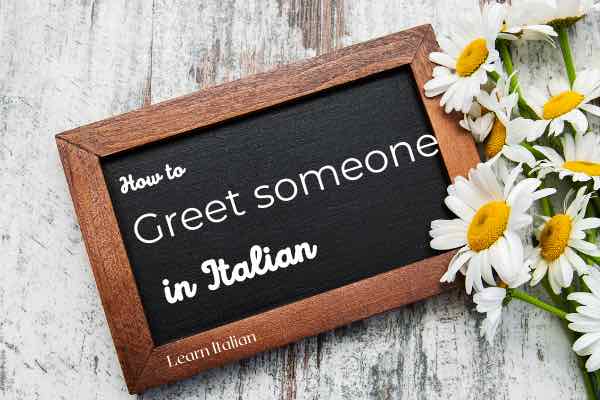
Ciao – hello / goodbye, informal
Buon giorno – good morning
Buona sera – good evening
Buona notte – good night
Buon pomeriggio – good afternoon, mostly used when parting from someone, slightly formal
Arrivederci – goodbye / bye bye (formal)
A presto – see you soon
Good to know : in most interactions with tourism establishments such as your hotel owner, host, ticket officer etc, you want to use greetings that are formal and polite. The most useful to learn are: buongiono (formal hello) and arrivederci (formal goodbye, at the end of a stay or a meal).
You can learn how to say hello in Italian here
Asking for directions – basic Italian travel phrases if you are lost
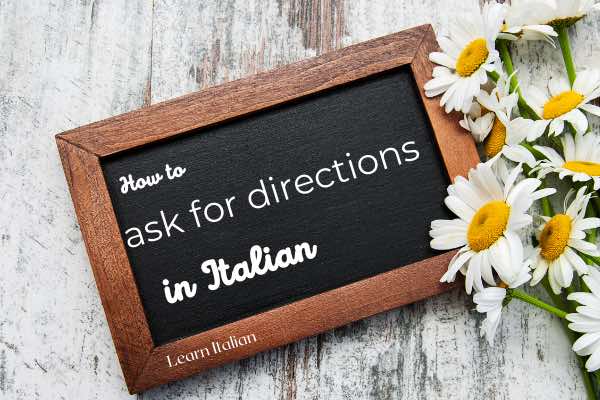
Dov’e’ ? – where is?
Ex Dov’e’ il Colosseo? Where is the Colosseum?
Ore more politely: ITA: Mi scusi, mi sa dire dov’e’ il Colosseo? ENG: Excuse me, would you be able to tell me where the Colosseum is?
E’ lontano? Quanto dista? – It is far? how far is?
How far is the Colosseum? Quanto e’ lontano/ Quanto dista il Colosseo?
Dritto – sraight
Destra – right
Sinistra – left
Semaforo – traffic light
Incrocio – crossroads
Ponte – bridge
Strada – street
Strisce / strisce pedonali – zebra crossing
Senso unico – one way street
Piazza – square
ZTL – Zona Traffico Limitato, an area closed to car traffic. Learn what they are and how to deal with them in this guide about driving in Italy.
Parcheggio -parking
A sample conversation may look like:
You: Scusi, dov’e’ il colosseo? Excuse me, where is the Colosseum?
Answer: vada dritto, poi al semaforo gira a destra e lo vede . Go straight, then at the traffic light turn right and you see it.
Another example can be: You: scusi, dov’e’ il bagno? (Excuse me, where is the restroom?) Answer: in fondo a destra (at the end of the room, to the right)
Transport and tickets
At train stations, airports and transport hubs, you may encounter or need to use the following Italian travel phrases and words:
Biglietto – ticket
Biglietto di sola andata – one way ticket
Biglietto di andata e ritorno – return ticket
Riduzioni / tariffe speciali / sconti – disxounts and special tariffs, usually for children/elderly/teachers/specified categories
Posto a sedere – seat
Treno – train
Binario – platform
Porto – harbor / port
Cabina – cabin (on a boat)
Traghetto – ferry
Aliscafo – hydrofoil (you will hear it to go to Capri for instance)
Prenotazione – booking / reservation
When you book a train ticket, it may come with a warning ‘prenotazione obbligatoria’, which means booking for a specific date/time/seat is mandatory.
Taxi – taxi
Autista – driver
Basic Italian sentences when at the shop
Quanto costa – How much is this?
Prezzo – price
Saldi – sales
Ha il resto? – Do you have change (if you are paying with a big note)
Carta di credito – credit card
Bancomat – debit card / also ATM
Posso provare? Can I try this on?
Do’ un’occhiata – I am just browsing / having a look
Si puo’ spedire? Can you ship this?
Caro – expensive Ex. No, grazie, e’ troppo caro . No, thank you, it is too expensive. Ex. Ha qualcosa di meno caro? Do you have anythign less expensive?
Top tip! To avoid embarrassing situations, learn about the etiquette of negotiating in Italian markets and shops here (hint you don’t!)
Medical emergencies
A well equipped arsenal of travelers Italian needs Italian phrases for travel emergencies, just in case!
Sto male – I am sick / I am unwell
Ho bisogno di un dottore / chiamate un dottore – I need a doctor / call a doctor
Aiuto ! – help!
Farmacia – pharmacy / chemist
Ospedale – Hospital
Pronto soccorso – A&E
Medico di guardia – doctor on call
Medicina – medicine
Ricetta – prescription
Mascherina – face mask / Mascherina chirurgica : disposable face mask (medical)
Dottore – Doctor
Infermiere / infermiera – nurse (male/female)
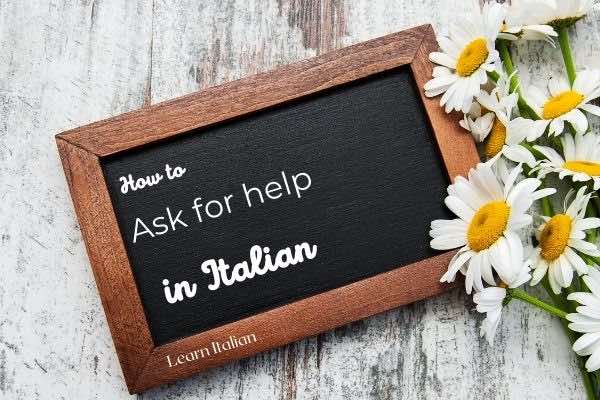
In hotel – useful Italian phrases about your accommodation
Camera – room
Camera matrimoniale – double room (with double bed)
Camere comunicanti – connecting rooms
Culla – baby cot/ crib
Letti a castello – bunk beds
Camerata – hostel room (with multiple beds)
Bagno in camera – en suite bathroom
Piscina – pool
Doccia – shower
Bagno – restroom
At the beach – useful Italian words for a day on the beach
Spiaggia – beach
Stabilimento – beach club
Ombrellone – sun umbrella
Sdraio – deckchair
Lettino – beach lounger
Bagnino – lifeguard
Crema solare – sunscreen
Secchiello e paletta – bucket and spade
Sabbia – sand
Scogli – rocks
Ghiaia – pebbles
At the restaurant – Italian words and sentences for a meal out
Food is such a large part of an Italian trip, my list of Italian phrases for travel needed a section about eating out, and so here it is!
Tavolo – table Ex. Ha un tavolo per quattro? Do you have a table for four?
Vino della casa – house wine
Acqua liscia / gassata – flat / sparkly water
Primo, secondo, contorno, dolce – these are the names of Italian courses. You can learn all about Italian meal structure here.
Mancia – tip (yes, you will need this one! Learn why here >>> guide to tipping in Italy
Allergia – allergy
Allergeni – allergens
Noci – walnuts / also generic word for ‘nut’
Noccioline – peanuts
Lattosio – lactose | Senza Lattosio = lactose free
Latticini / prodotti caseari – dairy products
Glutine – gluten
Kids essentials in Italian

Passeggino – stroller
Biberon – baby bottle
Ciuccio – soother / pacifier
Pappa – baby meal
Seggiolone – high chair
Pannolino – nappy / diaper
Pediatra – pediatrician
Scaldare – to heat: useful if you want to ask a restaurant/ cafe to heat up you child meal you brought from home (Mi puo’ scaldare la pappa per favore? Can you heat the baby food please?)
If you are about to travel to Italy with a baby, read this !
Other useful Italian words for travel you may want to use
Bello / bella – beautiful (male/neutral and female)
Presto, tardi – early, late
In ritardo – late Ex. Il treno porta un’ora di ritardo . The train is one hour late
Come stai? Come sta? – How are you? (informal / formal)
Piacere – when introduced to someone, how do you do
Gratis – for free
Salute! – Cheers! You can find the many ways to say cheers in Italian here.
Stagione – season, you may find it on price lists as Alta stagione ‘high season’; bassa stagione= ‘low season’. Learn here >>> how the seasons are called in Italy
If you are in Italy for the festive seasons, you may also want to learn how to say Merry Christmas in Italian or the Italian for Happy New Year .
I hope you found these Italian phrases for travel useful and you have a wonderful time in my beautiful country. Safe travel planning!
Travelers’ Italian – pin these Italian phrases for travel so you can carry them with you!
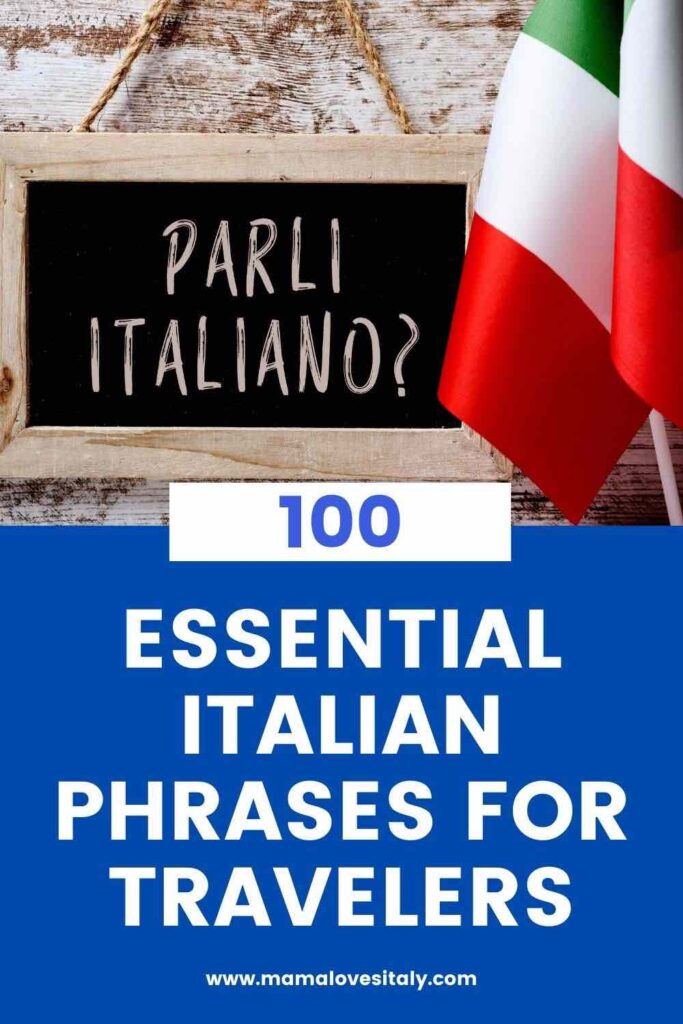
Marta Correale
Marta Correale is an Italian mama of two. Born and raised in Rome, Marta has a passion for travel and especially enjoys showing off Italy to her kids, who are growing up to love it as much as she does! A classics graduate, teacher of Italian as a second language and family travel blogger, Marta launched Mama Loves Italy as a way to inspire, support and help curious visitors to make the most of a trip to Italy and learn about Italian culture on the way.

You May Also Like

Pandoro vs Panettone : what you need to know about Italy’s most popular Christmas cakes

8th of March in Italy: what is Festa della Donna and how to celebrate it

Italian Christmas Foods: traditional foods you’ll love
Privacy overview.

The Ultimate Guide: 100+ Useful Italian Phrases For Travel That You Need To Know!
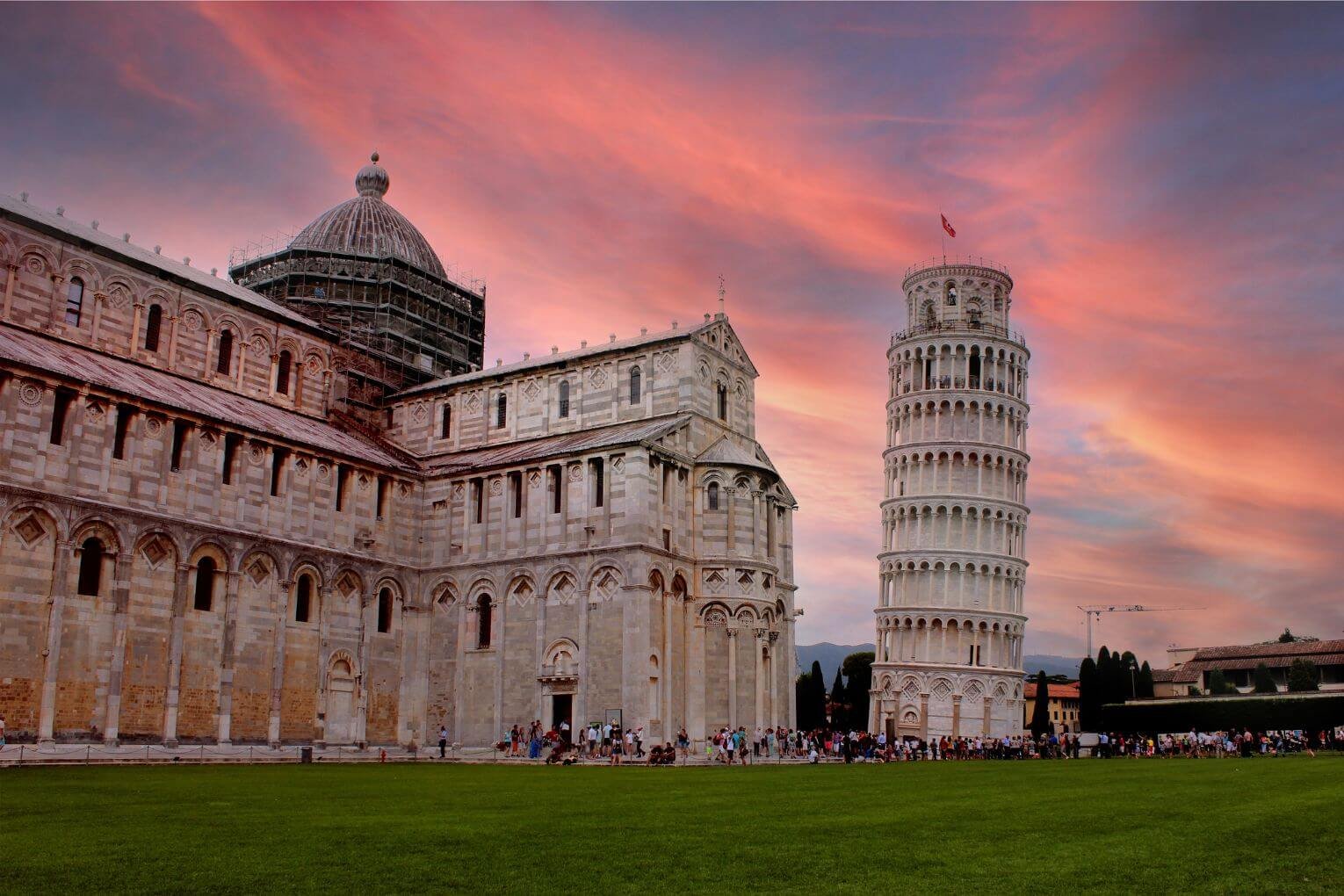
Photo Credit: M.F.D from Mehmet Fatih DAYAN
Affiliate Disclaimer: This post contains affiliate links. This means I will earn an affiliate commission if you click and/or make a purchase through the link (at no extra cost to you). And of course, I only recommend products I’ve used from companies I completely trust and love. For more information please see my disclosure .
What Are Some Basic Greetings Tourists Should Know In Italy?
Embarking on an Italian vacation? You're not alone if the thought of striking up a conversation in Italy feels daunting. Whether it's ordering your morning cappuccino or asking for directions to the Trevi Fountain, using local phrases can transform your travel experience.

But where do you start with so many words and sentences to remember? Fear not! This article is your linguistic treasure map, guiding you through essential Italian phrases tailored for travelers just like you.
We'll dive into greetings that will endear you to native speakers, key questions that make exploring easier, and how to dine out with confidence—without fumbling through a phrasebook.
Ready to chat away in charming Italian style? Keep reading because these tips will have locals mistaking you for one of their own!
Essential Italian Greetings And Goodbyes
Mastering the basics of Italian greetings and goodbyes is your passport to polite interactions and making a great first impression.
From a cheerful "Buongiorno!" to parting with a sweet "Arrivederci," these key phrases will ensure you navigate social exchanges with ease as you embark on your Italian adventure.
Common Greetings
Understanding common Italian greetings can help you navigate social situations with ease. These basic phrases show respect for the culture and enrich your interactions with locals.
Start your day like a true Italian by saying "Buongiorno" (Good Morning) to everyone you meet in the morning hours. It's polite and sets a friendly tone.
During the afternoon, switch to "Buon pomeriggio" (Good Afternoon). Use this greeting from noon until around 6 pm.
As evening draws in, greet people with "Buonasera" (Good Evening) , which is suitable from about 6 pm until bedtime.
When it's time to hit the hay, say "Buonanotte" (Good Night). This is a farewell meant for when you're parting ways at night or heading to sleep.
For a casual hello or goodbye, use "Ciao", which works for both and is best among friends or in informal settings.
In more formal scenarios or when meeting someone for the first time, opt for "Salve" as a respectful way to say hello.
To add a personal touch when leaving, say “Arrivederci” to express 'Goodbye' in most situations.
If you're bidding farewell to someone you won’t see for a while, “Addio” conveys a sense of finality.
See someone else off on their journey with “Buon viaggio” wishing them a good trip. It’s not only kind but also shows that you care about their experience.
Greet new friends warmly by saying “Piacere” (Nice To Meet You) after they introduce themselves. It’s polite and encourages further conversation.
Common Ways To Say Goodbye
After learning how to greet Italian speakers warmly with a "buon giorno" or "ciao," it's equally important to know how to part ways gracefully. Mastering common Italian goodbyes will ensure your interactions end on a positive note.
"Arrivederci" is a classic farewell you can use in almost any situation. It's polite and means "until we meet again."
When talking to friends or family, spice up your goodbye with an affectionate "Ciao!" which serves as both a casual hello and goodbye.
To formalize it slightly, opt for "Buona serata" when you're saying goodbye later in the day, wishing someone a 'good evening.'
If you plan on seeing someone later in the same day, say "A dopo," translating to "See you later."
In professional settings where politeness is key, say "Addio," a more formal term reserved for final farewells or when you won't see someone for a long time.
Leaving a shop? Say "Grazie, arrivederla!" which combines thank you with a polite “until we meet again,” showing gratitude and respect.
At the end of your night at someone's house or after dining out, express your appreciation by saying, “Grazie per la serata,” meaning “Thank you for the evening.”
When leaving an informal group setting and promising future contact, go with “Ci vediamo!” for “We’ll see each other!"
As you exit casual hangouts with peers or acquaintances, toss out one last friendly “A presto!” indicating “See you soon!”
Common Everyday Phrases
Diving into the heart of Italy, you'll find basic Italian phrases handy for any situation. Here's a collection to keep in your back pocket as you explore and engage with locals.
"Per favore" (Please) and "Grazie" (Thank you) - These are among the most important phrases to show politeness. Use them generously to be courteous.
"Mi scusi" (Excuse me) - Whether navigating through crowded streets or capturing someone’s attention, this phrase is a respectful way to do so.
"Va bene" (Okay/All right) - This versatile response can acknowledge an explanation or agree to a suggestion.
"Non capisco" (I don’t understand) - If things get confusing, this phrase is key. It signals that you need clarity, possibly followed by "Parla inglese?" if necessary.
"Quanto costa?" (How much does it cost?) - Use this when shopping or engaging in transactions. It helps manage your budget and avoid misunderstandings.
"Dov'è il bagno?" (Where is the bathroom?) - Essential for locating restrooms, especially in smaller towns without many public facilities.
"Posso avere il menu, per favore?" (Can I see the menu, please?) - When dining out, start here to make choosing your meal easier.
"Un tavolo per [numero], per favore." (A table for [number], please.) - Secure seating at restaurants by indicating how many are dining.
"Posso provare questo?" (Can I try this?) - Useful in shops when trying on clothes or sampling food items at markets.
"Mi sono perso/a." (I am lost.) - Should you find yourself disoriented; use this phrase to seek help getting back on track.
"Mi piace questo." (I like this.) - Show appreciation for meals, goods, or services. It's positive feedback for hosts and merchants.
"Buon appetito!" (Enjoy your meal!) - Say this before diving into a dish; it's equivalent to “bon appétit” and enhances dining experiences.
Common Italian Questions
Navigating a conversation in Italy becomes much smoother when you're familiar with common Italian questions. These basic inquiries will help you engage with locals and enhance your travel experience.
Start with "Come ti chiami?" (What's your name?) to introduce yourself and learn someone’s name. It's a friendly way to begin making new Italian friends.
Use "Come stai?" (How are you?) for casual conversation. It shows interest in the other person's wellbeing and is a great way to start small talk.
Ask "Quanti anni hai?" (How old are you?) if it's appropriate in the context of your conversation, such as getting to know someone better.
To delve deeper, inquire "Di dove sei?" (Where are you from?). This question often leads to interesting stories about different places.
If you need information, pose the question "Puoi aiutarmi?" (Can you help me?). Always useful, this phrase can come in handy in various situations.
Discover options by asking "Che cosa consigli?" (What do you recommend?). Use this while shopping or dining out for local recommendations.
Learn details with "Quanto costa questo?" (How much does this cost?), essential during shopping to avoid surprises at the cash register.
Clarify uncertainties with "Può ripetere, per favore?" (Can you repeat that, please?) whenever you need something said again for better understanding.
Navigate menus by asking "Qual è la specialità della casa?" (What is the house specialty?) when eating out to try traditional dishes.
Show curiosity by using “Cosa c’è da vedere qui intorno?” (What is there to see around here?) which can lead to discovering hidden gems off the beaten path.
"Embarking on an Italian vacation? You're not alone if the thought of having a conversation in Italy feels daunting. We'll dive into greetings that will endear you to native speakers, key questions that make exploring easier—without fumbling through a phrasebook." - @sololingual
CLICK TO TWEET
Making Small Talk In Italian
Dive into the heart of Italian culture by mastering the art of small talk; it's your golden ticket to forming genuine connections as you explore Italy's charm.
Keep reading because I'll share phrases that will have you chatting with locals like an old friend in no time!
Asking About Health And Wellbeing
Connecting with locals is part of the magic of travel, and showing interest in their wellbeing is a heartfelt way to do so. Mastering a few Italian phrases about health can bridge gaps and foster friendships.
Start conversations with "Come va?" which means "How's it going?" It’s an informal way to ask someone about their general wellbeing.
Use “Come stai?” to ask “How are you?” among people you are on friendly terms with. It's a bit more personal than "Come va?"
Express concern with "Tutto bene?" which translates to "Is everything alright?" This is used if someone seems upset or unwell.
Show empathy by saying “Mi dispiace sentire questo” when someone shares unfortunate news, meaning "I'm sorry to hear that."
Offer help with “Posso aiutare in qualche modo?” which means “Can I help in some way?” This phrase demonstrates your willingness to assist.
If discussing specific health issues, learn the words for doctor (dottore) or pharmacy (farmacia) for clarity in the conversation.
In formal situations or when addressing someone older, use “Come sta?” instead of “Come stai?”, as it shows more respect.
Asking "Sei stato male?" translates to "Have you been ill?" Use this if you know someone has been unwell recently.
Ensure clear pronunciation because Italian relies heavily on proper intonation, especially in expressing concern or sympathy.
Inquiring About Someone's Day
Moving from concerns of health to the subtleties of day-to-day experiences, mastering questions about someone's day offers a more personal touch to your Italian conversations.
You'll find that asking about a person's day is not just polite but also opens the door to meaningful interactions. Here is how you can inquire about someone's day in Italian with charm and genuine interest:
Start with "Come stai?" which means "How are you?" This is a good way to begin any conversation and shows you care right away.
If you've already asked "Come stai?" and want to go deeper, try asking, "Come è andata la giornata?" which translates to "How was your day?"
Respond appropriately with phrases like "Che bello!" (“That’s great!”) or “Mi dispiace” (“I'm sorry”) depending on what they share about their day.
Use a warm tone and friendly body language. Italians appreciate gestures and facial expressions that match the sentiment of your words.
Listen closely after you ask. Italians often share details about their days openly, so be prepared for a lengthy response.
Discussing Travel Plans
As you explore Italy, sharing your travel plans can lead to helpful tips and friendships. Learning how to talk about your journey can make a big difference in your experience.
Start conversations with "Vado a..." meaning "I am going to...". This phrase let's Italians know where you're headed and might inspire some local advice.
Use "Visiterò..." or "I will visit..." when speaking about specific places like monuments, museums, or towns.
Mention the duration of your stay with "Rimarrò qui per..." followed by the number of days or weeks.
Share what you're excited about by saying "Non vedo l’ora di vedere..." which translates to "I can't wait to see..."
Ask for suggestions on what else to see or do in the area with "Cosa mi consiglia di visitare?"
Discuss transportation by asking, “Qual è il miglior modo per arrivare a...?” meaning “What's the best way to get to...?”
Talk about past visits using the phrase “L’ultima volta che sono stato/a a...” which means “The last time I was in...”
Express interest in local events by asking “Ci sono eventi speciali questa settimana?” This asks if there are any special events that week.
If you’re looking for off-the-beaten-path experiences, say “Cerco qualcosa di meno turistico.” It means “I'm looking for something less touristy.”
When planning outings, ask about the weather with “Che tempo farà domani?" which means “What will the weather be like tomorrow?”
Asking For Directions In Italian
Navigating the winding streets of Italy becomes a breeze when you master a few key phrases for asking directions.
Whether searching for the nearest train station or that hidden piazza, your ability to ask locals "Dov'è..?" (Where is..?) can unlock the true charm of Italian exploration.
Key Phrases For Asking And Understanding Directions
Getting around a new city in Italy can be a breeze once you master some key phrases for asking and understanding directions. Equip yourself with these essential Italian travel phrases to make your next trip smooth and enjoyable.
Start with "Scusi, dov’è…" (Excuse me, where is…) when you are looking for a specific place. Always begin your request with politeness to engage helpful responses from locals.
Use "Dove posso trovare…" (Where can I find…) if you’re searching for something less specific, like a type of store or service.
Incorporate direction words such as "Sinistra" for left, "Destra" for right, and "Dritto" to go straight ahead after receiving instructions.
Ask "È lontano?" (Is it far?) to gauge whether your destination is within walking distance or if you'll need transportation.
If you must turn somewhere, clarify by saying “Dopo quanto devo girare?” (After how much do I turn?), which lets the person describe the distance before a turn.
Determine entrances and exits by inquiring “Dov’è l’entrata?” (Where is the entrance?) or “Dov’è l'uscita?” (Where is the exit?).
Learn to ask about landmarks with "Vicino a quale punto di riferimento è?" (Near which landmark is it?) as most directions are given relative to well-known places.
To understand, confirm by repeating back the direction using "Quindi, prendo la prima sinistra, poi la seconda destra?"(So, I take the first left, then the second right?), ensuring accuracy in what was explained.
For public transport locations say “La stazione del treno dove sta?” (Where is the train station?) or replace 'treno' with 'autobus' for bus stations.
Utilize "Mi sono perso/persa. Mi può aiutare?" (I'm lost. Can you help me?) if you lose your way – locals will generally be eager to assist those who try speaking their language.
Transportation And Getting Around
Navigating through Italy's transportation system can be a thrilling part of your travel adventure. Grasping some basic Italian travel phrases will help you move around confidently in big cities and smaller towns.
Start by learning how to ask for the train station: "Dov'è la stazione del treno?" It's an essential question that connects you with most destinations across Italy.
If buses are your go-to, knowing how to say “Where is the bus stop?” in Italian – "Dov'è la fermata dell'autobus?" – will come in handy.
Taxis offer convenience, so practice saying, “Can I get a taxi?” which is "Posso prendere un taxi?" when you need a quick ride.
When traveling between cities, inquire about tickets by asking, “How much is a ticket to…?” which translates as "Quanto costa un biglietto per...?"
Confirm departure times by asking "A che ora parte il treno/autobus?" This means "What time does the train/bus leave?"
For catching the right vehicle, ask “Is this the bus/train to…?” which translates as “È questo il treno/autobus per...?”
To reach a specific place within a city, learn to say “I would like to go to…” which translates as "Vorrei andare a..."
If you prefer walking but need guidance, confidently ask locals, “Can you show me on the map where this is?” which translates as "Può mostrarmi sulla mappa dove si trova questo?"
Knowing terms for different types of transport can also be useful. Learn words like 'il treno' (train), 'l’autobus' (bus), and 'il taxi' (taxi).
Always double-check if your transportation accepts credit cards or if it’s better to have cash; ask “Do you accept credit cards?” - "Accettate carte di credito?"

Italian Phrases For Shopping
Navigating Italian markets and boutiques becomes a breeze with the right phrases at your fingertips.
Equip yourself with phrases to inquire about prices, sizes, and negotiate, ensuring that shopping in Italy becomes as delightful as savoring a local caffè.
Common Phrases For Shopping And Bargaining
Heading to Italy soon? Master these common Italian phrases for shopping and bargaining to communicate with local vendors and get the best deals.
Start off with a friendly "Buongiorno" (Good day) or "Buonasera" (Good evening) to greet shopkeepers.
Show your interest in an item by asking, "Quanto costa?" which means "How much does this cost?"
If something catches your eye but seems a bit pricey, use "Posso avere uno sconto?" which translates to "Can I have a discount?"
To specify you're looking for a smaller size, say "Avete una taglia più piccola?"
In case you need a larger size, ask "Avete una taglia più grande?"
If you want to try something on, say "Posso provarlo?" which means "May I try it on?"
When you've decided to purchase something, let them know with "Lo prendo," which means "I’ll take it."
At times when you prefer paying with a card, ask if it's possible by saying, “Posso pagare con la carta?”
To graciously decline an offer or item, just say, “No grazie” (No thank you).
After wrapping up your purchase, always end on good terms with a polite “Grazie mille!” (Thank you very much!).
Italian Phrases For Specific Scenarios
Unlock the secrets to seamless cultural experiences by mastering specific Italian phrases for scenarios like museum visits; keep reading to become a savvy traveler in no time.
Visiting Museums
Diving into the world of Italian art and history requires a grasp of key phrases. Speak like a local to enrich your museum visits in Italy with these essential Italian sentences and vocabulary.
Start with a polite greeting to museum staff; "Buongiorno" (Good morning) shows respect and friendliness.
Know how to ask for opening hours: "A che ora apre il museo?" (What time does the museum open?).
For closing times, use: "A che ora chiude il museo?" (What time does the museum close?).
Purchase tickets effortlessly by asking, "Posso avere un biglietto, per favore?" (Can I have a ticket, please?).
Locate the cloakroom or bag store by inquiring, "Dove posso trovare il guardaroba?" (Where can I find the cloakroom?).
If you need the restroom, say: "Dov’è il bagno?" (Where is the bathroom?).
Discover specific exhibits by asking, "Dove si trova la mostra di [artist's name]?" (Where is [artist's name] exhibit located?).
Engage with staff and ask about favorite displays with, “Qual è l’esposizione più popolare qui?” (What’s the most popular exhibit here?).
Find out about guided tours with "Ci sono visite guidate in inglese?" (Are there guided tours in English?).
For special access or discounts, inquire by saying, “C’è un biglietto ridotto per studenti?” (Is there a discounted ticket for students?).
Learn more by using: “Mi può dire di più su quest'opera d'arte?” (Can you tell me more about this work of art?).
Thank staff as you leave: “Grazie per l'aiuto” or simply “Grazie” for thank you.
Say goodbye with a courteous "Arrivederci," signaling a respectful departure.
Italian Phrases For Eating Out
When dining in Italy, immerse yourself in the culinary culture with essential Italian phrases. Mastering simple expressions can turn a meal into a memorable experience, from ordering your favorite pasta to requesting "il conto" with confidence.
Useful Words When Ordering At Restaurants
Venturing into an Italian restaurant can be a delightful experience. Equip yourself with these phrases to order with confidence and savor the culinary delights Italy has to offer.
"Posso vedere il menu, per favore?" means "May I see the menu, please?" It's the first step in choosing your meal.
"Cosa mi consiglia?" is how you ask "What do you recommend?" This can lead to suggestions of the restaurant's specialties.
"Vorrei ordinare ___" translates to "I would like to order ___." Insert your chosen dish to place your order.
"Sono allergico/a a ___" is crucial if you say "I am allergic to ___." Always communicate dietary restrictions clearly.
Use "Appetizer", known as “Antipasto”, to start with some appetizers or starters.
Say "Primo piatto" for the “Main course" when you're ready for the entrée.
Mentioning “Insalata” lets staff know you would like a “Salad” alongside or before your main dish.
For a sweet ending, request “Dessert” by asking for "Dolce."
Don't forget about drinks; order “vino bianco” for white wine or just say what type of drink you desire.
After enjoying your meal, use “Il conto, per favore,” which means “The check, please,” to ask for the bill.
How To Ask For The Bill
Eating out in Italy is a delight, and knowing how to ask for the bill in Italian shows respect for the culture. Here's how to make this simple request without fumbling for words.
Use the phrase "Il conto, per favore" to politely ask for the bill. This translates directly as "The bill, please."
Try saying "Posso avere il conto?" which means "Can I have the bill?" if you want to be extra courteous.
If you feel more conversational, ask "Ci porta il conto?" suggesting "Will you bring us the bill?"
To indicate that you're ready to pay, say "Possiamo pagare?" implying the question, "Can we pay?"
Always give a smile and a heartfelt “Grazie” when you receive service; appreciation is universal!
Practice your pronunciation of these phrases before dining out; Italian pronunciation can be tricky but rewarding when done right.

Italian Phrases For Emergency Situations
When facing an urgent issue, knowing a few key Italian phrases for emergency situations can be a real lifesaver.
Whether it's seeking medical attention with "Ho bisogno di un dottore" or finding the nearest police station, these expressions are crucial to remember when you're in a pinch.
Essential Phrases When You Need Help
Traveling in Italy can be an amazing experience, but it's important to be prepared for unexpected situations. Knowing essential Italian phrases for emergencies ensures you can quickly get help when needed.
Shout "Aiuto!" loudly if you're in immediate danger and require assistance; it simply means "Help!"
Use the phrase "C'è stato un incidente" to inform others that there's been an accident and emergency services may be needed.
In a critical situation, saying "Chiamate un'ambulanza" tells people around to call an ambulance right away.
Point out you need medical attention by stating "Ho bisogno di un dottore," which translates to "I need a doctor."
Say "Dove è l'ospedale?" if you’re seeking the nearest hospital. This question means "Where is the hospital?"
If medication or first aid is what you need, ask "Dove posso trovare una farmacia?" which translates to "Where can I find a pharmacy?"
To express that something is wrong without specifying what, say “Qualcosa non va,” meaning “Something is not right.”
When unsure about your surroundings or seeking safety, ask a local, “Può aiutarmi?” which means “Can you help me?”
For legal issues or when feeling threatened, request police involvement by saying “Chiamate la polizia,” meaning “Call the police.”
Transport Words And Phrases In Italian
Navigating the cobbled streets and picturesque landscapes of Italy requires a basic understanding of transport lingo, from "treno" (train) to "autobus" (bus).
Familiarize yourself with the essential Italian words and phrases to move around with ease, ensuring your adventure is as smooth as a gondola ride along Venice's canals.
Important Words For Using Public Transportation
Getting around Italy is easier if you know some key Italian phrases for public transportation. This list will help you communicate your travel needs with confidence.
"Dov'è la stazione?" means "Where is the station?" Use this to find the central train station.
Say "Un biglietto per..." followed by your destination to buy a ticket, such as "Un biglietto per Roma" for a ticket to Rome.
Ask "A che ora parte il treno?" to find out when your train leaves, which means "What time does the train leave?"
If you're taking the bus, "Quando arriva l'autobus?" is useful and means "When does the bus arrive?"
Finding your platform is crucial; use "Da quale binario parte?" which translates to "Which platform does it leave from?"
For longer travels, inquire about a specific seat by asking, “Posso prenotare un posto?” meaning “Can I reserve a seat?”
In case there are changes or delays, ask "Ci sono cambiamenti nell'orario dei treni/autobus?" which means "Are there any changes in the train/bus schedule?"
To get off at the right spot, say “Mi faccia sapere quando arriviamo a...” followed by your stop. It translates to “Please let me know when we arrive at…”
Should you need assistance with luggage on trains or buses, use “Potete aiutarmi con i bagagli?” meaning “Can you help me with my luggage?”
Finally, always thank the conductor or driver after your journey by saying “Grazie” which simply means “Thank you.”

Numbers, Time And Days Of The Week In Italian
Master the essentials of Italian numerals, tell time like a local, and navigate your plans with ease by learning the days of the week in Italian—crucial tools to enrich your travel experience.
Keep reading to add these vital elements to your language toolkit!
How To Express Numbers, Time And Days Of The Week
Expressing numbers in Italian is your key to shopping, making reservations, and setting appointments. Telling time and understanding the days of the week are essential as they help you navigate schedules and plan your activities efficiently.
Start with basic numbers from one to ten - uno (1), due (2), tre (3), quattro (4), cinque (5), sei (6), sette (7), otto (8), nove (9), dieci (10). These form the foundation for larger numbers.
Combine basic numbers to form teens - undici (11) through diciannove (19) by simply adding "-dici" after the root number from four to nine.
For multiples of ten, use venti (20), trenta (30) up to cento (100). To say twenty-one, you’d say “ventuno” and so on.
Learn hundreds by starting with "cento" - due cento for 200, tre cento for 300, up until mille for 1000.
Telling time starts with "Che ore sono?" which means "What time is it?" Hours are expressed as "È l'una" for 1 o'clock or "Sono le due" for 2 o'clock.
For half hours add "e mezza" after the hour, like "Sono le due e mezza" for 2:30.
Minutes past the hour can be said using “e” plus the number of minutes; for example, “Sono le tre e cinque” means it's 3:05.
Phrases such as "meno un quarto" or "un quarto past”, indicate quarter till or quarter past the hour respectively. At 4:45 pm you'd say “Sono le cinque meno un quarto.”
Days of the week start with Monday: lunedì, followed by martedì, mercoledì, giovedì, venerdì; then comes sabato and domenica for weekend days.
The phrase “Che giorno è oggi?” means “What day is today?”, answered typically with “[Oggi è] lunedì,” replacing “lunedì” with the current day of the week.
Tips For Learning Italian Phrases
Learning Italian can open up a new world of cultural experiences and enhance your travel adventures. With consistent practice and the right approach, you'll start to pick up phrases more quickly.
Immerse yourself in the language by listening to Italian music or watching films with subtitles. This helps you get used to the rhythm and sound.
RELATED: 13 Ways To Effortlessly Integrate Studying Into Your Language Learning Routine .
Use language learning apps that offer voice recognition features which can help in perfecting pronunciation.
Practice speaking out loud, not just in your head; this improves your fluency and memory retention.
Carry a small notebook or use an e-mail app on your phone to jot down new words and phrases as you learn them—it’s great for quick reference.
Find an Italian-speaking language exchange partner or enroll in an online course where you can converse regularly.
RELATED: How To Find Your Perfect Language Tutor Online (12 Simple Steps) .
Incorporate basic Italian words into everyday situations, even if it's just saying 'buona notte' before bed.
Label items around your home with their Italian equivalents to bolster vocabulary acquisition passively throughout the day.
Flashcards are classic but effective—create a set with common Italian phrases on one side and their English translations on the other.
Avoid leaning too heavily on translation tools like Google Translate as they may not always provide accurate contextual translations. Instead, try understanding how sentences are structured in Italian compared to English.
Make note of idiomatic expressions since these often don’t have direct translations but are crucial for sounding natural when conversing with native speakers.
Dive into Italy's rich literary history once you're comfortable enough; reading original text work reinforces grammar knowledge while exposing learners to advanced sentence structures.
Above all else, be patient with yourself as mastering any second language is a gradual process filled with successes and setbacks alike.
What Is The Best Way To Learn Italian For A Trip?

With the Pimsleur language learning app , mastering Italian travel phrases and more becomes an enjoyable and rewarding experience.
The Pimsleur method focuses on conversational skills to ensure you're not just memorizing words, but learning how to use them in context.
The listening and repeating exercises focus on pronunciation, accent, and intonation, making you sound more like a native speaker. This is perfect for mastering travel phrases as it not only teaches you what to say but how to say it.
RELATED: Pimsleur Review: How To Learn Any Language With This Super Easy Method .
Moreover, each 30-minute lesson is designed to be engaging and interactive, reinforcing what you've learned through spaced repetition.
The app is also mobile-friendly, meaning you can learn on-the-go, turning idle time into productive language learning moments.
Whether you're planning a trip to Rome or just want to broaden your linguistic horizons, Pimsleur's practical, science-backed approach makes it an effective tool for learning Italian.
Start your FREE 7-Day Trial of Pimsleur Italian!

Dive into Italian culture with confidence by using these essential travel phrases. Enjoy authentic interactions and navigate Italy's charming streets as a savvy visitor.
Discover the joy of making conversation at quaint cafes and handle transactions like a pro in bustling markets.
These simple yet powerful expressions will transform your ordinary trip to a memorable journey filled with local engagement. Start speaking Italian today; it'll be your passport to an unforgettable adventure!
A TINY REQUEST: IF YOU LIKED THIS POST, PLEASE SHARE THIS?
Ready to have some fun learning a new language? Then take action on what you just learned - you’ll be glad you did! Be a good friend and share this post on social media.
Also, share this post with anyone you know who’s looking to learn a foreign language! Just think how good you’ll feel when your friends thank you for bringing them insight and some surprising discoveries about language learning!
I know most people don’t share because they feel that us bloggers don’t need their “tiny” social share. But here’s the truth…
I built this blog piece by piece, one small share at a time, and will continue to do so. So thank you so much for your support, my reader.
A share from you would seriously help a lot with the growth of this blog.
Some great suggestions:
Pin it! (I even made a pretty pin for ya!)
Share it to Facebook
Flip it on Flipboard
It won’t take more than 10 seconds of your time. The share buttons are right here.:)
Thank you so much!
So, here’s the question: Have you been to Italy before? Can you speak a little bit of Italian or are you a complete beginner in the Italian language? Let us know in the comments section down below!

P.S. I want to hear from you today. No for real, get out from behind that keyboard and tell us more about yourself! Use the comment section down below and introduce yourself.
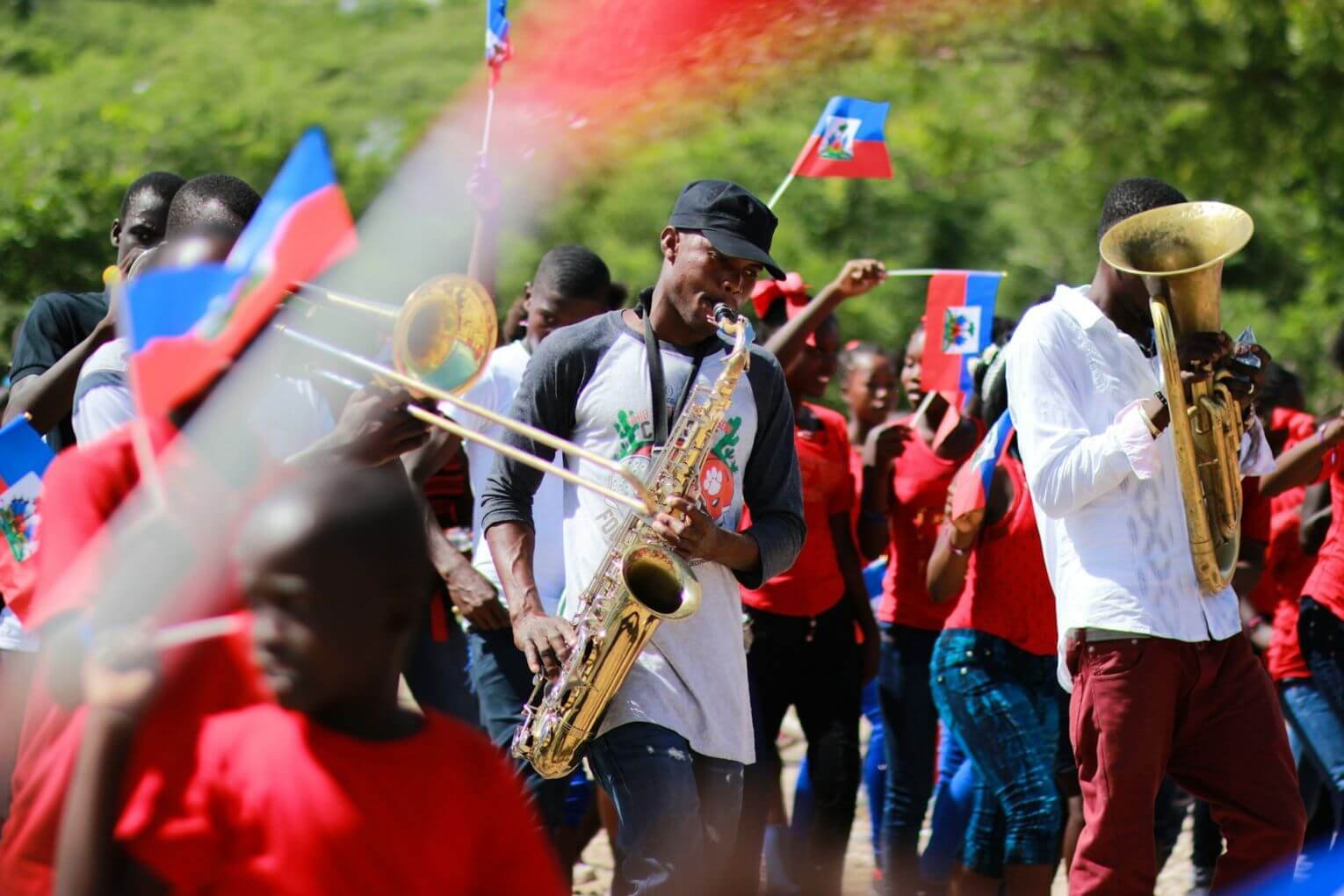
Hey, I’m Mara.
I am the founder and blogger of Sololingual helping anyone at any age, from any place, who wants to learn a new language. You can learn how to reach fluency in your chosen language fast, fun and easily studying a short amount each day and spending very little money using different language learning techniques, programs and resources at your disposal. Fluency isn't difficult to achieve. In fact, it’s easy when you find a solid method that walks you through every step of the way, and believing in yourself so that you can achieve your goal at becoming fluent in any language.
More About My Story >>

Search This Site:


The Ultimate Guide To Learning Colors In Spanish
The ultimate guide: 100+ useful spanish phrases for travel that you need to know.
30+ common Italian phrases for your trip to Italy
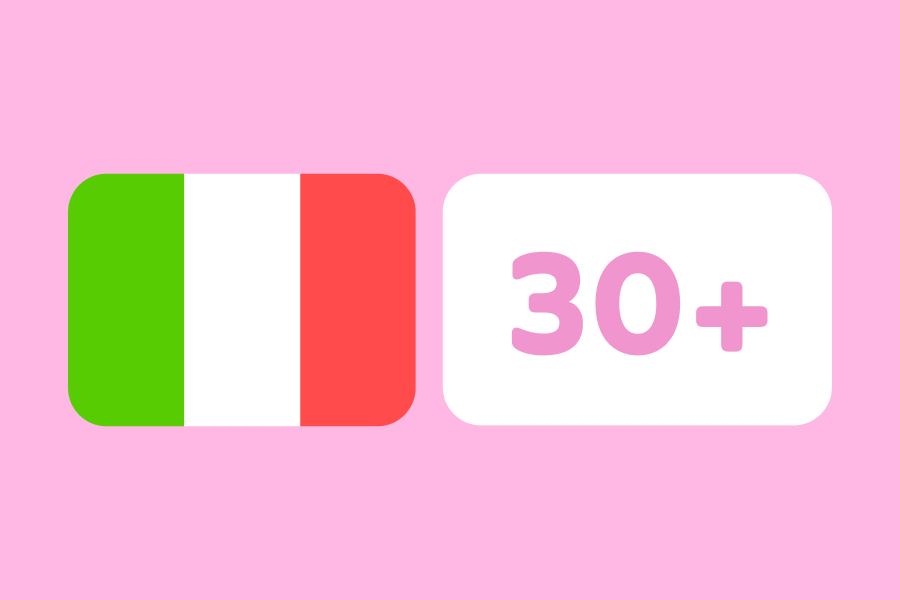
There's no better way to level up your trip to Italy than by practicing your Italian! Learning a few key phrases will help you feel more confident ordering in an Italian gelateria (gelato shop) and chatting with locals over an espresso and colazione (breakfast).
Here are the most important phrases you'll need in Italy!

Italian 101
You don't have to be fluent to have fun with Italian. You're on vacation, so don't stress! Enjoy using the Italian you know and see what else you learn along the way. (And you might be pleasantly surprised that even beginners can have real conversations !)
It's the effort that counts. Using some Italian shows locals that you're interested in their culture and community .
Study smart, not hard. Focus on the most useful Italian words and phrases , and worry less about getting every grammar detail right. A few key words go a long way!
Asking for help
Getting around town, ordering food.

Local language
Buon giorno! It's considered polite to greet people with "good morning" or "good afternoon" when you enter stores, cafés, or souvenir shops.
Che figata! This phrase means "How cool!" or "That's awesome!" and is used for cool situations and events. For people and objects that you find cool, say Che figo!
The beginning of your journey with Italian 🇮🇹
These basics will get you far in Italy, but there's a lot more Italian where that came from. To make real connections during your trip, let Duolingo be your guide! Our bite-sized lessons make it easy to fit study time into your busy schedule, and our entire Italian course is free—so you can save your euros for souvenirs.
Related Posts All Posts
Dear duolingo: why are the words for 11 and 12 weird in so many languages, 8 phrases for your trip to japan.
- Search Please fill out this field.
- Manage Your Subscription
- Give a Gift Subscription
- Newsletters
- Sweepstakes
- Destinations
Basic Italian Words and Phrases for Your Trip to Italy
Andiamo! Learn Italian while dreaming about your next trip to Italy.
Nina Ruggiero is Travel + Leisure's senior editorial director and the co-founder of Be A Travel Writer , an online course for aspiring travel journalists. A New Yorker based in Los Angeles, she has a special interest in beach destinations, outdoor adventures, unique hotels, pet-friendly travel with her golden retriever, @travelswithcali, and all things Italy.
:max_bytes(150000):strip_icc():format(webp)/nina-ruggiero-bio-2000-0708c3762bb44df2951ea309e69217c7.jpg)
As a traveler with Italian roots, I'm admittedly a little biased — but there is something special about the Italian language. Whether it's a casual conversation, a heated argument, or an artfully composed aria, everything just sounds better in Italian.
That being said, it can be daunting to blurt out a butchered Italian phrase when the locals around you are stringing gorgeous words together as effortlessly as a pastaio folds up perfect tortellini or a gondoliere glides through a Venice canal.
But if you're traveling to Italy , you really should try to learn a few common Italian phrases and words before you go. While you'll find plenty of English speakers in any of Italy's major cities, most Italians will appreciate you trying their language; you may even be surprised how many new friends it makes you as you mingle at aperitivo or linger in a bustling piazza .
OK, pronto ? Ready? Here are a few basic Italian words and phrases to get you started. (All phrases are formal unless noted.)
Basic Italian Words
Hello: Ciao (informal); Salve (formal)
Goodbye: Ciao (informal); Arrivederci (formal)
Good morning: Buongiorno
Good evening: Buonasera
Goodnight: Buonanotte (use this when you're going to bed)
Please: Per favore; per piacere
Thank you: Grazie
Thanks so much: Grazie mille
You're welcome: Prego; Di niente
Beautiful: Bello (masculine); Bella (feminine)
Good: Buono (masculine); Buona (feminine)
Friend: Amico (masculine); Amica (feminine)
Family: Famiglia
What?: Che?; Cosa?
Where?: Dove?
When?: Quando?
Why?: Perché?
How much?: Quanto?
Related : The Best Language Learning Apps to Download Before Your Next Trip
Common Italian Phrases
I love you: Ti amo (romantic); Ti voglio bene (family, friends)
How are you?: Come sta?
How's it going?: Come va?
I miss you: Mi manchi
I don't know: Non lo so
All's well: Tutto bene
I'm sorry: Mi dispiace
What is your name?: Come si chiama?
My name is…: Mi chiamo...
OK: Va bene
Excuse me: Mi scusi
Excuse me (passing through a crowd): Permesso
Basic Italian Travel Words and Phrases
I would like... (ordering food or buying a ticket): Vorrei...
Check, please: Il conto, per favore
Where is...?: Dov'è...?
Tourist: Turista
Airport: Aeroporto
Airplane: Aereo
Luggage: Bagagli
Suitcase: Valigia
Train: Treno
Ticket: Bigletto
Rental car: Auto a noleggio
Bathroom: Bagno
Restaurant: Ristorante
Museum: Museo
Church/Cathedral: Chiesa/Duomo
Beach: Spiaggia
Store: Negozio
Italian Slang Words
Dope!: Che figata!
Of course!: Avoglia!
A lot: Un botto
See you later: Ci becchiamo dopo
What the heck: Che cavolo
Chill!: Scialla!
Related Articles
You are using an outdated browser. Please upgrade your browser or activate Google Chrome Frame to improve your experience.
170+ Key Italian Travel Phrases
About to go on that Italian trip of a lifetime? Don’t forget to take some key Italian travel phrases with you before you set off on your adventure!
Even if you haven’t planned a trip to Italy, these travel phrases will be useful for any Italian learner looking to add more words and phrases to their vocabulary!
This post will show you more than 170 of the most common Italian travel phrases, words and questions to help you prepare for any situation you might find yourself in while traveling.
1. Essential Italian Phrases
2. italian greetings and goodbyes , 3. making small talk in italian, 4. asking for directions in italian, 5. italian question words, 6. italian words for shopping, 7. italian phrases for eating out, 8. italian words for emergency situations, 9. numbers, time and days of the week in italian, 10. transport words and phrases in italian, tips for learning italian phrases, and one more thing....
Download: This blog post is available as a convenient and portable PDF that you can take anywhere. Click here to get a copy. (Download)
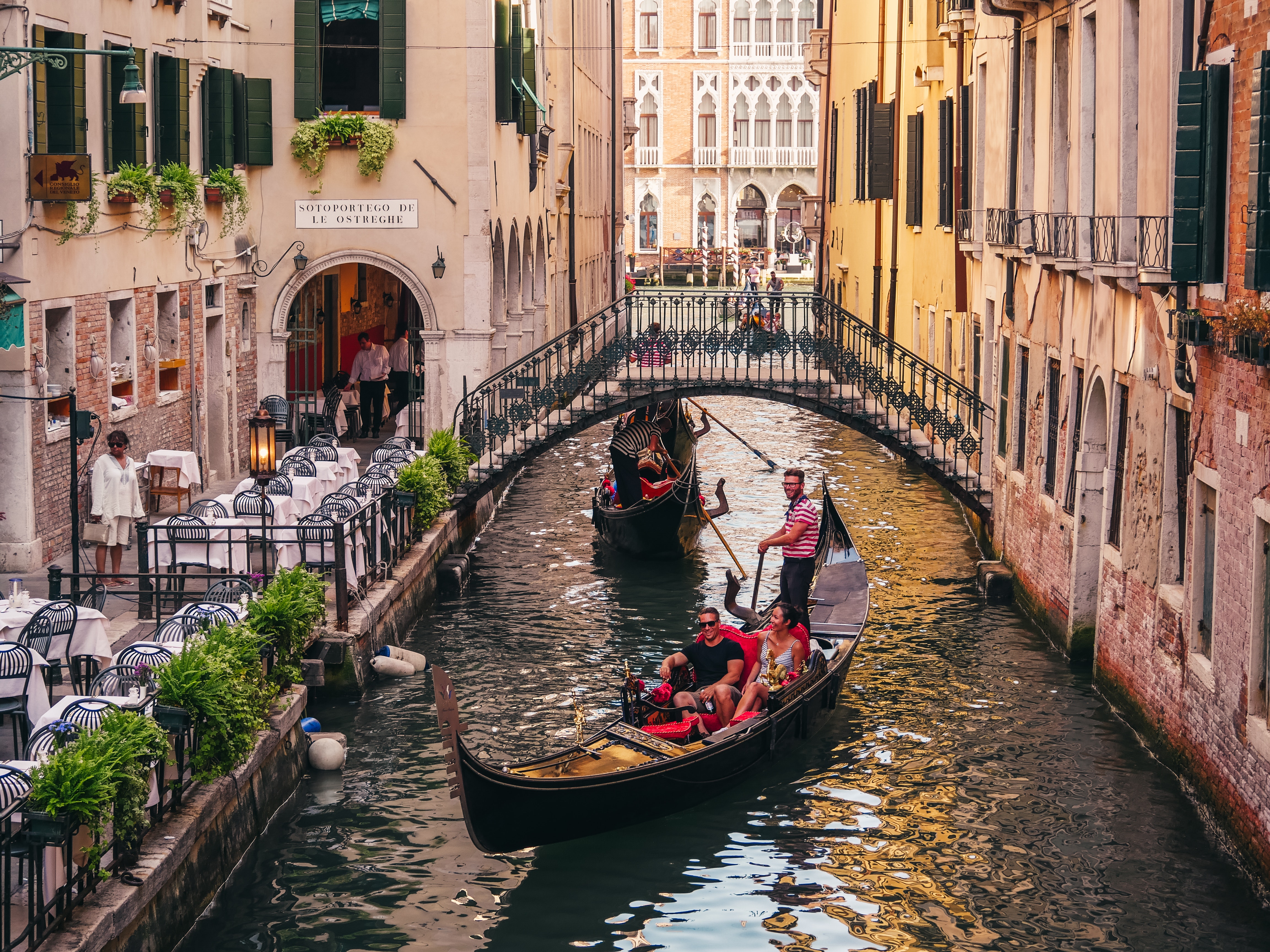
There are some basic words every Italian learner should learn as soon as possible. Here are some Italian essentials to remember!

It’s always polite to say hello and goodbye, no matter where in the world you are!
Remember these useful ways to say everything from “hi there” to “see you later!”
With these phrases you’ll be able to greet and converse with any Italian you may meet!
Check out this video to see 10 essential phrases used by Italians everyday.

It’s always good to have some small talk phrases under your belt. Here are some phrases that’ll help you carry on a simple, casual conversation when you meet someone new.
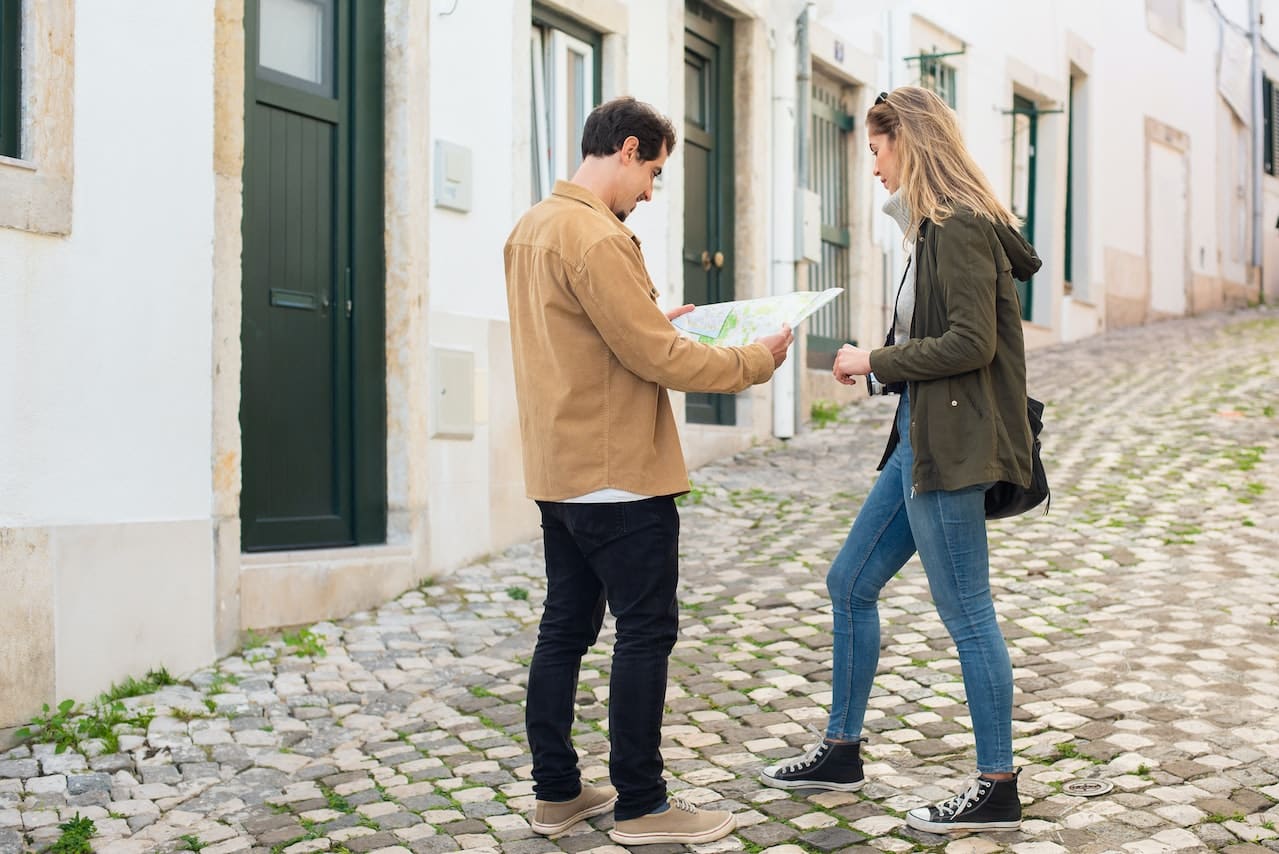
No matter how long you prepare for your trip— sooner or later, you’ll find yourself asking for directions.
Asking for directions starts with you approaching the other person with a “ Mi scusi ,” asking your question, then hearing the directions to your destination.
Here are some phrases that could help you navigate this conversation:

Some of the most important sentences you will hear are those that ask a question. Here are Italian question words that prefix Italian queries:
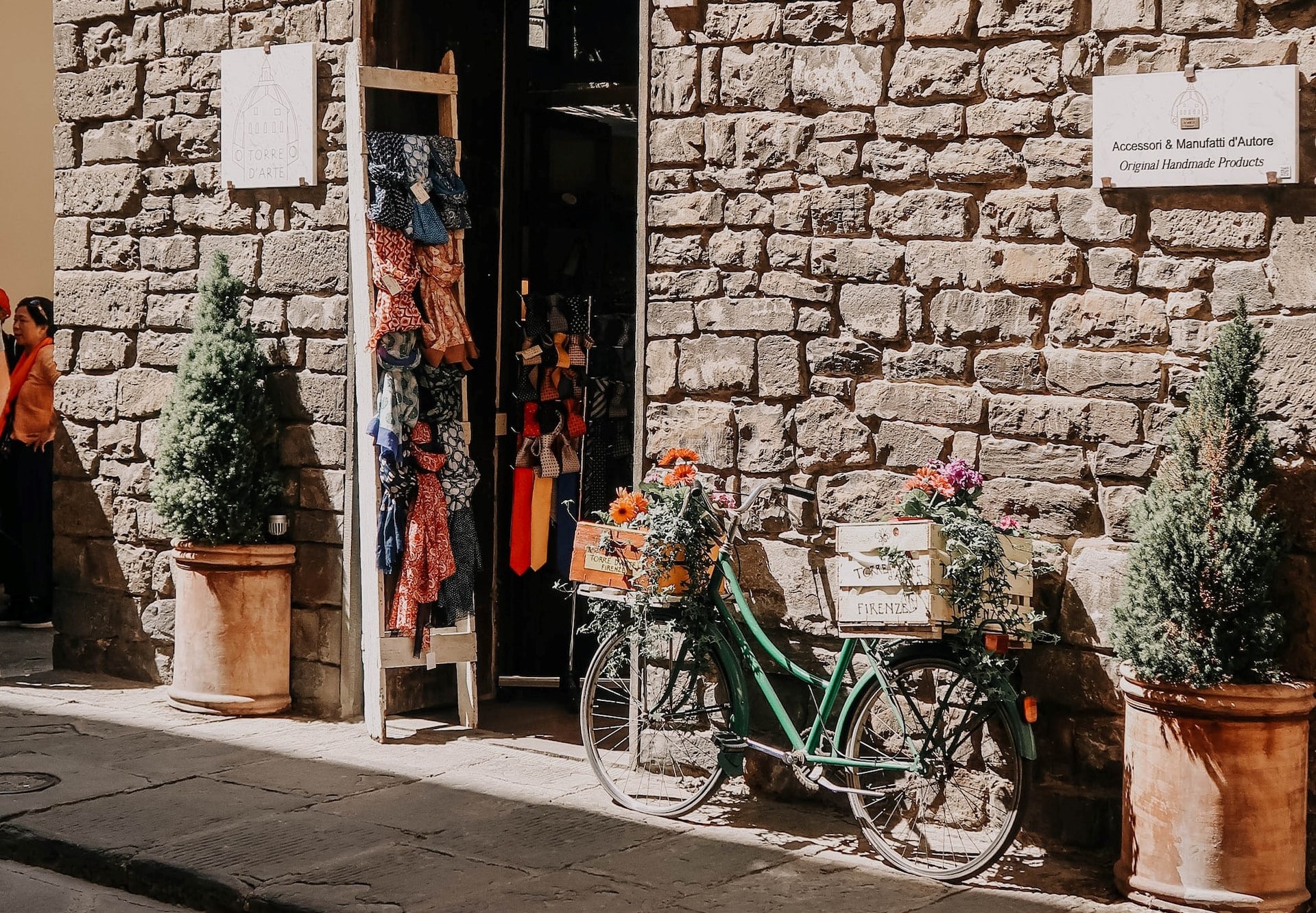
Chances are that if you visit Italy, you’ll probably be doing some shopping. Here are some terms to know so you can get by:

Italy is a land of good food and wine, so here are some words and phrases to help you have the best dining experience possible.
To learn more essential restaurant phrases and see them used in context by a native Italian speaker with Italian and English subtitles, check out this video.
By seeing these phrases used in context, you’ll quickly pick up on when and how to use them in your own conversations.

Vacations can be unpredictable, so it’s good to know how to ask for help and communicate that there’s an emergency:

If you’re learning Italian or planning on visiting Italy, then these words will be essential!
*The only time in Italian that uses the singular “è…” is one o’clock. For example: “È l’una” (It’s one o’clock) but all the other times use the plural form “Sono le…” in Italian. Check out this post for a more in-depth guide to telling the time in Italian.
As you can see, knowing how to count and say numbers in Italian is useful for many different situations. To learn more numbers in Italian, you can read about them in this post .
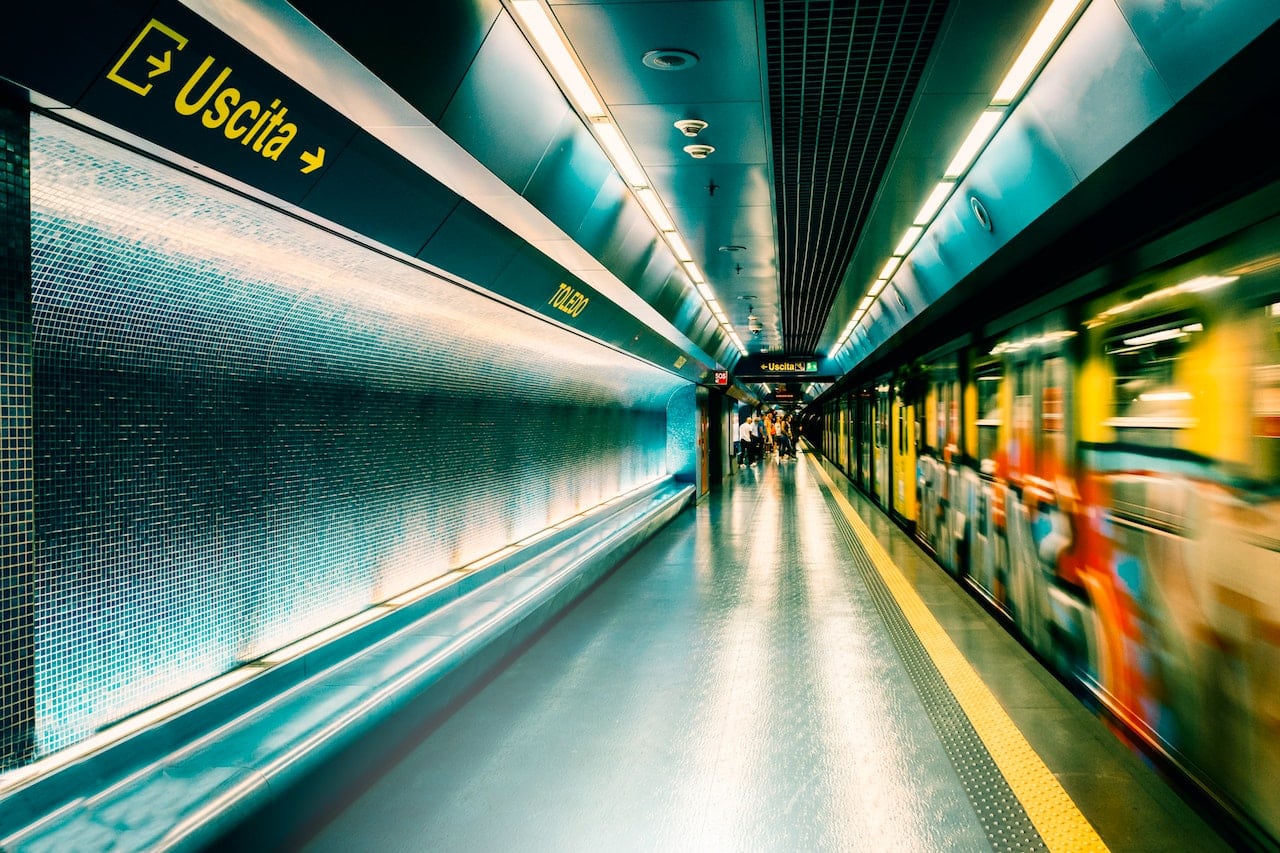
If you’re traveling in Italy, it’s likely you’ll have to travel in il taxi or il treno at least once!
Take a look at these phrases below to learn different ways of traveling and how to buy and book a ticket in Italian.
Now that you know these phrases for transport in Italian, you’re ready to travel!
But before you go, make sure you watch this video for travel tips for your trip to Italy.
1. Read them out loud.
The best way to master basic Italian phrases is by practicing them in actual conversation with others; however, you may not have access to an Italian speaking partner.
If this is the case, you can still get a bit of practice in saying these phrases by simply reading them out loud. Hearing yourself say these phrases is an essential step to learning them.
2. Role-play them in different contexts.
In addition to saying the same words or phrases in different ways, you can role-play them in different contexts.
Try to write out a sample dialogue of a situation that would actually use some of these phrases. Then, you can read them aloud and practice being on both sides of the conversation.
Going through this process helps you remember them more and playing both sides doubles your practice time.
3. Immerse yourself in Italian media
The more exposure to Italian you get, the quicker you’ll pick up on the language.
Try watching Italian movies, listening to Italian music or reading Italian books. All of these are sure to contain the phrases from these posts and much more.
You can also try using FluentU to learn Italian phrases and vocabulary in context.
FluentU takes authentic videos—like music videos, movie trailers, news and inspiring talks—and turns them into personalized language learning lessons.
You can try FluentU for free for 2 weeks. Check out the website or download the iOS app or Android app.
P.S. Click here to take advantage of our current sale! (Expires at the end of this month.)

Try FluentU for FREE!
4. Practice with a native speaker.
Having a language exchange partner will give you the opportunity to practice the basic Italian phrases that you know and receive feedback on how you’re doing from a native speaker.
If you don’t know any native speakers personally, you can quickly find a conversation partner online on a site like Easy Language Exchange , HelloTalk or Tandem .
5. Use them in your everyday conversations.
Try to find as many opportunities as possible to use basic Italian phrases in your daily routines.
A great way to practice without having to find a language partner is by thinking or narrating what you’re doing in Italian.
6. Use flashcards.
If you’re having difficulty memorizing Italian words, phrases and expressions, invest the time in making flashcards.
This classic method really does work and you can choose to do it the old-fashioned way by making your cards by hand or there are several apps available to make them with your phone such as those listed in this post .
Now you have everything you need to navigate basic situations in Italian!
Buon viaggio! (Safe journey!)
If you're as busy as most of us, you don't always have time for lengthy language lessons. The solution? FluentU !
Learn Italian with funny commericals, documentary excerpts and web series, as you can see here:
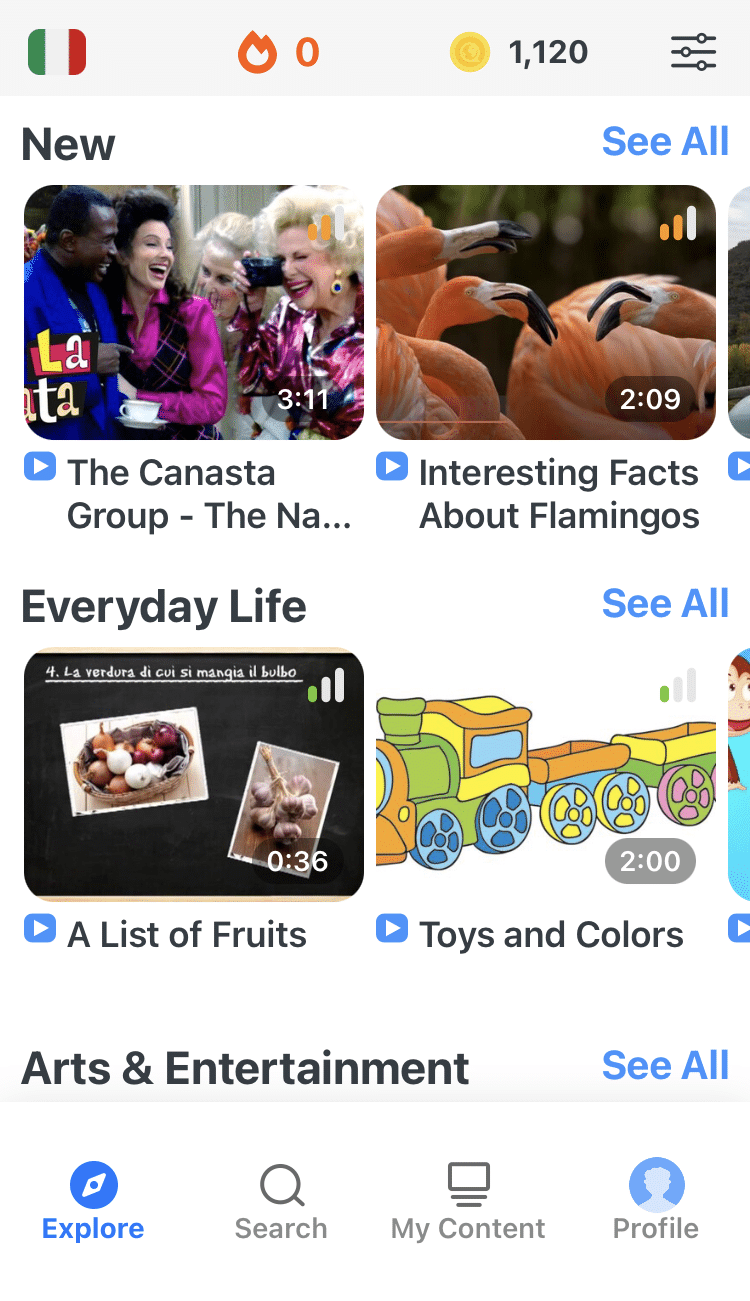
FluentU helps you get comfortable with everyday Italian by combining all the benefits of complete immersion and native-level conversations with interactive subtitles . Tap on any word to instantly see an image, in-context definition, example sentences and other videos in which the word is used.
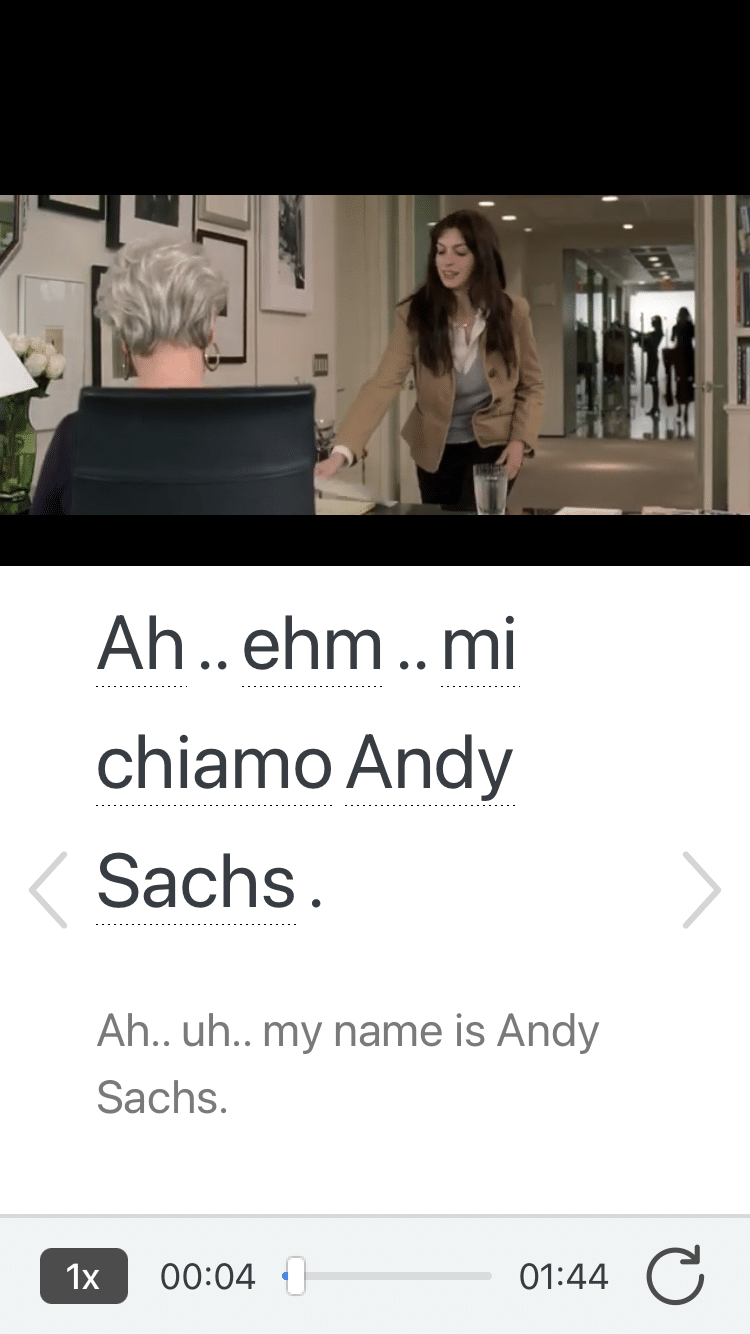
Access a complete interactive transcript of every video under the Dialogue tab, and review words and phrases with convenient audio clips under Vocab .
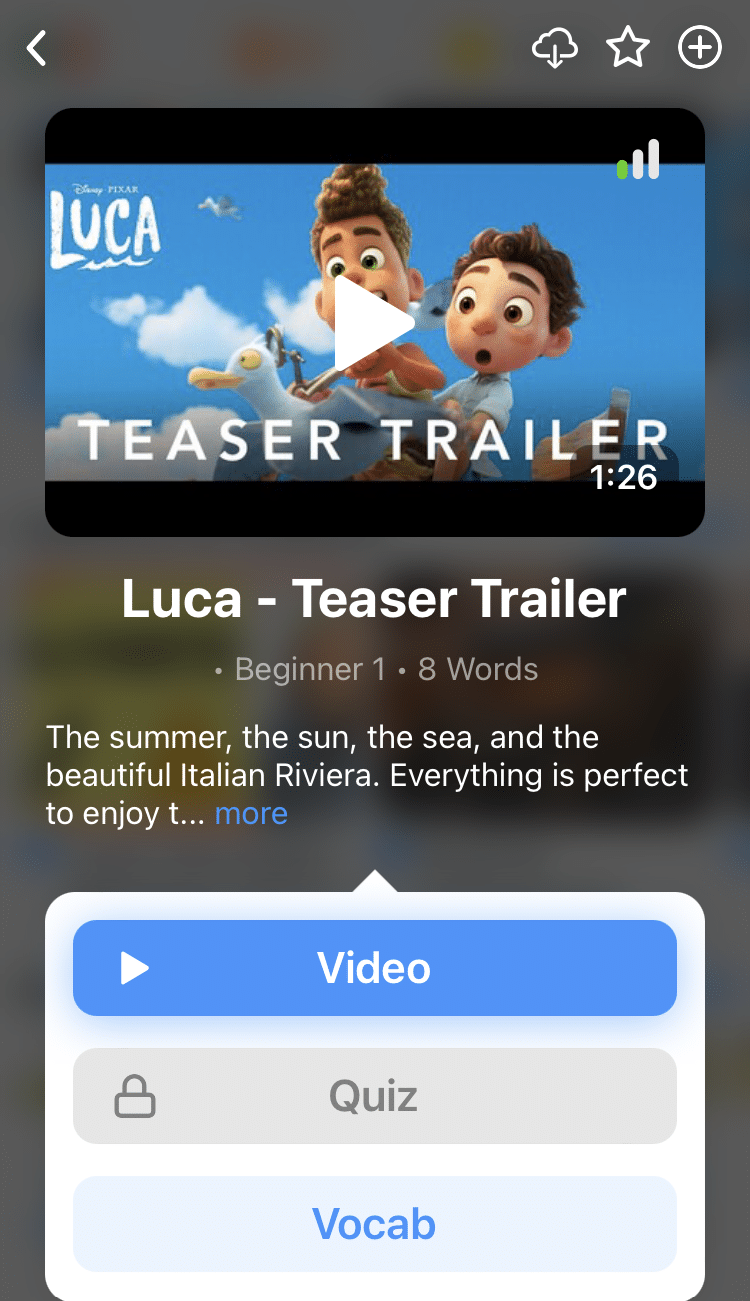
Once you've watched a video, you can use FluentU's quizzes to actively practice all the vocabulary in that video. Swipe left or right to see more examples of the word you’re on.
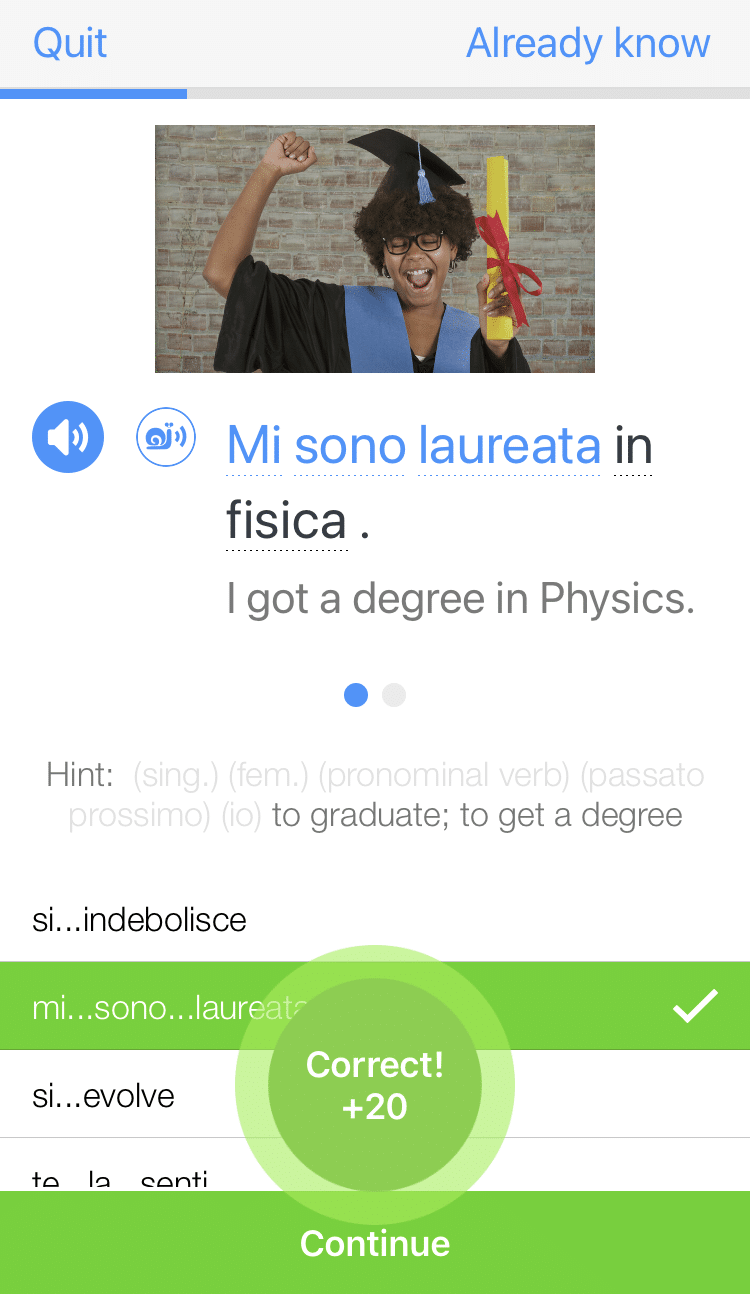
FluentU will even keep track of all the Italian words you’re learning, and give you extra practice with difficult words. Plus, it'll tell you exactly when it's time for review. Now that's a 100% personalized experience !
The best part? You can try FluentU for free with a trial.
Start using the FluentU website on your computer or tablet or, better yet, download the FluentU app from the iTunes or Google Play store. Click here to take advantage of our current sale! (Expires at the end of this month.)
Enter your e-mail address to get your free PDF!
We hate SPAM and promise to keep your email address safe

- Skip to primary navigation
- Skip to main content
- Skip to primary sidebar
- Skip to footer
StoryLearning
Learn A Language Through Stories
94 Italian Travel Phrases Every Intrepid Adventurer Needs To Know
What better excuse to learn Italian or brush up on your Italian skills than a trip to Italy.
Italy is one of the world’s most popular travel destinations. Travellers flock there for the delicious food, beautiful sights, and rich culture.
But, when you only have limited time before your trip and you want to learn some Italian language basics, it can be hard to know where to begin.
- How do you know which phrases will be the most useful?
- What’s important and what can you skip over?
Luckily, I’ve created this handy guide to teach you essential Italian travel phrases you'll need to make the most of your trip . These phrases serve as a great crash course for basic communication in Italian. You can look it over at your leisure in the weeks leading up to your trip, or even blast through it on your plane ride.
Either way, when you get to Italy, you’ll be equipped with enough basic phrases to make ordering in restaurants, asking for directions, and befriending locals a breeze.
I’ve broken the guide down into a few sections to make your study-sesh even easier:
- Introductions
- Transportation
- Restaurants
- Emergencies
If you spend some time studying this guide, it’ll be easy to ask for what you need in any situation (and to make new Italian friends)! And a lot faster than trying to learn Italian from scratch .
By the way, if you want to learn Italian in time for your trip my top recommendation for language learners is my Uncovered courses, which teach you through StoryLearning®. Click here to find out more and try out the method for free.
Part 1: Travel Phrases To Connect With Italians
Mastering basic Italian greetings is the first step in learning to communicate in Italian. Think about how much a simple “hello” can be appreciated in your daily life. The same is true when you travel.
Italy is also home to kind and welcoming locals. Many Italians are enthusiastic about meeting and befriending travellers and showing them all that their country has to offer.
You'll find that people often greet you in passing or at the beginning of a conversation. Knowing the right way to respond is a great way to show them you’re making an effort to understand their language!
- #1 Ciao! – Hello/Goodbye (informal)
- #2 Salve! – Hello/Goodbye (very formal, you probably won’t hear this one very often)
- #3 Buon giorno! – Good morning! or Good day!
- #4 Buona sera! – Good evening!
- #5 Buona notte! – Good night!
- #6 Arrivederci! – Goodbye!
For these greetings, you would respond by saying the same word back to the person.
Learn More About Your Conversation Partner Or Get Clarification
Next, let’s take a look at how you would continue on to ask someone how they are doing and learn a little bit about them.
- #7 Come stai? – How are you? (formal)
- #8 Come va? – How are you? (informal)
- #9 Molto bene, grazie – Very well, thank you
- #10 Non sto bene/ Sto male – I’m not well
- #11 Come ti chiami? – What is your name?
- #12 Mi chiamo… — My name is…
- #13 Piacere – Nice to meet you (Literal translation: “pleasure”)
If you’re struggling to remember the phrases you want to use, or if you want to discuss something you don’t know the vocabulary for, you can ask if the person you are talking to speaks English.
- #14 Lei parla inglese? – Do you speak English?
- #15 Non capisco – I do not understand
Part 2: Italian Travel Phrases For Asking Directions
Half of the fun of traveling is exploring, and we all know that sometimes that means we have to ask for directions.
Whether you’re trying to find the train station or trying to get back to your hotel, you’re probably going to ask someone for directions at some point in your trip.
- #16 Dov’è… — Where is…
- #17 Mi sono perso – I’m lost
- #18 Il bagno – the bathroom
- #19 La stazione ferroviaria – the train station
- #20 L’ufficio postale – post office
- #21 Il mercato – the market
- #22 La farmacia – the pharmacy
- #23 L’ospedale – the hospital
And, of course, the next step is understanding what they say in response.
- #24 Gira a destra – Turn right
- #25 Gira a sinistra – Turn left
- #26 È qua vicino – It’s close by
- #27 Davanti – across from
- #28 Dietro – behind
- #29 Sotto – under
- #30 Prima – before
- #31 Dopo – past
If you're having trouble understanding or the person is talking too fast, it can help to hold out a map and have them point to what they are talking about as they explain.
And don’t forget to say thank you after someone gives you directions!
- #32 Grazie mille! – Thanks a lot!
- #33 Prego – You’re welcome
Part 3: Travel Phrases To Help You Get Around Italy
Once you know where you’re going, you have to figure out how you’re getting there. The next batch of words will help you converse about transportation.
Let’s start with some words and phrases you might need to use at the train station or the airport.
- #34 L’aeroporto – the airport
- #35 Il biglietto – the ticket
- #36 L’orario – the timetable
- #37 La partenza – departure
- #38 Il treno – the train
- #39 Il volo – the flight
- #40 Il bagaglio – the baggage
- #41 L’ufficio informazioni – the information office
- #42 Quando arriva lì? – When does it arrive there?
- #43 Quanto dura il viaggio? – How long does it take to get there?
When you’re travelling within a city, it’s more likely that you’ll be going on foot, by bus, or in a taxi. Next, let’s look at some words and phrases relating to those types of travel.
- #44 Fermata dell’autobus – bus stop
- #45 Mi serve un taxi – I need a taxi
- #46 Quanto costa la corsa? – How much is the fare?
- #47 Mi piacerebbe andare a… — I would like to go to…
Part 4: Italian Travel Phrases To Help You Taste Italy
For most travellers, one of the highlights of any trip to Italy is eating as much food as possible. In a nation known across the globe for its cuisine, you need to know how to order what you want to eat.
Did you know that there are lots of different types of restaurants in Italy? And they all have different names.
That's why deciding where to eat in Italy isn’t quite as simple as looking for a sign that says ristorante . You have to know what you’re looking for to find a place that will suit your mood and cravings!
- #48 Osteria – a moderately priced restaurant with a short menu of simple foods like pasta, grilled meat, and wine
- #49 Trattoria – a step up from the osteria , typically family-run, typically specialising in rustic home-cooked foods
- #50 Ristorante – a higher-end full-service dining establishment
- #51 Bar – shop selling coffee, beer, wine, and liquor, and occasionally grab-and-go food
- #52 Pasticceria – bakery
- #53 Paninoteca – sandwich shop
- #54 Enoteca – wine bar, sometimes also serving small plates
Understanding The Menu In Italian
Once you settle on a restaurant and take a look at the menu, you might be overwhelmed by your options. Most restaurants in areas that attract lots of tourists will have an English version of the menu.
But, some of the best food in Italy is off the beaten path, so it’s best to know some basics in case you venture into a restaurant that only offers its menu in Italian.
- #55 Pomodoro – tomato
- #56 Aglio – garlic
- #57 Sale – salt
- #58 Pepe – pepper
- #59 Insalata – salad
- #60 Cioccolato – chocolate
- #61 Pane – bread
- #62 Pollo – chicken
- #63 Bistecca – steak
- #64 Vitello – veal
- #65 Carne – meat
- #66 Pesce – fish
- #67 Carciofo – artichoke
- #68 Zucca — pumpkin
- #69 Porro – leek
- #70 Piselli – peas
- #71 Mela –apple
- #72 Fragola – strawberry
- #73 Arancia – orange
- #74 Pesca – peach
- #75 Vino – wine
- #76 Acqua – water
- #77 Succo – juice
How To Place Your Order In Italian
When you know what you want to order, you can always just point to it on the menu. But it's much politer to brush up on the proper way to order your food in Italian!
Your waiter will surely appreciate the effort and you might even strike up an interesting conversation and make a new friend.
- #78 Vorrei… — May I have…
- #79 La salsa è piccante? – Is the sauce spicy?
- #80 Possiamo avere il conto? – Can we have the check?
- #81 Per favore – Please
- #82 Sono allergico a… — I am allergic to…
- #83 Buon appetito – Enjoy your food!
Part 5: Italian Travel Expressions For Emergencies
Last but not least, I'll leave you with a chapter that I hope you won’t need to use.
When travelling, you need to be prepared. These are phrases that you can keep in your back pocket to use in case of an emergency. You can rest easy in your travels knowing that you're prepared for the worst-case scenario.
- #84 Aiutatemi! – Help me!
- #85 Chiami… — Call…
- #86 Polizia – police
- #87 Ambulanza – ambulance
- #88 Pompieri – fire brigade
- #89 Ho bisogno di un dottore – I need a doctor
- #90 Mi fa male qui – I have pain here. (You can point to the place that hurts)
- #91 C’è un incendio – There’s a fire
- #92 Attento – Watch out
- #93 Al ladro! – Stop, thief!
- #94 Vai via! – Go away!
Now You’re Ready For An Adventure In Italy
When you picture your next trip abroad, do you find your mind drifting to images of a Tuscan hillside or a bustling restaurant in Rome? Do you yearn for delicious pasta, pizza, and gelato? Do you dream of Florence’s museums or Venice’s canals?
Well, you're ready to turn those daydreams into a reality. Once you’ve mastered these words and phrases, you’re all set for an awesome adventure in Italy.
You’ll feel comfortable introducing yourself to people and asking them how they’re doing, asking for directions, getting around, and ordering a delicious meal in the perfect restaurant. Plus, you’re prepared in case of an emergency.
I hope you enjoy your time in Italy – and who knows? Maybe you’ll love it so much that you’ll decide you want to become fluent in Italian!
How To get Fluent In Italian, The Natural Way
You'll get so much more out of a trip to Italy if you know some basic Italian. And even more if you can have conversations with the locals.
You'll discover hidden sights off the tourist trail, make friends and remember your trip for the rest of the life. But how do you get conversational in Italian in time for heading off to Italy?
Well, you can use the StoryLearning® method – I used it to get fluent in Italian in 3 months , without touching a textbook or memorising grammar rules.
I've put it together into my course, Italian Uncovered , which takes you from beginner to intermediate level in Italian through the power of story.
So if you'd like to get fluent in Italian using the same methods as me in time for your trip, click here.
Language Courses
- Language Blog
- Testimonials
- Meet Our Team
- Media & Press
Our website uses cookies to provide you the best experience. By continuing to use our website, you agree to our use of cookies. For more information, read our Cookie Policy .
Download Your Free StoryLearning® Kit!
Discover the world famous story-based method that 1,023,037 people have used to learn a language quickly…, not interested.
What can we do better ? If I could make something to help you right now, w hat would it be?
Which language are you learning?
What is your current level in [language]?
Perfect! You’ve now got access to my most effective [level] [language] tips…
Where shall I send them?
We will protect your data in accordance with our data policy.
Download this article as a FREE PDF ?
What is your current level in Swedish?
Perfect! You’ve now got access to my most effective [level] Swedish tips…
Where shall I send the tips and your PDF?
What is your current level in Danish?
Perfect! You’ve now got access to my most effective [level] Danish tips…
What can we do better? If I could make something to help you right now, w hat would it be?
What is your current level in [language] ?
Perfect! You’ve now got access to my most effective [level] [language] tips, PLUS your free StoryLearning Kit…
Download this article as a FREE PDF?
Great! Where shall I send my best online teaching tips and your PDF?
Download this article as a FREE PDF ?
What is your current level in Arabic?
Perfect! You’ve now got access to my most effective [level] Arabic tips…
FREE StoryLearning Kit!
Join my email newsletter and get FREE access to your StoryLearning Kit — discover how to learn languages through the power of story!
Download a FREE Story in Japanese!
Enter your email address below to get a FREE short story in Japanese and start learning Japanese quickly and naturally with my StoryLearning® method!
What is your current level in Japanese?
Perfect! You’ve now got access to the Japanese StoryLearning® Pack …
Where shall I send your download link?
Download Your FREE Natural Japanese Grammar Pack
Enter your email address below to get free access to my Natural Japanese Grammar Pack and learn to internalise Japanese grammar quickly and naturally through stories.
Perfect! You’ve now got access to the Natural Japanese Grammar Pack …
What is your current level in Portuguese?
Perfect! You’ve now got access to the Natural Portuguese Grammar Pack …
What is your current level in German?
Perfect! You’ve now got access to the Natural German Grammar Pack …
Train as an Online Language Teacher and Earn from Home
The next cohort of my Certificate of Online Language Teaching will open soon. Join the waiting list, and we’ll notify you as soon as enrolment is open!
Perfect! You’ve now got access to my most effective [level] Portuguese tips…
What is your current level in Turkish?
Perfect! You’ve now got access to my most effective [level] Turkish tips…
What is your current level in French?
Perfect! You’ve now got access to the French Vocab Power Pack …
What is your current level in Italian?
Perfect! You’ve now got access to the Italian Vocab Power Pack …
Perfect! You’ve now got access to the German Vocab Power Pack …
Perfect! You’ve now got access to the Japanese Vocab Power Pack …
Download Your FREE Japanese Vocab Power Pack
Enter your email address below to get free access to my Japanese Vocab Power Pack and learn essential Japanese words and phrases quickly and naturally. (ALL levels!)
Download Your FREE German Vocab Power Pack

Enter your email address below to get free access to my German Vocab Power Pack and learn essential German words and phrases quickly and naturally. (ALL levels!)
Download Your FREE Italian Vocab Power Pack
Enter your email address below to get free access to my Italian Vocab Power Pack and learn essential Italian words and phrases quickly and naturally. (ALL levels!)
Download Your FREE French Vocab Power Pack
Enter your email address below to get free access to my French Vocab Power Pack and learn essential French words and phrases quickly and naturally. (ALL levels!)
Perfect! You’ve now got access to the Portuguese StoryLearning® Pack …
What is your current level in Russian?
Perfect! You’ve now got access to the Natural Russian Grammar Pack …
Perfect! You’ve now got access to the Russian StoryLearning® Pack …
Perfect! You’ve now got access to the Italian StoryLearning® Pack …
Perfect! You’ve now got access to the Natural Italian Grammar Pack …
Perfect! You’ve now got access to the French StoryLearning® Pack …
Perfect! You’ve now got access to the Natural French Grammar Pack …
What is your current level in Spanish?
Perfect! You’ve now got access to the Spanish Vocab Power Pack …
Perfect! You’ve now got access to the Natural Spanish Grammar Pack …
Perfect! You’ve now got access to the Spanish StoryLearning® Pack …
Where shall I send them?
What is your current level in Korean?
Perfect! You’ve now got access to my most effective [level] Korean tips…
Perfect! You’ve now got access to my most effective [level] Russian tips…
Perfect! You’ve now got access to my most effective [level] Japanese tips…
What is your current level in Chinese?
Perfect! You’ve now got access to my most effective [level] Chinese tips…
Perfect! You’ve now got access to my most effective [level] Spanish tips…
Perfect! You’ve now got access to my most effective [level] Italian tips…
Perfect! You’ve now got access to my most effective [level] French tips…
Perfect! You’ve now got access to my most effective [level] German tips…
Download Your FREE Natural Portuguese Grammar Pack
Enter your email address below to get free access to my Natural Portuguese Grammar Pack and learn to internalise Portuguese grammar quickly and naturally through stories.
Download Your FREE Natural Russian Grammar Pack
Enter your email address below to get free access to my Natural Russian Grammar Pack and learn to internalise Russian grammar quickly and naturally through stories.
Download Your FREE Natural German Grammar Pack
Enter your email address below to get free access to my Natural German Grammar Pack and learn to internalise German grammar quickly and naturally through stories.
Download Your FREE Natural French Grammar Pack
Enter your email address below to get free access to my Natural French Grammar Pack and learn to internalise French grammar quickly and naturally through stories.
Download Your FREE Natural Italian Grammar Pack
Enter your email address below to get free access to my Natural Italian Grammar Pack and learn to internalise Italian grammar quickly and naturally through stories.
Download a FREE Story in Portuguese!

Enter your email address below to get a FREE short story in Brazilian Portuguese and start learning Portuguese quickly and naturally with my StoryLearning® method!
Download a FREE Story in Russian!
Enter your email address below to get a FREE short story in Russian and start learning Russian quickly and naturally with my StoryLearning® method!
Download a FREE Story in German!
Enter your email address below to get a FREE short story in German and start learning German quickly and naturally with my StoryLearning® method!
Perfect! You’ve now got access to the German StoryLearning® Pack …
Download a FREE Story in Italian!
Enter your email address below to get a FREE short story in Italian and start learning Italian quickly and naturally with my StoryLearning® method!
Download a FREE Story in French!

Enter your email address below to get a FREE short story in French and start learning French quickly and naturally with my StoryLearning® method!
Download a FREE Story in Spanish!
Enter your email address below to get a FREE short story in Spanish and start learning Spanish quickly and naturally with my StoryLearning® method!
FREE Download:
The rules of language learning.

Enter your email address below to get free access to my Rules of Language Learning and discover 25 “rules” to learn a new language quickly and naturally through stories.
Download Your FREE Spanish Vocab Power Pack

Enter your email address below to get free access to my Spanish Vocab Power Pack and learn essential Spanish words and phrases quickly and naturally. (ALL levels!)
Download Your FREE Natural Spanish Grammar Pack
Enter your email address below to get free access to my Natural Spanish Grammar Pack and learn to internalise Spanish grammar quickly and naturally through stories.
Free Step-By-Step Guide:
How to generate a full-time income from home with your English… even with ZERO previous teaching experience.
What is your current level in Thai?
Perfect! You’ve now got access to my most effective [level] Thai tips…
What is your current level in Cantonese?
Perfect! You’ve now got access to my most effective [level] Cantonese tips…
Steal My Method?
I’ve written some simple emails explaining the techniques I’ve used to learn 8 languages…
I want to be skipped!
I’m the lead capture, man!
Join 84,574 other language learners getting StoryLearning tips by email…
“After I started to use your ideas, I learn better, for longer, with more passion. Thanks for the life-change!” – Dallas Nesbit
Perfect! You’ve now got access to my most effective [level] [language] tips…
Perfect! You’ve now got access to my most effective [level] [language] tips…
Find The Perfect Language Course For You!
Looking for world-class training material to help you make a breakthrough in your language learning?
Click ‘start now’ and complete this short survey to find the perfect course for you!
Do you like the idea of learning through story?
Do you want…?

Visiting Italy? Must-Learn Italian Phrases For Travel
In this article, we’ll pretend we are traveling together so that I can help you speak in Italian in every common situation you might encounter during your Italy travels. For each situation, I will provide a list of useful Italian phrases to memorize or jot down somewhere.
For easy accessibility, you have the graphic with the summary of the basic Italian phrases for travel we will be covering in this article. Screenshot it or save this page to your browser so you can come back later.
Pronti? Si parte. (Ready? Let’s depart.)

Table of Contents
Basic italian phrases for tourists at the airport.
Your plane has landed at Marco Polo Airport, Venice. You’ve collected your luggage and are trying to grab a taxi, but can’t find your way around. Here are some useful phrases to help you communicate with the locals.
1. Mi scusi. – Excuse me.
When interrupting someone to ask for help, it’s polite to use these two words before asking for anything. 2. Dov’è .. ? – Where is.. ?
You might need to ask where are the restrooms, or where is the airport shuttle, or where is the taxi station. Here’s how to do it in Italian.
- Dov’ è il bagno? – Where is the bathroom?
- Dove posso prendere lo shuttle? (or the exact name you found when searching) – Where can I take the shuttle?
- Dove sono i tassì? – Where are the cabs?
- Dov’ è la stazione? – Where is the train station?
3. La ringrazio. – Thank you (polite form).
Once you have gotten your answer, use this phrase to thank the person who helped you politely. If you want to go a step further, you can add one of these phrases:
4. Buona giornata. – Good day.
5. Buona serata. – Good evening

Phrases for Transport & Getting Around
You have found your way to the airport taxi stand, the bus stop or the train terminal. Now, you need to figure out how to get to your accommodation. Use these Italian phrases when the need arises.
For Train/Bus
6. Dove compro il biglietto? – Where do I buy the ticket?
PS: I suggest you research this before getting to the train or bus terminal, or ask the information desk inside the airport, as it’s likely you’ll need to buy the tickets from a shop inside the Arrivals. However, you’ll probably find a machine next to the terminals too.
6. Quanto costa il biglietto? – How much is the ticket?
8. A che ora parte l’autobus / il treno? – At what time does the bus/train depart?
9. Dov’è la corsia 10? – Where is platform 10? (replace with your specific number or letter)
10. Quanto tempo ci vuole per arrivare in città? – How long does it take to get to the city?
11. Ci porti a questo indirizzo, per favore. – Please, take us to this address. (inside the taxi)
Common Italian Greetings For Every Situation
Once you get to your accommodation, your host or hotel receptionist will likely be there to meet you. In Italy, it’s common for Airbnb hosts to meet the guests, if the time of arrival is suitable for the other party.
Use these Italian greeting phrases to start your conversation with the host. Even if you end up speaking in English, it’s always nice to show the effort of saying a word or two in Italian.
Of course, you’ll be able to use these phrases throughout your holiday, whether you are greeting the barista or the ticket assistant at a museum.
12. Ciao – Hello and Buy
13. Buongiorno – Good morning
Read this article to learn all the ways to say good morning in Italian .
14. Buon pomeriggio – Good afternoon
15. Buona giornata – Good day
16. Buonasera – Good evening
17. Buona notte – Good night
If you are curious, here are other ways to say good night like a local .
18. Arrivederci / Arrivederla . – Goodbye until we meet again (informal/formal).

Italian Conversation Phrases – Formal & Informal
Whether you are chatting with your receptionist or getting to know the waiter who has been serving your coffee every morning, here are some basic conversation phrases in Italian. I am providing you with both casual and formal options .
PS: The rule is that if you don’t know someone you’ll use the polite form until the other person tells you to speak casually. However, if you are much older or have gotten very friendly, you can opt for the informal.
19. Come ti chiami/Come si chiama? – What’s your name (informal/formal)?
20. Mi chiamo Alessia/Sono Alessia. – My name is Alessia/I am Alessia.
21. Piacere di conoscerti / Piacere di conoscerla. – Nice to meet you (informal/formal).
22. Come stai / Come sta? – How are you (informal/formal)?
23. Bene. grazie; e tu? / Bene, grazie; e lei? – Well, thank you; and you? (informal/formal)
24. Da dove vieni/viene/venite? – Where do you come from? (informal, formal, plural)
25. Vengo / veniamo da Seattle. – I come from / we come from Seattle. (singular, plural)
Italian Phrases For Restaurants
Regardless of the time you get to Italy, it’s likely you’ll want to grab breakfast, lunch, dinner, or a snack. Why wouldn’t you, with so many delicious food options?
Below is a list of useful phrases to help you make a reservation, get a table, order your food, and chit-chat with the waiter.
26. Buongiorno, vorrei prenotare un tavolo per due per stasera alle 20:00.
Good morning, I’d like to book a table for two for tonight at 8:00 pm.
Then, the person on the phone will likely ask you your name (il suo nome) and your number (mi dia il suo recapito).
27. Salve, un tavolo per due per favore. – Hi (polite), a table for two, please.
28. Avete un tavolo fuori, per favore? – Do you have a table outdoors, please?
29. Il menu, per favore. – The menu, please.
30. Qual’è il piatto del giorno? – What’s the specialty of the day?
31. Cosa ci consiglia? – What do you suggest (we order, in polite form)?
You can find more useful phrases to use at restaurants in this article – Italian Food Glossary/ sayings. If you love Italian food, you’ll likely want to learn more about it. Check out these other food articles I wrote. Each one covers a list of food, but also language and culture. Italian Breakfast Italian Dinner Italian Aperitivo

Basic Italian Phrases For Shopping In Italy
I am pretty sure you won’t leave Italy without a souvenir or two, likely food-related, and maybe a classic handbag or a pair of leather shoes.
Even if you don’t have time for clothes shopping, you are likely to have to go to a supermarket once or twice. When you do, these phrases will come in handy.
At the Supermarket or Bakery
32. Dove trovo le noccioline, per favore? – Where can I find the nuts, please?
33. Mi dia due di questi, per favore? – Please, give me two of these.
At the Pharmacy
34. Mi serve una protezione solare. – I need a sunscreen.
35. Mi dia delle pastiglie per la gola, per favore. – Please, give some throat lozenges.
At the Shops
36. Avete la taglia M (media)? – Do you have a medium size?
37. Quanto costa questo .. maglione? – How much is this .. sweater?
For All Your Shopping
38. Posso pagare con il bancomat? – Can I pay with a card?
39. Accettate contanti? – Do you accept cash?
Useful Italian Phrases For Museums
Chances are you already booked all your museums online before getting on your plane to Italy. If you haven’t, here you will find useful phrases to use at museums when in line to buy tickets, as well as other general phrases to ask for information.
40. Dove compro i biglietti? – Where do I buy the tickets?
41. Dov’è l’entrata / l’uscita? – Where is the entrance / exit?
42. É possibile utilizzare la video camera? – Can I use my video camera?
43. A che ora chiude il museo? – At what time does the museum close?

Italian Phrases To Ask For Help
Whether you are lost, need help with finding a location, or need special assistance these phrases will cover your basic needs.
44. Mi serve aiuto, per favore. – I need help, please.
45. Mi sono persa. Mi aiuta per favore? – I am lost. Can you help me, please?
46. Mi scusi, mi potrebbe aiutare a.. – Excuse me, could you help with..
- Trovare le mie valigie? – find my luggage?
- Trovare la via? – find the street?
- Trovare un tassì ? – find a taxi?
Mi aiuterebbe a. . (Could you help me with ..)
- Salire le scale? – go up the stairs?
- Salire il passeggino? – take the pram up?
- Cercare il bambino? – search for my child?
- Trovare un dottore? – find a doctor?
- Andare in ospedale? – go to the hospital?
- Chiamare un ambulanza? – call an ambulance?
- Chiamare la polizia? – call the police?
47. Che ora è? – What time is it?
48. Parla Inglese? – Do you speak English?
49. Non parlo bene l’Italiano. – I don’t speak Italian well.
50. Non la capisco. – I can’t understand you.
BONUS: 56 Must-Know Italian Words & Phrases When Traveling To Italy
Si – Yes
No – No
Per favore – Please
Grazie – Thanks
Prego – Welcome
Mi dispiace – I am sorry
Aiuto – Help
Dove – Where
Quando – When
Chi – Who
Come – How
Cosa – What
Vorrei – I’d like
Mi dia – Give me (polite)
Prendiamo – We’ll take
Davanti – Front
Dietro – Back
Destra – Right
Sinistra – Left
Entrata – Entrance
Uscita – Exit
Parcheggio – Parking
Aeroporto – Airport
Stazione – Station
Ufficio – Office
Biglietto – Ticket
Albergo – Hotel
Ristorante – Restaurant
Bar – Cafe
Museo – Museum
Farmacia – Pharmacy
Ospedale – Hospital
Polizia – Police
Autobus – Bus
Tassi – Taxi
Macchina – Car
Treno – Train
Aereo – Airplane
Mattina – Morning
Pomeriggio – Afternoon
Sera – Evening
Notte – Night
Giorno – Day
Ora – Time
Tempo – Weather
Sole – Sun
Pioggia – Rain
Vento – Wind
Freddo – Cold
Caldo – Warm
Telefono – Phone
Borsa – Bag
Chiavi – Keys
Portafoglio – Wallet
Passaporto – Passport
Carta d’identità – ID card
Other Things To Know
As you can see, I’ve tried to keep the list of Italian phrases for travel concise so as not to overwhelm you, while still covering the essentials.
I’ve also given you a list of must-know Italian words to help you speak the phrases more easily. Make sure to learn those first.
I suggest you read these other articles in preparation for your Italian holiday.
Numbers in Italian
Italian days of the week
With all of this info, you are set to go and have a wonderful time in Italy, without having to worry you won’t know what to say when a certain situation arises.
Overall, the number of Italians who can speak English keeps increasing, so if you need to speak English, you will be fine. However, if you are planning to visit very small villages and towns, knowing these basic Italian phrases for travel will come in handy.
Enjoy your time in Italy. Buon viaggio!
Tagged with:


150 Essential Italian Travel Phrases to Travel Italy with Confidence
Italy is a country synonymous with ancient history, art that has defined epochs, a cuisine that’s sparked global love affairs, and landscapes that leave you breathless. From the bustling streets of Rome to the serene canals of Venice, each corner of Italy has its own unique charm. But there’s one element that binds these experiences and enriches them tenfold: the Italian language.
We were lucky to spend three months immersing ourselves in the richness of Italy. We quickly learned that speaking even a few phrases completely transformed our travel experience, giving us countless opportunities to connect with people in ways we wouldn’t have been able to otherwise. We’ve distilled the most essential Italian travel phrases (with audio!) you’ll need for a truly memorable trip.
Basic Italian Travel Phrases

If learning all of the phrases in this post seems daunting, this section is a great place to start. Familiarizing yourself with these basic Italian phrases will be incredibly useful as you’ll use almost all of these expressions on a daily basis. With these basics in your arsenal, you’re setting yourself up for a memorable experience.
Common Italian Greetings
A warm greeting can set the tone for any interaction. Whether it’s “Buongiorno” (Good morning) or “Buona sera” (Good evening), offering a friendly hello in Italian is a simple way to show respect and make connections.
A note on greeting etiquette: It is polite to always say hello before beginning any interaction. When you enter a store, you should address and greet employees or store owners. While in many English-speaking countries, if you need to ask someone a question, you might say “excuse me” to get their attention, in Italy, you should always say hello first. No one will be offended or will be rude if you forget, but it will just make your interaction much smoother.
Common Italian Farewell
Saying goodbye is just as important as the initial greeting. “Arrivederci” (Goodbye) or “Ciao” (Bye) leaves a lasting impression of your politeness. Part ways with grace and a promise to return.

Polite Italian Phrases
Politeness in Italy goes a long way. Basic Italian phrases like “Per favore” (Please) and “Grazie mille” (Thank you very much) show your appreciation and good manners. When in doubt, always opt for courtesy.
Common Travel Questions

Asking questions like “Quanto costa?” (How much is it?) or “Dove è il bagno?” (Where is the bathroom?) can be essential during your travels. Being equipped with these questions will make navigating Italian cities and towns a breeze. Here are some of the Italian travel phrases we use frequently.
Italian Dining Phrases

Dining in Italy is an experience like no other. Enhance your meals by knowing how to say “Posso avere il conto?” (Can I get the bill?) or “È delizioso!” (It’s delicious!). Savor the culture and cuisine with confidence.
Sightseeing Italian Phrases
When visiting iconic landmarks, phrases like “Che orario chiude?” (What time does it close?) or “Dove si compra il biglietto?” (Where can I buy a ticket?) will enhance your sightseeing adventures. Dive deep into Italy’s rich history with these handy expressions.
Market Italian Phrases

Navigating local markets is a treat for the senses. Be ready to ask “Posso provare?” (Can I try?) or exclaim “Bellissimo!” (Beautiful!). Engage with local vendors and immerse yourself in the vibrant market scene.
Shopping Italian Phrases
Shopping in Italy is a dream come true for many. With phrases like “Avete una taglia più grande?” (Do you have a larger size?) or “Posso vedere quello?” (Can I see that?), you’ll be well-prepared for any shopping spree.
Italian Travel Phrases About Getting Around

Navigating Italian streets and public transport is smoother with the right phrases. “Dove si trova la fermata dell’autobus?” (Where is the bus stop?) or “Quanto tempo ci vuole?” (How long does it take?) will help you traverse the city effortlessly.
Italian Phrases Directions
Avoid getting lost by asking “Dove si trova…?” (Where is…?) or “È lontano da qui?” (Is it far from here?). Familiarize yourself with these directions and confidently explore every corner of Italy.
Conversational Italian Phrases
Italians in less touristy towns are very open and warm. You’ll undoubtedly come across people who want to chat. Arming yourself with sentences like “Mi piace l’Italia” (I love Italy) or “Come si chiama?” (What’s your name?), you’ll find yourself bonding with locals in no time.
Italian Phrases Asking for Help
It’s essential to know when and how to seek assistance. “Potrebbe aiutarmi?” (Can you help me?) or “Mi sono perso” (I am lost) are crucial phrases that can ensure your safety and well-being.
Other Important Italian Travel Phrases
Beyond the basics, phrases like “Parla inglese?” (Do you speak English?) or “Ho una prenotazione” (I have a reservation) cover diverse scenarios. Equip yourself with a range of these essential Italian travel phrases to make every moment of your Italian adventure seamless and enjoyable.
Entrepreneur | Marketer
Jo is a culture and adventure seeker, born and raised California, and with a love of the outdoors. Jo left corporate life to pursue more of what she loves — exploring new countries and learning languages (of which she speaks five).
Similar Posts

Bonne Nuit in French – What does it mean?
Bonne nuit in French simply means “good night”. With bonne meaning “good” and nuit meaning “night”.

Learn Arabic in 60 Days — A Plan with Results (and Videos)
Here are all the things we’re going to do (or try) to learn Arabic fluently in 60 days in Egypt.

12 Ways to Say How Are You in Arabic + Responses
Learn how to say how are you in Arabic and how to respond to this question in Modern Standard Arabic as well as the most commonly spoken dialects – Egyptian, Maghrebi, Gulf, and Levantine Arabic.

Turkish Vowel Harmony — Explained Simply
A simple explanation of Turkish vowel harmony, using tables and clear examples.

My Complete Guide on How to Learn Chinese (Mandarin) — from Scratch
How I’d Learn Chinese from scratch if I were going to start again. A guide for beginners

6 Supportive Ways to Say Congratulations in Spanish
How do you say congratulations in Spanish? You might be already familiar with words like felicidades or felicitaciones, but do they mean the same thing? Here are all the ways to say congratulations in Spanish.

Learn These 27 Basic Italian Travel Phrases for Tourists Before Visiting Italy!
Contrary to popular belief, the best way to learn Italian for travel isn’t to memorise an entire travel phrase book from start to finish, but rather, to pick out a few key phrases that will come in handy over the course of your stay in Italy … and that you will actually remember!
After all, there’s no point in learning complex sentences like “ Il terminal A è per i voli internazionali ” ( Terminal A is for international flights ) or very specific terms like “ il doganiere ” ( customs officer ) if you only ever use them once!
In this article, we’ve selected what we think are the twenty seven key Italian phrases tourists should learn before visiting Italy, simply because they are guaranteed to crop up over and over again. If you make the effort to memorise these common phrases, not only will you be able to communicate more effectively with Italians about your basic needs, but you will also show respect for the culture and language of Italy.
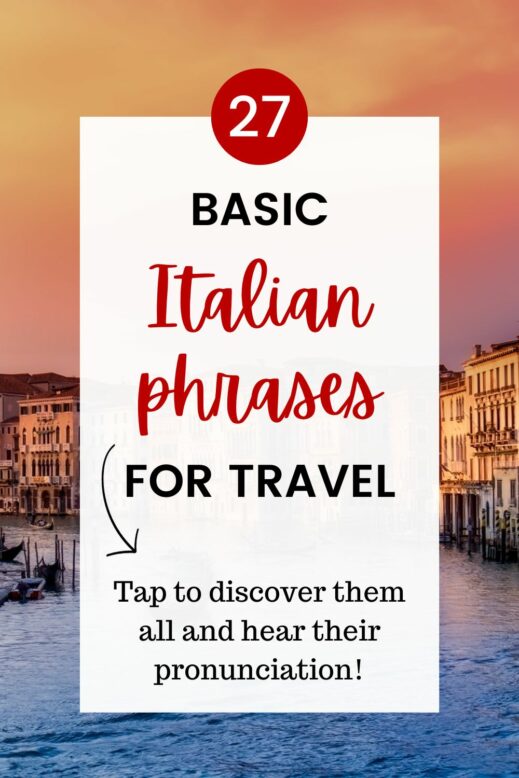
Buongiorno. Buonasera. Ciao. Arrivederci.
If you’re going to start anywhere, let it be with the most basic Italian greetings. Even if you forget everything else in this article, you can be sure that a friendly “Hello!” will go a long way towards making the Italians around you feel more comfortable and appreciated.
The most polite greetings you can use are:
Buongiorno.
Good morning . / Good day. / Hello (formal).
Good evening. / Hello. (formal)
These greetings should be used with people you don’t know, such as shopkeepers, waiters, or anyone else who provides you with a service. Although they translate as “ Good morning ” and “ Good evening ” respectively, they are often used in situations in which we would naturally say “ Hello ” in English.
When saying goodbye, the safest option is the expression arrivederci , especially in formal settings.
Arrivederci.
If you do know someone well, you can switch over to everyone’s favourite informal greeting ciao . What’s interesting about this word is that it is used, not only as a way of saying hello, but also to say goodbye.
Hi! / Hello! / Bye!

Parla inglese? Mi scusi, non parlo italiano (molto bene). Non capisco. Come si dice ___ in italiano?
Let’s face it: if you are a complete beginner, you are eventually going to want to communicate with someone in English, especially if your needs are more complicated than a simple trip to the bagno ( bathroom ). The best way to politely ask if someone speaks English in Italian is:
Parla inglese?
Do you speak English?
Of course, you may not be the one to initiate the conversation, in which case you can respond to the person by saying:
Mi scusi, non parlo italiano (molto bene).
I’m sorry, I don’t speak Italian (very well).
Or you can simply tell the other person that you don’t understand.
Non capisco.
I don’t understand.
If you’re keen on increasing your Italian vocabulary as you travel and interact with the locals, one phrase you simply cannot do without is:
Come si dice [station] in italiano?
How do you say [station] in Italian?
Your new Italian friend will (hopefully) respond in the following manner:
Si dice [stazione].
We say [stazione].
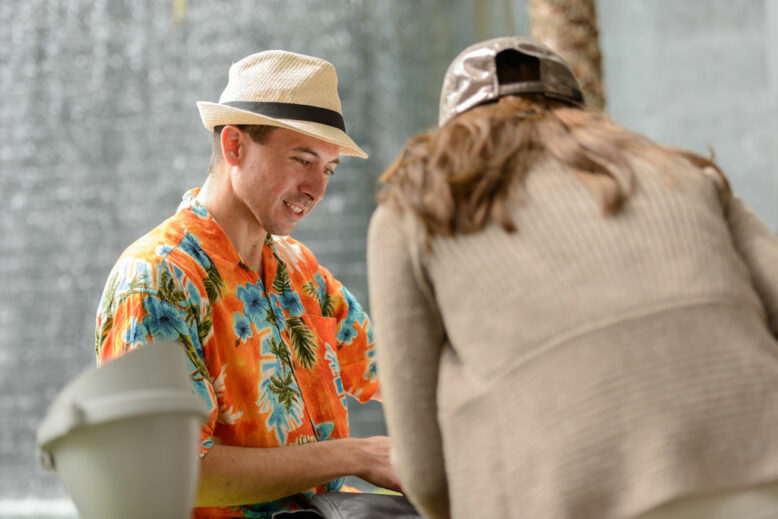
Può scriverlo per favore?
Sometimes verbal communication has its limits. This is why it is so important to be able to ask someone to write things down, especially if it’s important information such as an address or a telephone number .
The best way to ask this question in Italian is:
Can you write it down please?
Another version you’ll often hear starts with Me lo , where me is a first-person pronoun ( me in English). In this case, lo is no longer found at the end of the verb.
Me lo può scrivere per favore?
Of course, you can always replace “ lo ” ( it ) with the specific thing you’d like written down. For example:
Può scrivere l’indirizzo per favore?
Can you write down the address please?
Può scrivere il numero di telefono per favore?
Can you write down the telephone number please?

Dov’è ___? Dove sono ___? Come posso arrivare a/in ___? Sto cercando ___.
One of the most essential Italian phrases every tourist needs to know is “ Where is / are…? ” After all, what could be more important than getting your bearings in a city that’s completely unfamiliar to you?
The singular version of this question is as follows:
Dov’è [la stazione]?
Where is (the station)?
And the plural equivalent is:
Dove sono [i negozi]?
Where are [the shops]?
Once you’ve memorised this question, it is simply a matter of filling in the blank with the right noun. Here are a few common places people look for while travelling:
- i servizi (igienici) = the washroom (polite)
- il bagno = the washroom (less polite)
- la stazione = the station
- il museo = the museum
- la fermata dell’autobus = the bus stop
If you’re feeling brave, you could also inquire how to reach a certain place using the following phrase:
Come posso arrivare [alla stazione]?
How can I get to [the station]?
Admittedly, this phrase requires a little more knowledge of Italian grammar, as it contains two possible prepositions ( a and in ) and the preposition a ( to ) changes form depending on the gender or plurality of the noun that follows. For example:
- Come posso arrivare alla stazione? = How can I get to the station?
- Come posso arrivare al museo? = How can I get to the museum?
- Come posso arrivare in centro? = How can I get to the city centre?
That being said, you will be understood even if you mix up a and in , or if you use a on its own.
One final way of discovering the location of a place is by using the relatively simple expression:
Sto cercando [la stazione].
I’m looking for [the station].
If you want to go a step further, you can use the construction with the verb potere ( can ) and trovare ( to find ).
Mi scusi, dove posso trovare [la stazione]?
Excuse me, where I can find [the station]?

Per favore. Grazie (mille). Prego.
Another way to endear yourself to the Italians you meet on your journey is to learn your “pleases” and “thank yous”.
We already encountered the expression per favore ( please ) in the phrase può scriverlo per favore , but here it is again on its own.
Per favore.
Thank you , on the other hand, is grazie – or grazie mille ( thank you very much ) if you wish to be more emphatic.
Grazie mille.
Thank you very much.
And if someone thanks you for something, the most straightforward way to respond is with the word Prego which means You’re welcome .
You’re welcome.

Quanto costa?
Whether you are buying a train ticket or picking out a souvenir for your best friend back home, it’s important to know how much you will end up spending. The easiest way to inquire about the price of something is:
How much does it cost?
If you are referring to more than one thing however, such as multiple souvenirs, you will need to put the sentence into the plural. Don’t worry if you accidentally use the singular form – Italians will understand you perfectly either way!
Quanto costano?
How much do they cost?
If you need or want to add the object of your purchase to the phrase, you can use a noun accompanied by its definite article ( il, lo, la etc.) or the demonstrative adjective questo/a ( this ).
Quanto costa [la sciarpa rossa]? Quanto costa [questa sciarpa]?
How much does [the red scarf] cost? How much does [this scarf] cost?

A che ora arriva / parte …? Quanto tempo ci vuole per arrivare a …?
If you are planning to make your way around the country using public transport, a very useful question that is worth memorising is:
A che ora arriva/parte [il treno]?
What time does [the train] arrive/leave?
Some common types of public transport include:
- l’autobus = the bus
- il treno = the train
- il tram = the tram
- il traghetto = the ferry
And once you’re on your way, you may wish to ask how much time it will take to get to your destination. Once again, the preposition a ( to ) may change form depending on the noun that follows.
Quanto tempo ci vuole per arrivare a [Torino]?
How much time does it take to get to [Turin]?
- a Roma = to Rome
- alla stazione = to the station
- al museo = to the museum
- all’aeroporto = to the airport
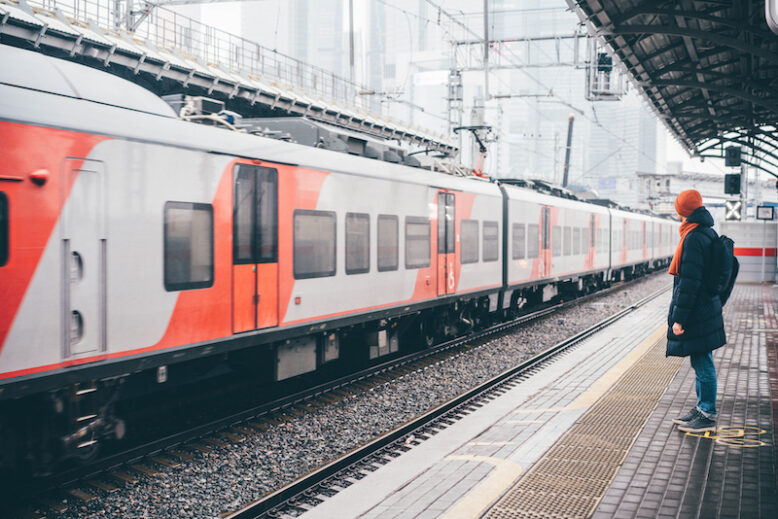
C’è? Ci sono? C’è un/una/un’ ____ qui vicino?
Whenever I start to dabble in a new language, one of the first things I try to master are the constructions “ there is ” and “ there are “. Why? Because they are amongst the most frequently used phrases in any language. The equivalent of “ there is ” in Italian is c’è whereas “ there are ” translates as ci sono .
C’è [un bar]. / Ci sono [dei negozi].
There is [a café]. / There are [some shops].
C’è and ci sono can be used to form, not only a statement, but also a question in Italian.
C’è [un bar]? / Ci sono [dei negozi]?
Is there [a café]? / Are there [some shops]?
An extremely common question you will hear is C’è un ___ qui vicino? which means “ Is there a ___ nearby? “
C’è un [museo] qui vicino?
Is there a [museum] nearby?
Keep in mind, however, that un (which is the masculine indefinite article) may change to una if the object is feminine, un’ if the object is feminine and starts with a vowel, or uno if the object is a masculine noun and starts with s + consonant or z . For example:
- C’è un museo qui vicino? = Is there a museum nearby?
- C’è una stazione qui vicino? = Is there a station nearby?
- C’è un’automobile qui vicino? = Is there a car nearby?
- C’è uno zoo qui vicino? = Is there a zoo nearby?
That said, don’t get too hung up on the various forms of the indefinite article. You will be understood even if you make a mistake!

Posso … Può … Vorrei …
Three additional terms I consider absolutely essential for travel around Italy are posso , può and vorrei . Let’s take a look at them one at a time.
Posso translates as either “ I can… ” as a statement or “ Can/May I…? ” as a question. It is very easy to use as it is always followed by the infinitive form of the verb (or in other words, the form found in the dictionary).
Posso venire. / Posso venire?
I can come. / Can I come?
Può means “ he/she/it can ” but in a formal context, it also translates as “ You can… ” or “ Can you…? “. We’d recommend using this form whenever you address someone you don’t know, such as a person on the street, a waiter or a shopkeeper.
Può scattarci una foto?
Can you take a photo of us?
Può aiutarmi?
Can you help me?
Finally, we have the extremely useful word vorrei which means “ I would like… / I’d like… “. It can be followed by infinitive verbs or nouns.
Vorrei un caffè.
I would like a coffee.
Vorrei comprare due biglietti.
I’d like to buy two tickets.
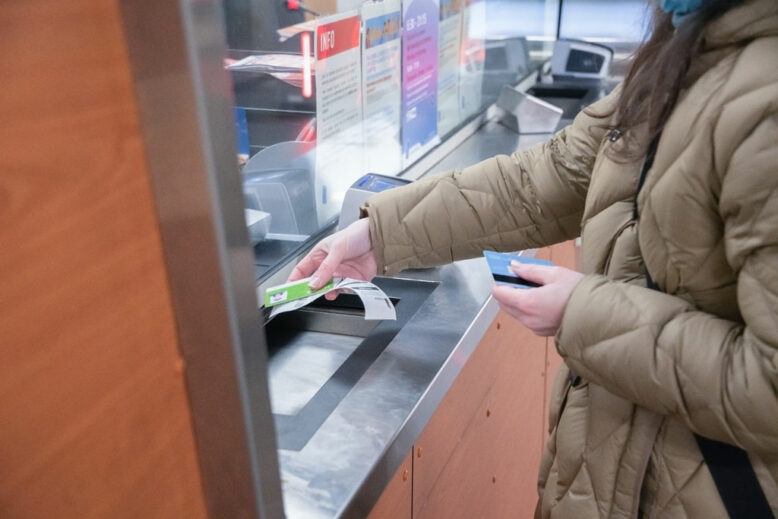
Mi sono perso / persa. Ho perso ___. Aiuto!
Getting lost is never part of a traveller’s plan, but it happens, and it is important to be able to be able to seek help. The best way to do this is, first and foremost, to state that you are lost.
Mi sono perso / persa.
Adjectives in Italian have masculine, feminine and plural forms. In this case, perso is the masculine singular form of “ lost ” and persa is the feminine singular form.
The plural equivalent of this phrase would be:
Ci siamo persi / perse.
We are lost.
Persi is the masculine plural form and perse is the feminine plural form.
If you lose one of your precious belongings, on the other hand, you can say:
Ho perso [il portafoglio].
I have lost [my wallet].
Here are a few other things an unlucky traveller might end up losing:
- il bagaglio = luggage / suitcase
- la carta di credito = credit card
- gli occhiali = glasses
- il passaporto = passport
- il biglietto = ticket
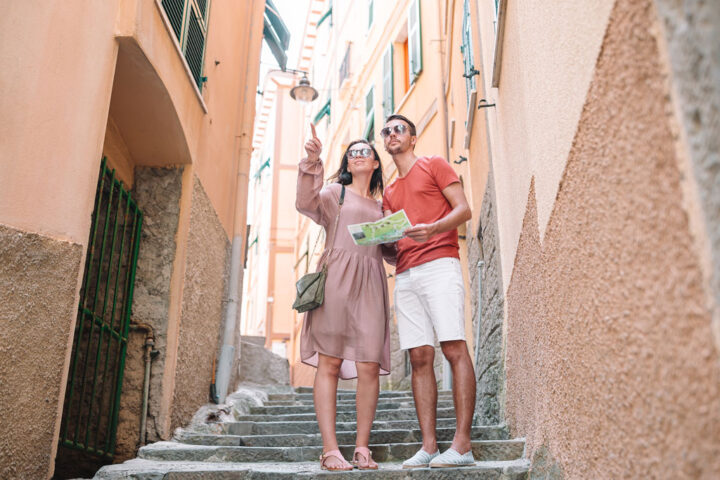
Of course, if you’re in real trouble, you can always call out for help in the following way:
Travelling around a foreign country like Italy is never easy when you don’t speak the lingo, but if you take a moment to memorise a few key travel phrases, we can guarantee that your trip will be far more relaxing and enjoyable than if you made no effort at all.
Are you about to take a trip to Italy? Which of these phrases have you managed to memorise so far? Let us know in the comments below!
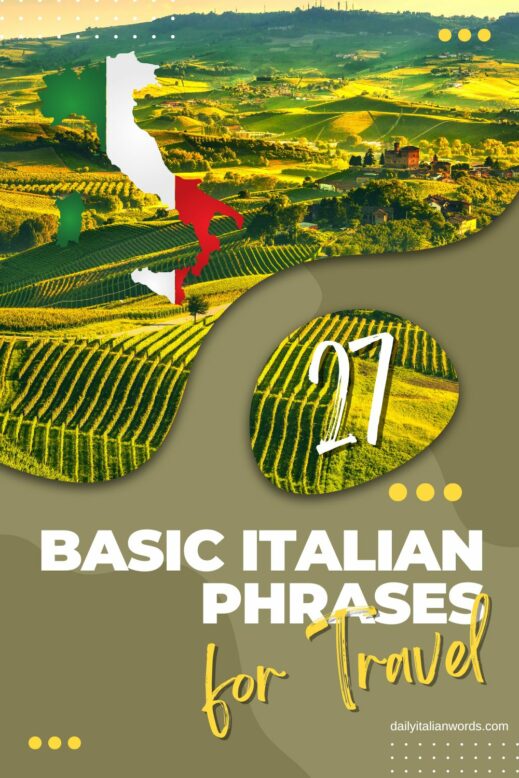
Heather Broster is a graduate with honours in linguistics from the University of Western Ontario. She is an aspiring polyglot, proficient in English and Italian, as well as Japanese, Welsh, and French to varying degrees of fluency. Originally from Toronto, Heather has resided in various countries, notably Italy for a period of six years. Her primary focus lies in the fields of language acquisition, education, and bilingual instruction.
Ethics statement: Below you will find affiliate links. If you buy something after clicking the link, we will receive a small commission. To know more about our ethics, you can visit our full disclosure page. Thank you!

Lingopie (affiliate link) is the Netflix of language learning application that uses real TV shows and movies to help you learn a new language. You can choose a show to watch based on your fluency level, and use the interactive subtitles to get instant translations to help you learn quickly.

Are you interested in improving your Italian in a fun and stress-free manner? Then we highly recommend Serena Capilli's short stories in Italian (affiliate link) , designed for beginners, advanced beginners, and lower intermediate learners (A1-B1 CEFR). These stories have been optimised for English speakers in search of a fun, laid-back learning experience! Read our full review here .
40 basic Italian phrases you need to learn before your next trip to Italy
Recently updated on May 31st, 2024 at 10:42 am
Embark on your next Italian adventure with confidence! Learning a few basic Italian words and phrases is easier than you think, and it goes a long way in enriching your experience while on Italy tours .
Whether you’re navigating bustling cities, charming piazzas, or hidden trattorias, knowing a handful of common Italian phrases will not only help you get by, but also unlock a deeper connection with the culture and its friendly people. Don’t worry, you don’t need to become a master linguist – even a few basic Italian words can go a long way.
Go beyond si (yes) and non (no), ditch the phrasebook, and memorize these 40 handy Italian phrases. Who knows, you might even impress the locals!
Unlock your next Italian adventure with our September Savings .
Essential Phrases in Italian
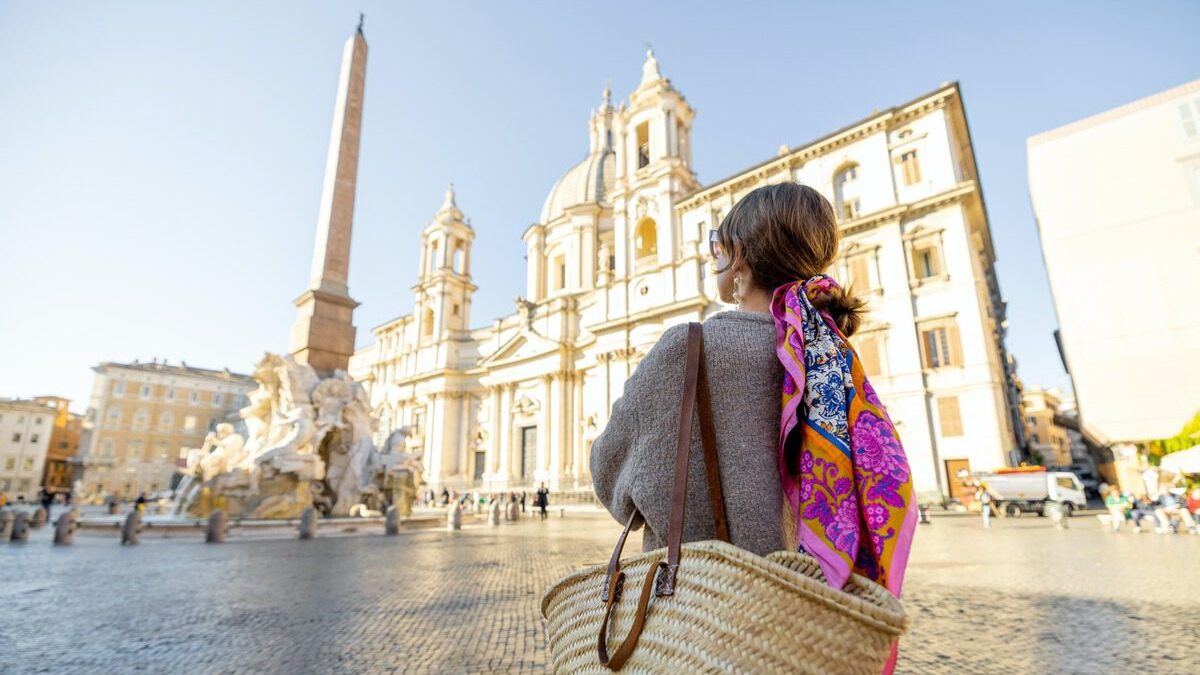
Greetings and Farewells in Italian
If you want to greet people correctly throughout the day in Italy, there are a handful of basic Italian phrases to learn. Some of these basic Italian words are more casual, others are more formal.
If you’re wondering how to say hello in Italian, there are multiple options. When in doubt, listen to what the locals use to greet you and repeat what they’ve said.
1. Hello/Goodbye – Ciao
Ciao is a casual greeting that can be used at any time of day. To be more formal with strangers, use the Italian phrases below instead
2. Good morning. – Buongiorno
How to say good morning in Italian? Say Buongiorno in the morning and until lunch.
3. Good afternoon – Buona sera
This Italian phrase is used in the afternoon, after lunch and before dinner.
4. Boa noite – Buona notte
From 6pm onwards, use this one. You can also use it as a generic way of saying goodbye.
5. Goodbye – Arrivederci
Arrivederci is the formal way of saying goodbye in Italian. You can also say ciao.

Being polite
Now that you have Italian greetings down pat, try these common Italian phrases that are respectful and polite. Whenever you travel to a new country, it’s polite to learn how to say hello, thank you, and excuse me in the local language. If you’re visiting Italy soon it’s essential to memorize these Italian words for your trip.
6. Thank you – Grazie
7. please – per favore, 8. you’re welcome – prego , 9. excuse me – mi scusi, 10. i’m sorry – mi dispiace.
GO TO ITALY: Best of Italy

Getting Around in Italian
Lost in the maze of charming streets? Don’t fret! A polite “Mi scusi, come arrivo a…?” (Excuse me, how do I get to…?) can point you in the right direction.
If you choose to travel with Trafalgar, you’ll have an Italian-speaking Travel Director on hand to navigate the language. And yes, it’s still important to learn some basic Italian words so if you’re at a restaurant alone or visiting a city in Italy without the group you can find your way around.
11. Excuse me, how do I get to…? – Scusi, come arrivo a…?
If you get lost, ask a shopkeeper for directions. Follow their hands!
12. Where is the bathroom? – Dov’è il bagno?
This is one of those common phrases that you should learn in any language! At least memorize the word “bagno”.
13. How much does it cost? – Quanto costa?
This Italian phrase is useful while shopping, visiting flea markets, or asking about specials at a restaurant.
14. One ticket, please – Un biglietto, per favore
15. i understand – capisco .
Or “non capisco” if you don’t understand.

Eating out
In Italy, dining out is an experience – not just a meal. It’s not something you want to rush through as you linger over rich antipasti, savor fresh pasta, and sip local wine – ideally on an ancient piazza or overlooking the vineyards of Tuscany.
Italy embodies the Italian phrase “dolce far niente” – the sweetness of doing nothing – where you embrace long, laughter-filled conversations, and don’t rush off once the meal is done. That can be a tricky adjustment for foreigners visiting Italy.
16. The bill, please – Mi dia il conto, per favore
We’re used to fast service and getting the bill the moment we clear the plate. If you’re in a hurry, memorize this Italian phrase so you can hail your waiter and get the bill.
17. I would like… – Vorrei…
18. can i have… – posso avere… , 19. can i reserve a table – posso prenotare un tavolo , 20. do you accept credit cards – accetta carte di credito.
Often in Europe, it’s helpful to carry some cash, especially if you plan to visit small mom-and-pop trattorias or shop at market stalls.
21. I am allergic to… – Sono allergico a… / Sono allergica a…
If you have allergies, it’s important to learn how to express that in Italian. While you might think Italy – the land of pizza and pasta – is a nightmare destination for gluten-free folk, it’s actually incredibly understanding and easy to find gluten-free meals, pasta and more.
22. Enjoy your meal! – Buon appetite!
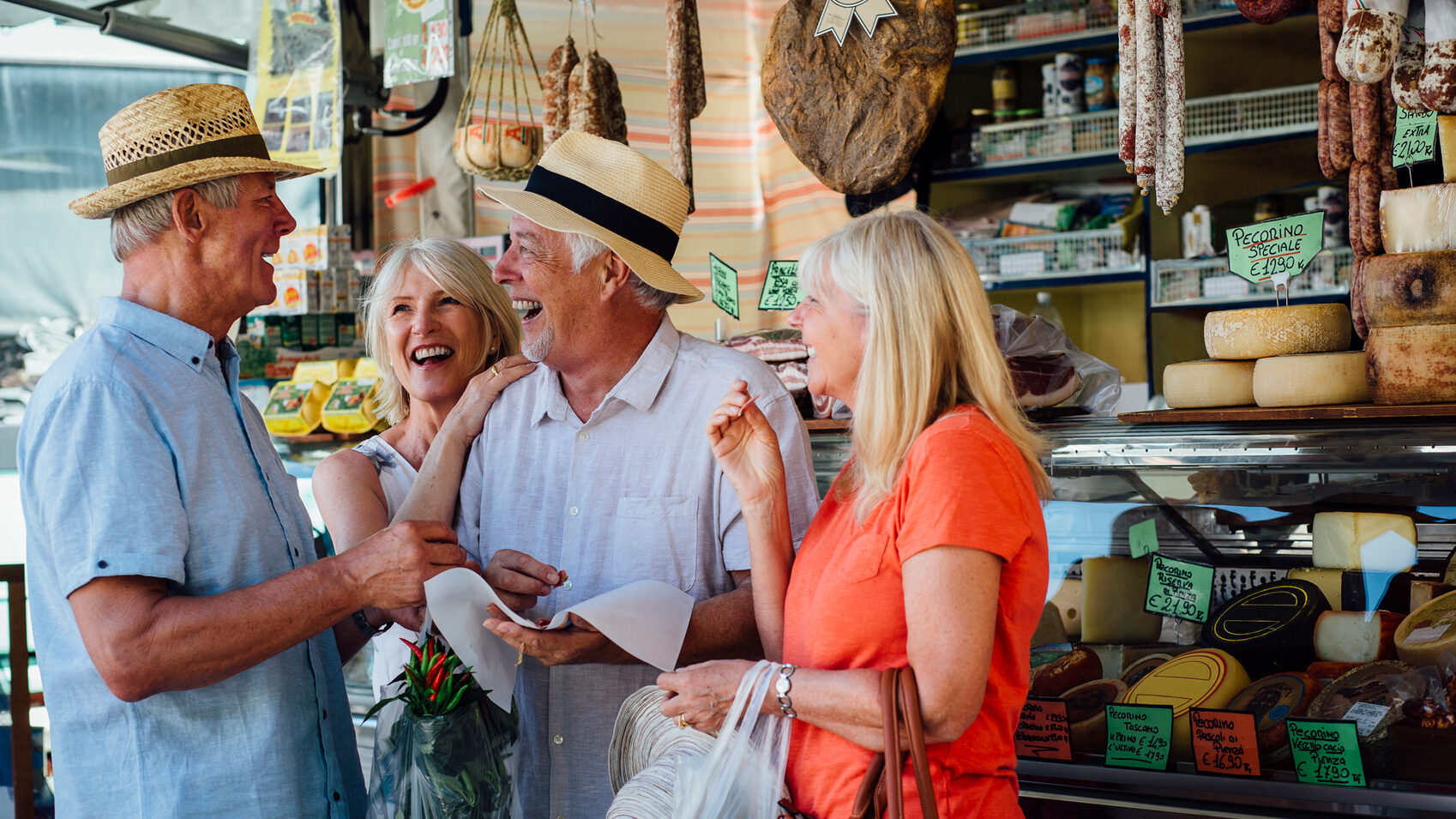
You might also like: The 12 things you need to master to travel like a local in Italy
Shopping in Italian
Italy is famous for its fashion, so if you plan to shop for clothing or souvenirs while visiting here are some common Italian expressions and phrases to help.
23. I would like to try this on – Vorrei provare questo
24. can you offer a better discount – potete offrire uno sconto migliore, 25. can i see this in size… – posso vedere la taglia…, 26. it’s too expensive – è troppo caro, 27. i’ll take it – lo prendo.
TOUR ITALY: Italy Bellissimo

Asking for help in Italian
Feeling lost in translation? Don’t worry, these five handy Italian phrases will equip you to navigate any situation. Whether you need assistance, clarification, or simply want to ask directions, these tools will help you bridge the language gap and ensure a smooth and successful journey.
Plus, Italians are known for their warmth, so don’t hesitate to ask for help.
28. Do you speak English? – Parli inglese?
29. can you help me, please – mi aiuti, per favore, 30. i don’t understand – non capisco , 31. can you speak slower, please – può parlare più lentamente, per favore, 32. where is… – dov’è….

You might also like: Gorgeous Italian cities to inspire your next winter break
Useful Italian Phrases
Striking up conversations and navigating daily life is a breeze with these essential Italian phrases. Introduce yourself with “Mi chiamo…” (My name is…), and inquire about someone’s origins with “Di dove sei?” (Where do you come from?).
33. Where do you come from? – Di dove sei?
34. my name is…. – mi chiamo… , 35. no problem – non c’è problema, 36. is it open – è aperto, 37. see you soon – a presto, 38. it’s hot/cold – fa caldo/freddo.
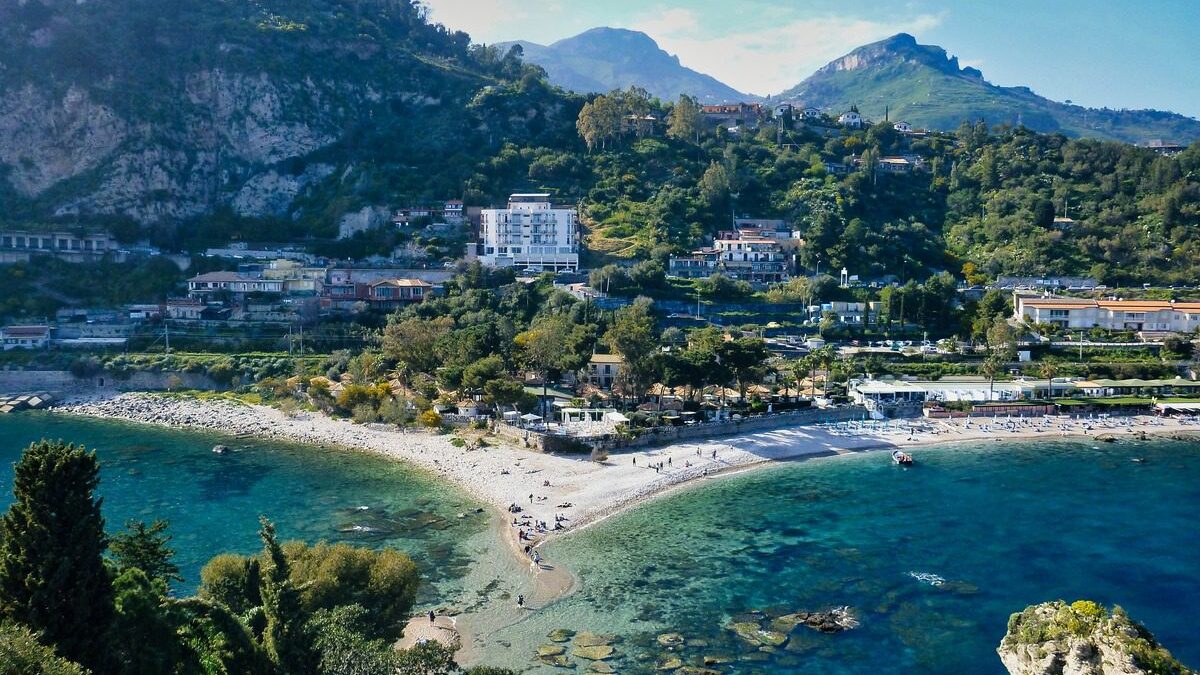
Funny Italian Expressions
Here’s a couple of funny Italian phrases to impress yoru Italian Travel Director. These two are untranslateable idioms, where teh literal meaning makes no sense to an English speaker. Usually someone is quite advanced at the language to be able to pull one of these Italian phrases out!
39. “Break a leg!”/Good luck! – In bocca al lupo
This literally means “into the mouth of the wolf” in Italian, but it means “break a leg” or good luck. It’s super common among native Italian speakers. Instead of saying the standard buona fortuna (good luck), you’ll more likely hear “in bocca al lupo”.
For even more advanced Italian, you could reply “crepi il lupo” (“the wolf cracks”), which is to say the wolf dies. You can also just say grazie (thank you).
40. Solve a tricky situation – Salvare capra e cavoli
“To save goat and cabbages” is an Italian phrase that means finding a solution to a tricky situation without compromising any positive outcome. It’s a good one to learn and pull out if your Travel Director faces any challenging circumstances and is able to navigate and solve the situation with ease. It’s sure to make them laugh!
TOUR ITALY: Italian Holiday
Bonus: Basic Numbers in Italian
Now we couldn’t finish this without teaching you basic numbers in Italian. One of the first hurdles of Italian communication is learning the numbers 1 to 5 – uno, due, tre, quattro, cinque.
These will prove invaluable for everyday interactions. From ordering a “caffè doppio” (double espresso) to bargaining at a market, these basic numbers will open doors to smoother navigation and Italian cultural immersion.
We’ve shared 40 Italian words and phrases to use next time you’re visiting Italy. From how to say good morning in Italian, to funny Italian phrases, which ones will you learn for your Italian trip? Leave us a comment below…
Don’t miss out on our extended September Sale – book now to unlock your next adventure.
Want to hear more from us?
Sign up to receive inspiring travel articles, offers & news
" * " indicates required fields
Privacy Overview
Sign up for our emails (popup).

Home » Europe » Basic Italian Words & Phrases (Perfect for Travelers!)
Basic Italian Words & Phrases (Perfect for Travelers!)
Perfect for beginners, here are 70 basic Italian words and phrases for travel inc. getting around, booking hotels, eating & drinking, etc all with phonetic pronunciation. Impress locals and enhance your experience!
When it comes to visiting Italy, whether you’re planning a trip to Rome , Milan, Florence, Venice (or any other Italian city), or the Italian coast (or any other Italian-speaking destination!), knowing some basic Italian words and phrases can greatly enhance your travel experience.
In this post, we’ll cover some essential Italian vocabulary and phrases (along with their phonetic translations!) that will help you navigate your way through Italy with ease.
We’ll start with some common words and phrases that are useful in everyday situations in Italian and English – along with their phonetic Italian pronunciation – then move on to phrases and words for getting around and asking for directions. We’ll also cover common Italian words and phrases for booking and staying in a hotel, as well as words and phrases for ordering food and drinks at restaurants or cafes.
Whether you’re a seasoned traveler or a first-time visitor to Italy , these essential words and phrases will help you communicate with locals and make the most of your time in this beautiful country. Now we don’t expect you to speak Italian like a native speaker – but we do hope that you are able to use your (new!) language skills to more than just survive on your trip to Italy!
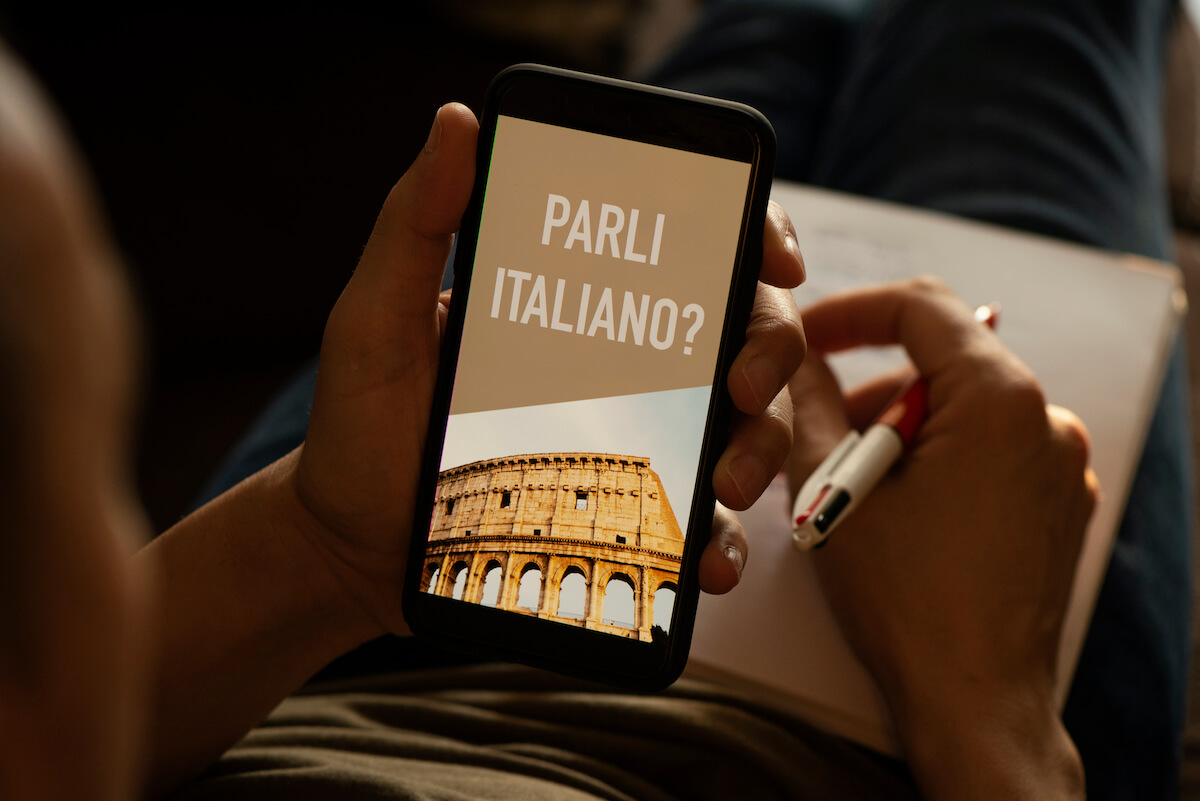
In This Post
- 1 Basic Italian Words for Travel with Pronunciation
- 2 Basic Italian Words and Easy Italian Phrases Related to Getting Directions/Getting Around
- 3 Basic Italian Phrases related to using Public Transport
- 4 Common Italian Phrases related to Food: Eating, Drinking, Ordering, etc.
- 5 Basic Italian Phrases related to Booking and Staying in a Hotel
Basic Italian Words for Travel with Pronunciation
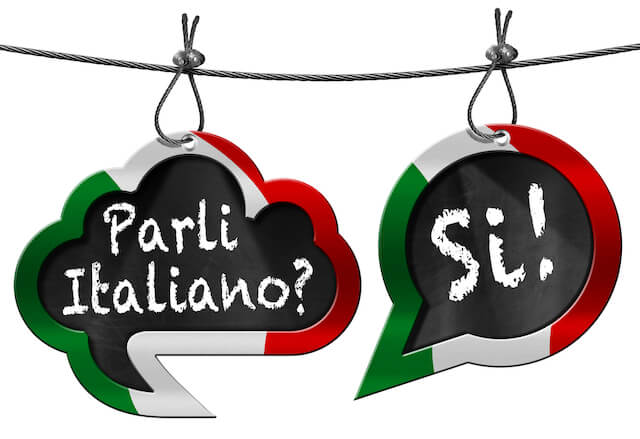
- Yes – Sì [see]
- No – No [noh]
- Hello – Ciao [chow]
- Goodbye – Arrivederci [ahr-ree-veh-dehr-chee]
- Good Morning – Buon giorno [bwon-jour-no]
- Good Evening – Buonasera [bwoh-nah-seh-rah]
- Goodnight – Buonanotte [bwoh-nah-noht-teh]
- Please – Per favore [pehr fah-voh-reh]
- Thank You – Grazie [grah-tsee-eh]
- Thank you very much – Grazie mille [grah-tsee-eh meel-leh]
- Excuse me – Scusa [skoo-zah] / Mi scusi [mee skoo-zee]
- I’m Sorry – Mi dispiace [mee dee-spee-ah-cheh]
- How are you? – Come stai? [koh-meh stai]
- Very Good – Molto bene [mol-toh ben-neh]
- One, Two, Three – Uno, Due, Tre [oo-noh, doo-eh, treh]
- OK – Va bene [vah beh-neh]
- No Problem / It was nothing – Non c’è problema [non cheh proh-bleh-mah]
- You’re welcome / Don’t mention it – Prego [preh-go]
- I don’t understand – Non capisco [non kah-pee-skoh]
- More slowly, please – Più lentamente, per favore [pyoo lehn-tah-men-teh, pehr fah-voh-reh]
- Do you speak English? – Parli inglese? [par-lee een-gleh-zeh]
- I don’t speak Italian – Non parlo italiano [non par-lo ee-tah-lyah-no]
- What is your name? – Come ti chiami? [koh-meh tee kee-ah-mee]
- I would like… – Vorrei… [vohr-ray]
- I am… – Sono… [soh-noh]
- I love you – Ti amo [tee ah-moh]
- What time is it? – Che ora è? [keh oh-rah eh]
Basic Italian Words and Easy Italian Phrases Related to Getting Directions/Getting Around
These basic Italian travel phrases and directions in Italian will be a great help in helping you get around.

- Where is – Dove si trova…? [doh-veh see troh-vah…?]
- Where are..? – Dove sono..? [doh-veh soh-noh..?]
- Where are the toilets? – Dove sono i bagni? [doh-veh soh-noh ee ban-yee]
- I am lost – Mi sono perso/a [mee soh-noh pehr-soh/a] or ho perso [ho pehr-soh]
- Can you help me? – Puoi aiutarmi? [pwah-ee ah-yoo-tar-mee]
- How can I get to…? – Come posso arrivare a…? [koh-meh pohs-soh ah-ree-vah-reh ah…?]
- Turn Left / Right – Gira a sinistra / destra [jee-rah ah see-nees-trah / dehs-trah]
- Go straight ahead – Vai dritto [vai dree-toh]
- Follow this street – Segui questa strada [seh-goo-ee kweh-stah strah-dah]
- Do you know where (x) is located – Sai dov’è situato/a…? [sai doh-veh see-too-ah-toh/a…?]
- The beach – La spiaggia [lah spee-ah-jah]
- The museum – Il museo [eel moo-zeh-oh]
Basic Italian Phrases related to using Public Transport
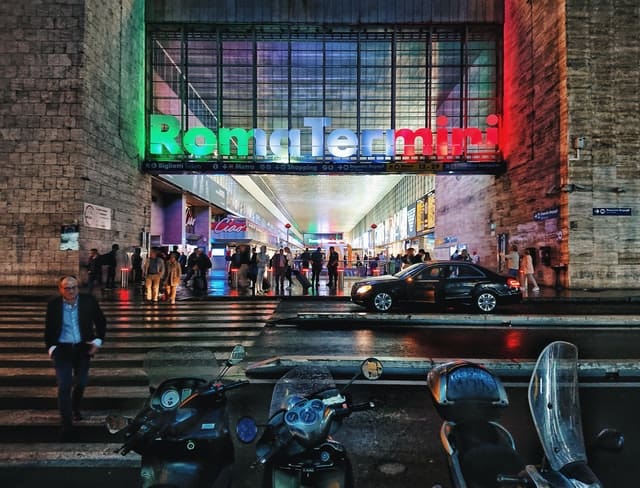
- I would like a ticket for… – Vorrei un biglietto per… [vor-ray oon bee-lyet-toh pair]
- One-way ticket – Biglietto di sola andata [bee-lyet-toh dee soh-lah an-dah-tah]
- Round Trip Ticket – Biglietto di andata e ritorno [bee-lyet-toh dee an-dah-tah eh ree-tor-noh]
- What is the fare? – Qual è il prezzo del biglietto? [kwahl eh eel preht-soh del bee-lyet-toh]
- Can I pay with card? – Posso pagare con la carta? [pos-so pah-gah-reh kon lah kar-ta]
- Excuse me, where is the metro station? – Mi scusi, dov’è la stazione della metropolitana? [mee skoo-zee, doh-veh lah stah-zee-yoh-nay del-lah meh-troh-po-lee-tah-nah]
- When does the train/bus/metro arrive? – Quando arriva il treno/autobus/metro? [kwan-doh ah-ree-vah eel treh-noh/ow-toh-boos/meh-troh]
- Is this the right platform for the train to (destination)? – Questo è il binario giusto per il treno in direzione di (destination)? [kwe-stoh eh eel bee-nah-ree-oh gwyo-stoh pair eel treh-noh een dee-re-tsee-oh-neh dee…]
- Excuse me, can you tell me when to get off for (destination)? – Mi scusi, può dirmi quando scendere per (destination)? [mee skoo-zee, pwoh deer-mee kwan-doh shen-deh-reh pair…]
- Is this the right stop to go to…? – Questa è la fermata giusta per andare a…? [kwe-stah eh lah fer-mah-tah gwyo-stah pair an-dah-reh ah…]
- Where is the exit? – Dove si trova l’uscita? [doh-veh see troh-vah loo-shee-tah]
Common Italian Phrases related to Food: Eating, Drinking, Ordering, etc.

- How much does it cost? – Quanto costa? [kwahn-toh koh-stah]
- The menu, please – Il menu, per favore [eel meh-noo, pair fa-vo-reh]
- Can I see the menu, please? – Posso vedere il menu, per favore? [pos-so veh-deh-reh eel meh-noo, pair fa-vo-reh]
- I would like to order, please – Vorrei ordinare, per favore [vor-ray or-dee-nah-reh, pair fa-vo-reh]
- What do you recommend? – Cosa consiglia? [koh-sah kon-seel-ya]
- I would like… – Vorrei… [vor-ray]
- Enjoy your food – Buon appetito [bwon ap-pe-tee-toh]
- A glass of red/white wine, please – Un bicchiere di vino rosso/bianco, per favore [oon bee-kyeh-reh dee vee-no ros-so/byan-ko, pair fa-vo-reh]
- A jug of tap water please – Una caraffa d’acqua [oo-nah ka-raf-fa da-kwa]
- The bill, please – Il conto, per favore [eel kon-toh, pair fa-vo-reh]
- Excuse me, could we have the check/bill? – Mi scusi, possiamo avere il conto? [mee skoo-zee, pos-see-ah-mo ah-veh-reh eel kon-toh]
- Do you have a reservation? – Ha una prenotazione? [ah oo-nah pre-no-ta-tsee-oh-neh]
- Could we have a table for two, please? – Possiamo avere un tavolo per due, per favore? [pos-see-ah-mo ah-veh-reh oon ta-vo-lo pair doo-eh, pair fa-vo-reh]
- For putting these words and phrases into action, make sure you follow these 8 Italian food rules .
Basic Italian Phrases related to Booking and Staying in a Hotel

- I have a reservation, please. – Ho una prenotazione, per favore. [oh oo-nah pre-no-ta-tsee-oh-neh, pair fa-vo-reh]
- Can I see the room first? – Posso vedere la camera prima? [pos-so veh-deh-reh lah ka-meh-rah pree-ma]
- What time is breakfast served? – A che ora viene servita la colazione? [ah keh o-rah vyeh-neh sehr-vee-tah lah koh-la-tsee-oh-neh]
- Can I have a wake-up call at [time]? – Posso avere una sveglia alle [ora], per favore? [pos-so ah-veh-reh oo-nah sve-glee-ah al-leh o-rah, pair fa-vo-reh]
- What time is check-out? – A che ora si effettua il check-out? [ah keh o-rah see ef-feh-too-ah eel check-out]
- I need an extra pillow/blanket/towel. – Ho bisogno di un cuscino/coperta/asciugamano extra. [oh bee-zoh-nyoh dee oon koo-see-no/koh-per-tah/ah-shoo-ga-ma-no ek-stra]
- Where is the elevator/stairs? – Dove si trova l’ascensore/le scale? [doh-veh see troh-vah lah-shen-so-reh/leh skah-leh]
- Is there a safe in the room? – C’è una cassaforte in camera? [cheh oo-nah kas-sah-for-teh een ka-meh-rah]
- Can you recommend a good restaurant nearby? – Può consigliarmi un buon ristorante nelle vicinanze? [pwoh kon-see-lyar-mee oon bwon ree-stoh-ran-teh nel-leh vee-chee-an-tseh]
Final Thoughts on 70+ Basic Italian Words and Phrases for Travel
We hope these simple Italian words and useful phrases in Italian for travel help you do more than just introduce yourself, ask the time or say hello in Italian (although the basics are a great place to start.) Having a little bit of Italian language on your side while you are traveling in Italy (or any county where Italian is spoken) can be one of your best assets and as such, we hope these useful Italian phrases can help you in a variety of situations and make your travels easier, safer and more enjoyable.
If you liked learning these common Italian phrases, or know someone heading to Italy that needs to learn Italian, please be sure to share on social media: Facebook, Flipboard, and Twitter or grab the image from below for Pinterest. And remember – sharing is caring (and we thank you in advance!)
READY FOR MORE EUROPE TRAVEL INSPIRATION? YOU MIGHT BE INTERESTED IN THESE TRAVEL TIPS, TRAVEL HACKS, TRAVEL ARTICLES, TRAVEL DESTINATIONS GUIDES, SOLO TRAVEL GUIDES, TRAVELER RESOURCES AND RELATED POSTS ABOUT OTHER BEAUTIFUL CITIES IN EUROPE TO HELP YOU EXPLORE EUROPE AND TRAVEL THE WORLD:
- France: 35 Unmissable Things to Do in Paris + Essential Paris Travel Tips + 25 Paris Landmarks + 3 Days in Paris Itinerary + Free Things to Do in Paris & 10 Reasons to Visit Paris
- Spain: Best Places to Visit in Spain + Spain Travel Tips
- Road Trips Resources & Adventure Travel: Road Trip Packing List , Road Trip Tips , Road Trip Quotes & the Ultimate Road Trip Playlist (we’ve also go an Ultimate Travel Playlist for something a bit more general)
- Around the World: The Top Places to Visit in the USA , Australia + The Middle East + Asia inc. Hong Kong , Sri Lanka , South Korea + South Africa !
- Stylish and Affordable Travel Gear – The Best Carry on Luggage for Frequent Travelers , The Best Hardside Luggage for you road warriors, Travel Water Bottle to stay hydrated PLUS the best passport wallets & 40 Insanely Useful Backpacking Essentials to make sure you have everything you need.
Hi There! Thanks for reading my travel guide which features 70 Basic Italian Words and Simple Italian Phrases for Travel! I just wanted to let you know that this post may contain affiliate links, which means if you purchase something after clicking a link, I may get a small commission – which is at absolutely no cost to you . If you enjoyed this article and are going to be searching for some of the things I mention anyway, I would love it if you could click through from the links above & thank you in advance! Read my full disclosure here . And thank you for reading the MakeTimeToSeeTheWorld travel blog.

135 Basic Italian Phrases for Travel: PDF Cheat Sheet
Hello, fellow travelers, and welcome to your comprehensive guide on basic Italian phrases for travel .
With my experience as a native Italian language teacher, I’ve crafted this guide using insights gleaned from interacting with hundreds of international tourists.
My objective is to tackle the unique challenges you may encounter when immersing yourself in a new language during your travels in Italy . I aim to provide the best way to navigate these language hurdles for a smoother experience.
Planning a trip to Italy? Discover the 35 best travel guide books for Italy to enhance your adventure.
Certainly, Google Translate is handy, but learning basic Italian words and local phrases adds a special touch to your trip. Communicating in the local language can deepen connections with native speakers and unlock experiences that English alone may miss.
I’ve created a basic Italian travel phrases PDF to assist your journey. Accessible and user-friendly, it’s a good idea to download the PDF and make it your ideal companion for swift reference while on the move.
Are you ready to dive into the linguistic delights of Italian and elevate your travel experience? Let’s embark on this enriching journey together!
Basic Italian Phrases and Words
Let’s kick things off with a handful of essential Italian phrases and words that will prove invaluable in daily interactions with native Italian speakers.
These simple Italian phrases, which represent the essential Italian vocabulary, will showcase your attempts to connect with locals in their language, enriching your Italian adventure.
Recommended Reading : Discover the 21 safest cities in Italy for an unforgettable experience, whether you’re a traveler or an expat.
Common Italian Greetings

Italians are known for their warm and animated nature. Here are some Italian greetings to get you off to a fantastic start. Tossing out a heartfelt “buon giorno!” with a bright smile can go a long way.
To help you nail these greetings, we’ve listed the most popular key phrases, useful Italian words , and their appropriate use cases.
Formality is typically reserved for strangers and elders, while casual greetings are shared among friends.
Want to learn more about Italian verbs? Explore our comprehensive guide: Italian Verb Conjugation Made Easy with a handy PDF. chart.
Days of the Week and Times of the Day in Italian
Knowing the days of the week and how to tell time in Italian can enhance your travel experience .
This knowledge comes in handy while booking tours, checking opening times, or even planning your daily itinerary.
Here are the days of the week and some useful phrases related to time.
Recommended Reading : Learn how to count in Italian in no time.
Useful Italian Phrases at the Restaurant

Immerse yourself in Italy’s famed gastronomy with these common phrases designed to enhance your dining experiences.
If your Italian escapade includes savoring local cuisines or sampling delectable gelato (which it definitely should!), these essential basic phrases will be your greatest ally.
Useful Italian Phrases at the Hotel
Your hotel serves as your sanctuary while you traverse the landscapes of Italy. Here’s a list of Italian phrases with their English equivalent to ensure your stay is as comfortable as possible.
Useful Italian Phrases When Visiting Attractions

Italy’s rich culture and legendary landmarks are a significant part of any travel itinerary.
We’ve gathered some of the most important phrases to help you secure tickets and ask common questions at attractions to aid you.
How to Ask for Directions in Italian
Avoid getting disoriented in Italy’s labyrinth-like cities with these phrases designed to guide you through your journey.
Shopping Related Italian Phrases and Words

Shopping in Italy is an absolute treat, whether you’re hunting for the latest fashion, unique food items, or charming souvenirs. Here are some phrases to aid you on your shopping spree .
Kids Related Phrases in Italian
Venturing through Italy with your little ones? These phrases will prove immensely helpful in expressing their needs and ensuring they’re catered to.
How to Ask for Help in Italian

Should you require aid while exploring Italy, these phrases will be lifesavers in emergency situations.
While we hope you never have to use them, it’s always wise to remember the old saying, “ better safe than sorry .”
Basic Italian Phrases and Words for Travel FAQ
Answers to commonly asked questions about basic Italian phrases and words for travel.
Why should I learn basic Italian phrases before traveling to Italy?
Learning key Italian phrases demonstrates respect for Italian culture and makes your interactions with locals more meaningful. It can also enhance your overall travel experience.
Suggested Reading : Dive into the world of language learning with our top picks for the best 10 websites and apps to learn Italian through games .
How should I practice these phrases?
Regular practice is key. Try repeating the phrases aloud, writing them down, or using them in conversation. The provided PDF can be a handy resource for practice.
Where can I find a handy reference for basic Italian phrases with PDF?
Within this article, you can download our Basic Italian Phrases PDF cheat sheet, ideal for travelers. This extensive guide is designed to assist you in communicating with ease throughout your adventures in Italy.
Final Thoughts
As we wrap up this guide, remember that language is a beautiful gateway to culture.
By learning and using these essential Italian travel phrases, you’re set to make your Italian adventure even more enriching and memorable. So, embrace the language, enjoy the journey to this beautiful country, and buon viaggio—have a great trip!
Similar Posts

Day Trip from Florence to Venice: Discover the Magic of Venice

The Four Seasons in Italian: A Brief Overview

How to Learn Italian Prepositions Effectively

How to Handle Strikes in Italy: A Traveler’s Guide
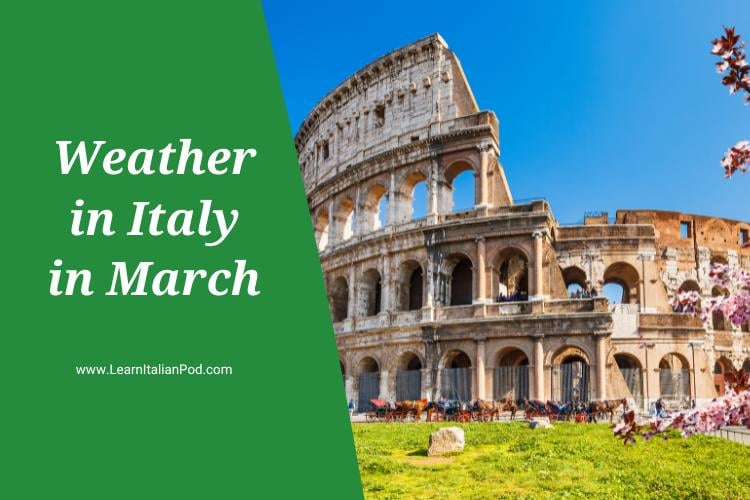
Weather in Italy in March: Your Essential Travel Guide

10 Best Things To Do In Lake Como, Italy for a Perfect Gateway
100+ Common Italian Travel Phrases For Your Trip (With Pronunciation)
23rd April 2024
Planning a trip to Italy? Or just want to learn some common Italian phrases? Get by and impress Italians with these 131 ready-to-use expressions!

Listen to the episode :
So, you’ve finally planned a trip to Italy, or are thinking of learning some Italian…
Wouldn’t it be great to “get by” with some of the most common Italian phrases?
Using Italian will allow you to connect with locals - plus you’ll stand out from those tourists who make no effort.
Here you’ll learn some typical Italian phrases for your trip to Italy.
But this isn’t a dusty old phrase-book!
All the expressions are up to date, and set out in the way Italians really use them. They’ll help you navigate those situations that can feel a bit overwhelming when you arrive somewhere new.
In the first few sections you’ll see the absolute essentials - the most common phrases that will help you get through your first interactions with Italians.
Later, you’ll find Italian phrases for travel situations, like eating, shopping and transport.
Then, to finish, a few special words you can use to put a smile on an Italian’s face!
Before we get started, a quick learning tip: 131 phrases are a lot, but you don’t need to learn them all now. We suggest bookmarking this page so you can find the right phrase when you need it.
Pronti? - Ready?
Cominciamo! - Let’s start!
Italian Phrases for Being Polite
Making sure you’re polite is a top priority when speaking a foreign language, so let’s learn those first:
These phrases speak for themselves. But watch out for the pronunciation of grazie - grats-yeh - it’s surprisingly tricky. Check out this post on how to pronounce grazie so you can impress Italians by sounding really native.
Now you know how to be polite in Italian , you’re off to a great start. But before you start talking to Italians, you’ll need to say “hello”!
Italian Phrases for Meeting and Greeting
If you spend any time in Italy, you’ll hear these all the time:
Although salve isn’t as famous as buongiorno, it’s a very handy word that can be used at any time of day. Plus, it’s a common greeting among native speakers, so it will help you blend in with the locals.
Common mistake alert! Most tourists say ciao all the time, because it’s the most famous Italian greeting. But did you know that it’s actually best avoided in common travel situations, because it’s informal? To sound really Italian, stick to salve or buongiorno/buonasera when arriving and arrivederci when leaving.
For a deep dive into this topic, check out this post on Italian greetings: How Italians really say hello to each other.
Learning tip: Speaking of first impressions… Don’t miss the chance to listen to the phrases as you go. Making an effort with pronunciation, especially when you’ve just started learning Italian, will help your conversations go smoothly.
So now you know how to say “hello” and be polite when you meet an Italian. But what if you don’t understand each other?
Next section to the rescue…
Italian phrases for communication
What can you say if you don’t understand? Perhaps you want to ask someone if they speak English, or encourage them to speak in Italian so you can practice! Learn how to manage communication in Italian with these phrases.
Ever feel like you keep asking people to repeat but still don’t understand that one word? Try repeating the word you don’t know slowly, in a questioning voice. Italians will realise you what you didn’t know and help you to understand.
Another problem you might have is that Italians keep switching to English, when you want to practice your Italian! The best solution is to simply ask if you can speak in Italian, because you’d like to learn. Many Italians will be delighted that you’re showing an interest in their culture and happy to help.
Now you’ve got the foundations in place, it’s time to learn a few common Italian phrases that you can use in loads of situations.
Italian Power Phrases
Combine these phrases to say an awful lot, without needing to learn any grammar. Sì!!!
These phrases cover so many basic requests you might need to make. For example, whether you’d like a coffee, a taxi or a train ticket, you can always use vorrei , followed by the word you want.
With these common Italian phrases, you can already say quite a lot! But what if you just need to pay for something quickly?
How to Pay for Things in Italian
One of the first things you’ll probably need to do: buy and pay for things . Later you’ll learn more specific phrases for bars, cafés, restaurants and shops - but here are the most common phrases you’ll need in all situations.
Keep in mind that Italians don’t normally say centesimi in the price. They usually use the short form un euro e dieci. For example:
- € 2,50: Due euro e cinquanta
- € 9,70: Nove euro e settanta
Pronunciation tip: Pay careful attention to the pronunciation of euro in Italian. In Italian, it starts with an eh sound, like in the word edge. Split it into three syllables and say EH - OO - RO.
When buying stuff, it also helps to have a basic grip of the numbers. To learn them in Italian, don’t miss these useful posts:
How to count to 20 in Italian
How to count to 100 in Italian
It’s thirsty work learning Italian numbers! Time to relax with a coffee or drink.
Italian Phrases for Bars and Cafés
One of Italians’ favourite pastimes is to socialise standing at the bar or sitting in terrazza. Once you’ve learned these common Italian phrases, you’ll be able to order drinks like a local .
You’ve arrived in Italy and a friend says you’ll meet at the bar… at 10 in the morning?? Well, confusingly, il bar is actually a “café” in Italian! Il bar in Italy serves coffee, and sometimes alcoholic drinks, too, so the difference can be a bit blurry. The locali are bars where you’d meet for drinks in the evening, for example, after a day of sightseeing.
Culture tip: Once you’ve arrived at il bar (the café), you can either sit down and wait to be served or order at the counter. It’s typical to see Italians stopping by for a caffé (an espresso) at the counter. Although it may seem strange, drinking your caffé standing up is very common in Italy.
If you’re curious to delve further into the different types of coffee, don’t miss this video which explains how to order coffee in Italy.
So you’ve been out for drinks, but what about sitting down at a restaurant?
Italian Phrases for Restaurants
Who doesn’t look forward to eating out when they go to Italy? If you’re keen to sample some Italian gastronomy, make sure you add these phrases to your essential vocab list.
When you’re going out for a meal in Italy , a good tip is to check if it’s the kind of place where you should reserve a table ( prenotare un tavolo ) in advance, especially on Friday and Saturday evenings. If in doubt, call and book, to avoid finding the place al completo, or “full”.
If you’re dining alone, you can adapt the phrases slightly and say:
Ho prenotato - I made a reservation
Sono pronta/o - I’m ready
Katie says sono pronta, as she’s female, and Matteo says sono pronto, as he’s male.
In Italy, dinner usually starts between 8 and 9:30pm, while lunch starts between 1 and 2pm. Kitchen hours may vary slightly, but Italians are surprisingly strict about meal times.
Once you’ve had a meal out, it’s time to hit the shops!
Italian Phrases for Shopping
Are you one for a bit of window shopping? Use these Italian phrases for shopping to navigate situations on the high street.
Culture tip: In Italy, it’s best to take contanti (cash) with you, especially if you’re moving away from big cities and touristy areas. Many places are still a bit behind the times when it comes to electronic payments.
For example, in a lot of places, you can only buy bus tickets in cash. And while we’re talking about getting around…
Italian Phrases for Travel and Transport
We all know that navigating nowadays is no longer dependent on asking passersby for directions. That said, it’s still useful to learn some common Italian phrases to help you get from a to b , especially if your phone’s out of battery or wifi!
Travelling in Italy can be quite different compared to other places, so here are a couple of tips to make sure everything goes smoothly:
Finally, if you’re lost, you can say mi sono persa/o. Katie would say: mi sono persa, as she is female, and Matteo would say mi sono perso, as he is male.
Perhaps you were making your way to the place you were staying?
Italian Phrases for Accommodation
Hotel staff often speak good English, but it’s still useful to have some key phrases up your sleeve!
If you’re checking in alone, the receptionist will say benvenuta or benvenuto . Benvenuta to Katie, as she’s female, and benvenuto to Matteo, as he’s male.
Learning tips: When saying camera - room - be sure to put the stress on the first syllable: CAmera. Note that you might also hear the word stanza, which has the same meaning.
Next up, let’s learn some little words you’ll hear all the time in Italy.
Helpful Little Italian Words
What makes these little words so helpful? Well, they’re useful in combination with other words in various situations. They’re also those little words you tend to forget - just when you really need them!
Here are some example sentences of when you might use these words:
Ecco la sua chiave - Here’s your key
Allora, cosa facciamo? - So, what shall we do?
Mi piace molto. - I like it a lot!
Caffè? - Un po’. - Coffee? - A little.
Parlo un po’ d’italiano - I speak a little Italian.
Vuoi un caffè anche tu? - Do you want a coffee too?
Anch’io! - Me too!
Con zucchero, per favore - With sugar, please.
Senza zucchero, grazie! - Without sugar, thanks!
Phrases to make Italians smile
Isn’t this what learning a bit of Italian before travelling to Italy is all about? If you can bring these phrases into your repertoire, you’re sure to really connect with the Italians you meet.
Buonissimo is a great word to use if you want to give someone a compliment about their food. It will help you connect with people working in restaurants, or anyone who cooks for you! It also sounds more natural than delizioso , the Italian word for “delicious”, which isn’t used as much.
Lo stesso, which means “the same”, can be used in an “I’ll have what they’re having” way. If you order after someone and you want the same thing, you can just say lo stesso. Or, if something on someone else’s table has caught your eye, just point to it and say lo stesso!
Finally, giusto is a nice, natural way to show you agree with someone, which is always handy to keep the conversation going.
Go forth and speak Italian
Ben fatto! Well done. You’ve now learned 131 Italian phrases for travel. If that feels like a lot to take in, don’t worry… it is. There’s no need to remember everything at once.
Keep this page saved so you can return and learn the phrases in smaller chunks. You can also take this article with you on your smartphone and review it at strategic times during your trip.
Now, if you’re ready to put your knowledge to the test, it’s time to take our quiz.
K: Ciao a tutti e benvenuti. Hi everyone and welcome to “Learn Italian with Joy of Languages”.
M: Before we get started, can we ask you a quick favore ? if you’re listening to this on your podcast app, could you hit the subscribe or follow button? This way you’ll get notified when we release a new episode and you’ll help our podcast grow so that we can keep making free lessons like this. Grazie!
K: If you’ve already been learning from our podcast, we hope you know a few things that will help you get by in Italy. Today, we’ll help you feel more confident using them so that if you’re planning on taking una vacanza, a vacation, in Italy soon, you’ll be able to use Italian.
M: Benvenuti a Napoli! Welcome to Naples. We’ll start with breakfast at the coffee bar, il bar, around the corner.
K: Which words are most appropriate for greeting the barista?
A. Buongiorno
D. Any of the above
M: There are two that work best: Buongiorno (x2) and Salve (x2). These are good for greeting people in the service industry that you don’t know. Ciao is often too informal, but you might hear it and use it if you know the barista.
M: Sometimes if the person is very informal they might greet you with ciao, in this case you can follow their lead, but otherwise it’s best to stick with buongiorno or salve.
K: Now, we’re going to need some caffeine for our day of Italian! There are a few different kinds of coffee in Italy. Which of the following words would you NOT usually hear in an Italian coffee bar?
1. Un espresso
2. Un cappuccino
3. Un latte macchiato
4. Un macchiato
K: It’s A! A normal coffee in Italy is an espresso, so there’s no need to specify . If you order un caffè, you’ll usually get a little shot the way Italians drink it. Then you heard 3 other common breakfast drinks.
M: Un cappuccino, which I think is international! Just remember to make the double P and the double C long. Un cappuccino.
K: Then there was un latte macchiato. Latte means “milk” and macchiato literally means “stained”. So it’s a glass of, usually warm milk, with a shot of coffee in it. Stained by the coffee
M: Un latte macchiato (x2)
K: You also heard un macchiato. Literally “a stained”. This is a shot of coffee with a dash of milk, usually served in a small espresso cup. It’s perfect if you want to try drinking coffee like Italians do but you want to take the edge off with a bit of milk.
M: Un macchiato (x2)
K: Time to order. How would you say “ I’d like…”
M: Vorrei (x2)
K: I’d like a macchiato ?
M: Vorrei un macchiato (x2). Ho fame! I’m hungry. Let’s get a croissant. Here in Naples, we call it un cornetto, and the pastry is usually thicker.
K: and un cornetto
M: e un cornetto
K: Let’s try the whole breakfast order:
M: Vorrei un macchiato e un cornetto (x2)
K: At the end, you can say “please”, per favore, or “thank you”, grazie
M: Vorrei un macchiato e un cornetto, grazie (x2)
K: You’ve finished your lovely Italian breakfast, and it’s time to pay. How would you say “I’d like to pay please?” to pay is “ pagare”. Let’s use per favore…
M: Vorrei pagare per favore (x2)
K: Next, time for some sightseeing. You might need the expression “where is…”. How would you ask that?
M: Dov’è (x2)
K: That’s a combination of dove , which means “where” and è which means “is”. We smooch dove and è together and get dov’è. Remember to make the è nice and strong.
M: Dov’è (x2)
K: Where’s the subway, the metro, la metro ?
M: Dov’è la metro? (x2)
K: Once you get to the center, you need to go towards the port. Where’s the port? Il porto
M: Dov’è il porto? (x2)
K: We want to catch a ferry across to one of the islands in the gulf.
M: Let’s go to Procida, my favourite.
K: You need to buy a ticket. Un biglietto (x2) I’d like a ticket.
M: Vorrei un biglietto (x2)
K: To Procida. In Italian, we literally say “for Procida”
M: per Procida
K: I’d like a ticket to Procida
M: Vorrei un biglietto per Procida (x2)
K: Once you’re there, you realise you’ve forgotten your towel, so you decide to buy one. How would you ask “how much does it cost?”
M: Quanto costa? (x2)
K: Nine euros
M: Nove euro
K: As you know, prices are rarely round numbers! Let’s say nine euros ninety. Ninety is novanta. In Italian we use “e” (and) to add the cents. Literally “Nine euro and ninety”.
M: Nove euro e novanta. (x2)
K: You had breakfast late and it’s very hot in the afternoon, so we decided to skip lunch. By the time we get back to mainland Naples, we’re very hungry.
M: Andiamo in pizzeria! Let’s go to the pizzeria.
K: How would you ask for a table for three?
M: Un tavolo per tre (x2)
K: Time to order some drinks. What do Italians usually order with pizza?
1. Un limoncello
2. Un vino
3. Una birra
4. Un cappuccino
K: C, una birra.
M: Yes, it’s like a tradition, we normally drink beer with pizza.
K: I’d like a beer
M: Vorrei una birra
K: We’ve heard vorrei a lot. Let’s try a different way to order. Another way is per me, literally “for me”
M: Per me una birra (x2)
K: I order a margherita. For me a margherita:
M: Per me una margherita (x2) Then I order a una diavola , which has spicy salami on it. Per me una diavola
K: Diavola literally means “devil” but don’t worry, because food in Italy isn’t normally too spicy! You like the sound of this pizza, so you say “the same”.
M: Lo stesso (x2).
K: As you’re waiting for the pizza to arrive, you go to the bathroom. How would you ask “where’s the toilet?”.
M: Dov’è il bagno? (x2)
K: The pizza comes, and it’s delicious.
M: Buonissima (x2)
K: This time with an A, buonissimA, because it’s LA pizza. At the end of the meal, you ask for the bill. The bill please.
M: Il conto per favore (x2)
K: The waiter tells you to pay at the till. At the till, or cash register
M: Alla cassa (x2)
K: So you arrive alla cassa . You’d like to pay with a card. Can I…
M: Posso (x2)
M: Pagare (x2)
K: by card, literally “with the card”
M: con la carta
K: Can I pay by card?
M: Posso pagare con la carta? (x2)
K: Certo! Of course.
M: Finally, I’m feeling very tired and lazy after all that pizza. So I don’t want to take la metro.
K: We take, or “let’s take” is prendiamo
M: Prendiamo (x2)
K: Let’s take a taxi
M: Prendiamo un taxi (x2)
K: Ben fatto, well done, you got through the whole day in Italian! I hope you enjoyed your time with us in Napoli and you picked up some useful phrases.
M: Feel free to listen as many times as you like, the repetition can help a lot to make sure you’re feeling confident with the phrases before your trip.
K: And if you found this useful, we’ve prepared a special guide for you over on the blog, with a lot more travel phrases that will help you get by using the local language when you’re in Italy. To find it, head over to our website by clicking on the link in the description. Or you can go to italian.joyoflanguages.com/podcast and search for episode 136. Have a nice trip…
M: Buon viaggio!
Time to check your understanding and remember everything you just learned! Below you’ll find a mini-quiz and some vocabulary cards to help it all go in.
How much did you learn? Find out in the quiz!
Click here to take the quiz for this episode: 100+ Common Italian Travel Phrases For Your Trip
Buongiorno = Hello (formal, lit. “good day”)
Vorrei = I’d like
Vorrei un cappuccino, grazie = I’d like a cappuccino, thank you
Vorrei pagare, per favore = I’d like to pay please
Dov’è… = Where is…
La metro = The subway
Dov’è la metro? = Where’s the subway?
Un biglietto = A ticket
Vorrei un biglietto = I’d like a ticket
Quanto costa? = How much does it cost?
Un tavolo per tre = A table for three
Una birra = A beer
Lo stesso = The same (as in “I’ll have the same”)
Il conto, per favore = The bill please
Posso pagare? = Can I pay?
Posso pagare con la carta? = Can I pay by card?
Prendiamo un taxi = Let’s take a taxi
Flashcards: 100+ Common Italian Travel Phrases For Your Trip
Remember the vocabulary from this lesson by downloading the flashcards.
100+ Common Italian Travel Phrases For Your Trip
Not sure how it works? Click here to watch the tutorial
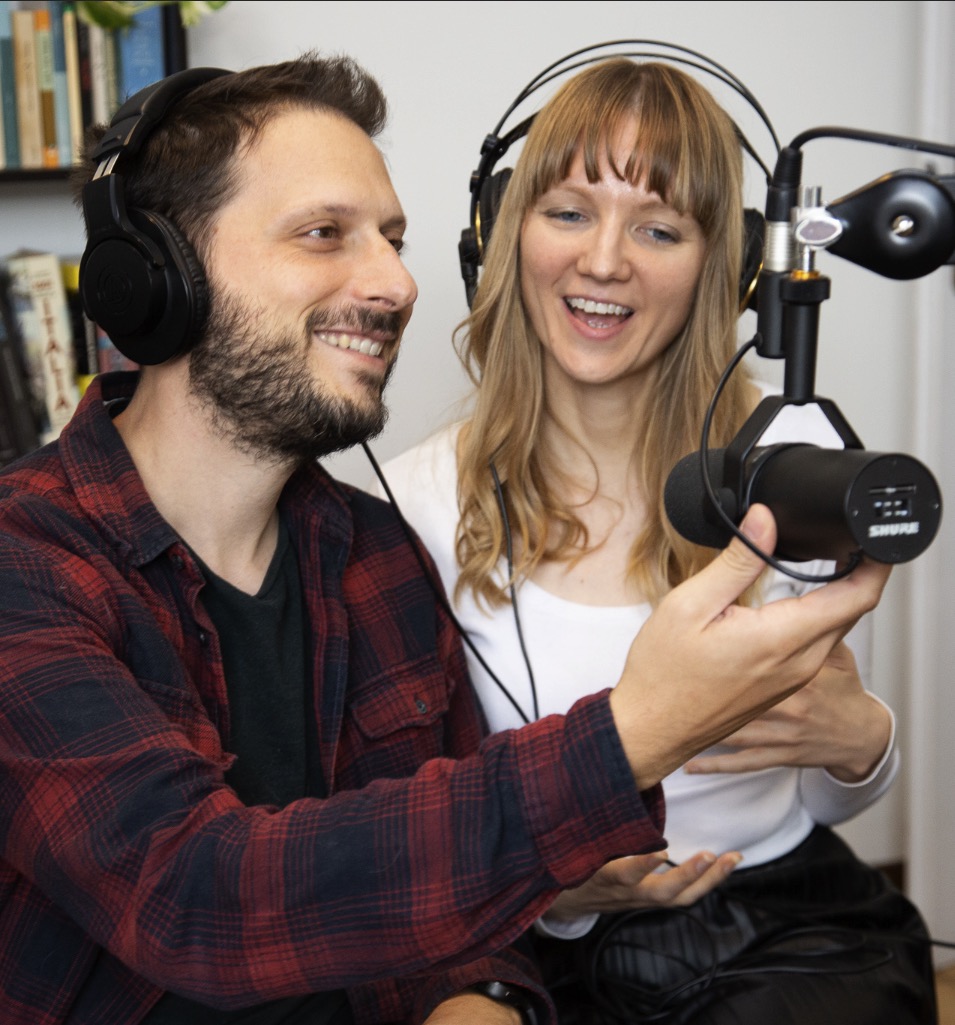
Mamma mia! You’ve signed up – but without our weekly free lesson
Our free weekly lesson is a great introduction to learning Italian in a fun and friendly way. No boring grammar or lists of random words. It’s all about real Italian conversation!
Be the first to hear when registration opens!
Plus! Also send me the free weekly lesson
Bellissimo!
50+ Useful Italian Phrases for Your Travels
UPDATED: November 20, 2023

Everyone visiting Italy should have a basic understanding of the Italian language. Whether you are holidaying in South Tyrol or some other gorgeous corner of the country, below you’ll find a detailed overview of useful Italian phrases for travelers like yourself.
Part of the beauty of South Tyrol is its delicious blend of Austrian and Italian cultural influences. While the majority of locals speak German as their first language, most South Tyroleans are bilingual . This is immediately evident as you encounter signs in German and Italian upon entering the region.
You certainly do not need to know either language to visit South Tyrol; however, your trip will be more rewarding by becoming a little familiar with either one. If you are tying in your South Tyrol trip with a visit to other hot spots in Italy such as the Renaissance city of Florence or the rolling countryside of Tuscany , this article is for you. We cover the basics, as well as give you useful Italian travel phrases.
If you are only visiting South Tyrol and you are not sure whether to learn German or Italian, here’s a quick word test using a traditional South Tyrolean delight — Fresh goat cheese in bacon crust. Do your best to s peak each of the following:
- Ziegenfrischkäse im Speckmantel
- Caprino in crosta di Speck
Which one rolled off the tongue easier? If it was the first, you might prefer bratwurst over pizza and may want to head over to our helpful German phrases article before reading further.

By the way, if you are interested in learning Italian ( or practically any language for that matter ), we highly recommend Babbel. We purchased lifetime access at 50% Off and love learning with it. The app is both fun and addicting!
Time-Saving Tip 🡆 Download our Travel Guide to obtain a printable PDF of Useful Italian Phrases & Words. It’s a great resource to access quickly as a printout or on your phone while traveling in Italy.
CONTENTS OVERVIEW
Don’t Be Brad Pitt – The Basics of Italian Pronunciation
Saying hello & goodbye in italian, basic italian travel phrases for conversations, additional useful italian travel phrases, useful italian words for travel: getting from point a to point b, telling time in italian, know your numbers in italian, ordering food & drink in italian, additional italian language & travel tips, make sure to keep learning italian fun.
Before diving into basic Italian phrases it’s helpful to have a grasp on proper pronunciation. This will come in handy when running into specialties listed on a menu or when meeting someone, for example. After all, you don’t want to come off like Brad Pitt when saying goodbye to your new Italian friends.
Here are some basic Italian pronunciation guidelines:
- “A” is pronounced like the a in water
- “I” like the “ee” in feet
- “U” like the “oo” in boot
- “C” before “i” or “e” is pronounced like a “ch”
- “G” before an “i” or “e” like the “g” in “giraffe”
- “H” is silent
- “R” is almost always rolled…and almost always fun to say!
- “Z” like the “ds” in “ads” at the beginning of the sentence, and like the “ts” in tents everywhere else
- “Gli” sounds like the “lli” in billion, which sounds like “yee”
In general, the emphasis is on the second-to-last syllable (i.e. “Arrivederci” is “ah-ree-vah-DAIR-chee”). This stress helps give the Italian language its poetic cadence. If the last letter of the word has an accent symbol, the emphasis is likely on the last syllable (i.e. perché is pear-kEH)

Now that you know basic Italian pronunciation, here are a handful of greetings you may hear or can use when interacting with the locals or travelers from Italy:
- Benvenuto (Ben ven uto) – Welcome
- Buongiorno (Bwohn journo) – Good morning or good day. Typically used until late afternoon
- Buona sera (Bwohn ah say rah) – Good evening.
- Buona notte (Bwohn ah nau-tay) – Good night. Use when saying goodbye at night
- Ciao (chow) – A common way to informally say hello or goodbye at any time of day
- Salve (sahl vey) – The polite, formal way to say hello. Can be used any time of day
- Arrivederci (ah-ree-vah-DAIR-chee) – The formal way to say goodbye
After starting a dialogue, you may want to inform the person that you speak a little Italian.
- I understand a little Italian: “Io capisco un po l’Italiano” (EE-oh kah-PEES-koh oon poh lee-TAH-lyah-noh)
If you do not want to attempt any conversation in Italian, let the person know you do not speak any Italian.
- I don’t speak Italian: “Non parlo Italiano” (non PAR-lo Italiano)
Then, you would want to follow this by asking them if they speak English.
- Do you speak English?: “Parla Inglese?”(PAR-la ee-GLAY-zay)
If the person responds “No”, they do in fact mean “No”. “Yes” in Italian, on the other hand, is “Si” (see).
While in Italy you should know how to ask where something is located. Nothing is more important when nature calls and you are in the middle of a castle tour that is entirely in Italian. True story. Best told over vino (wine).
- Where is?: “Dove’?” (doe VEH)
- Where is the bathroom?: “Dove’ il bagno?” (doe VEH eel BHAN-yo). Note: If you’re in a panic situation and these words evade you, try yelling “Aiuto!” (I u-toh), which means “Help!”. Once help arrives, of course, the right thing to do is offer a “thank you”: “Grazie” (GRAT-zee-yay)
- Where is a restaurant?”: “Dove’ un ristorante?”(doe VEH oon rees toh-RAHN-tay)
- Where is the main train station?”: Dove’ la stazione centrale?” (doe VEH lah stah-zee-oh-neh sen-trah-lay)
- Where is the cable car?: “Dove’ la funivia?” (doe VEH lah foo-nih-vee-a)
- Quanto costa?: How much does it cost?
- Quanto costa il biglietto: How much is the ticket?
- Per favore: Please
- Prego: You’re welcome
- Mi chiamo…: My name is…
- Come ti chiami: What is your name?
- Quando: When?
- Cosa: What?
- Perché: Why?
- Destra (right), sinistra (left), dritto (straight)
- Vicino (close), lontano (far)

When you’re traveling around South Tyrol or if arriving in other cities like Bolzano (Bozen) , Milan, Verona or Venice first, you’ll likely need to look for specific places or forms of transportation. Here are some of the most common Italian travel words you may need or encounter while on your adventure:
- Arrivo: Arrival
- Partenza: Departure
- Programma: Schedule
- Stazione ferroviari: Train station
- Biglietto: Ticket
- Treno: Train
- Macchina: Car. Also known as auto
- Noleggio auto: Car rental
- Funivia: Cable car
- Autobus: Bus
- Aeroporto: Airport
- Parcheggio: Parking
- Cantina: Winery
- Banca: Bank. Be sure to ask for a bancomat if you’re looking for an ATM
- Mercato del contadino: Farmer’s market
- Farmacia: Pharmacy
- Ospedale: Hospital
- Panetteria: Bakery
- Polizia: Police
- Museo: Museum
- Castello: Castle
- Chiesa: Church
- Uffico del Turismo: Office of Tourism
- Supermercato: Grocery
- Piazza: Town Square
Hopefully, you’re able to avoid getting sick while traveling , but if not keep an eye out for signs indicating “Farmacia” and “Ospedale”. By the way, if you are renting a car while in Italy, see our post on driving in Italy It will help you enjoy a stress-free time on the road.
Knowing how to tell the time in Italy will really only be useful if you forget your watch or if your smartphone dies. In that case, this highly instructional video shows you how to accurately ascertain the time when roaming the Italian countryside.
- Che ore sono?: “What time is it?”
Once you’ve made your way to the supermercato, panetteria or cantina, knowing numbers in Italian helps understand prices, order quantities, etc.
- quattro (4)
- undici (11)
- dodici (12)
- tredici (13)
- quattordici (14)
- quindici (15)
- seidici (16)
- diciassette (17)
- diciotto (18)
- diciannove (19)
- venticinque (25)
- cinquanta (50)
- settanta cinque (75)
- cento (100)

When visiting Italian-speaking places like South Tyrol, the last thing you want to struggle with is ordering food and drink. An Italian adventure without being able to fully savor its culinary treasures is what nightmares are made of. Here are some drinks you may wish to order:
- vino bianco: white wine
- vino rosso: red wine
- birra: beer
- acqua: water
- caffè: coffee
- latte: milk
Here are some basic Italian phrases that will help you while dining in Italy:
- [Un] vino bianco per favore: One white wine please
- {Due] Hugo spruzzo per favore: Two Hugo Spritz please
- [Tre] vini rossi per favore: Three red wines please
Note: Replace vini rossi with vino rosso for a single glass of red wine.
- [Quattro] birra per favore: Four beers please
Note: Replace uno with una for a single glass of beer.
- [Un] caffe con latte per favore: One coffee with milk please
- Tavolo per [due] per favore: Table for two please
- A che ora chiudete?: What time do you close?
- A che ora apri?: What time do you open?
- Hai un menu?: Do you have a menu?
- Posso vedere la lista dei vini per favore?: Can I see the wine list please?
- Quanto le devo?: How much do I owe?
- Puoi scriverlo per favore?: Can you please write that down?
- Posso avere il conto per favore?: Can I have the bill please?
- Posso pagare in contanti?: May I pay with cash?
- Posso pagare con la carta di credito?: May I pay with credit card?
South Tyrol is famous for its unique culinary culture. If you visiting the region take time to discover the must-try South Tyrol cuisine before your trip.

Regardless of whether your journey takes you to South Tyrol or any other region in Italy, you’ll find that dining here offers a unique experience that’s likely different from what you’re accustomed to back home. To fully savor this culinary adventure, check out these helpful tips for eating in Italy. It’s a great companion to our list of useful Italian phrases.
One dish that’s likely on your must-try list is an authentic Italian pizza. For insights into what to expect when ordering this iconic dish , ITALY magazine provides an informative piece that’s worth a read.
Coffee Break Italian Podcast : This podcast has free and members-only versions. While there are additional bonus materials available to members, the free podcast is exceptional. Out of the three resources we mention here, this is the most beneficial for travel in Italian-speaking regions. Another advantage to this podcast is that the hosts provide details on grammar and cultural nuggets, review past lessons and break down the language. If you do not have any Italian language experience, we recommend starting with episode 1.
Untold Italy : Untold Italy is our favorite podcast about visiting the country. Every episode is packed with practical advice and stories that inspire our wanderlust. Katy, the host, excels at providing travel insights and insider tips you cannot find elsewhere. She covers every gorgeous region from the Italian Alps to Sicily.
We’ve learned that the most important part of learning a new language is not to judge yourself too harshly or to take yourself too seriously. Sure you may get frustrated, but just remind yourself that you’re on vacation after all.
You’re going to make mistakes and sound silly. Everyone does. Learning a new language is very challenging, so be patient with yourself. Keep in mind that most Italians are just as self-conscious and apologetic for their English as you are for your Italian.

About KATE & vin
Kate and Vin are South Tyrol + Dolomites travel specialists and the founders of Throne & Vine. They're dedicated to helping travelers discover and visit the most beautiful region in the Italian Alps.
2 thoughts on “50+ Useful Italian Phrases for Your Travels”
This is such a helpful guide for those heading to Italy. I’m so curious now about the Brad Pitt comment, did he totally mangle the Italian language at some point?
Hi Kavita – Glad you find this Italian language guide helpful! Mr. Pitt mangled Italian the second he opened his mouth! Too much Southern drawl!
Comments are closed.
EMBARK ON AN EPIC TRIP TO SOUTH TYROL + THE DOLOMITES 🡆
BOOK A TRIP CONSULTATION CALL
REQUEST A CUSTOM ITINERARY
REQUEST AN ITINERARY REVIEW
FIND YOUR HOTEL
WORK WITH US
ABOUT THRONE & VINE
PRIVACY POLICY
TERMS & CONDITIONS
Throne & Vine is funded by our audience. Some of our articles may contain affiliate links (such as Amazon) which means if you purchase after clicking a link, we receive a small commission at no extra cost to you.
© THRONE & VINE - ALL RIGHTS RESERVED
You cannot copy content of this page
- Vocabulary and Expressions
Basic Italian Phrases for Travelers and Beginners
June 17, 2020 9:00 am
Whether or not you are planning a trip to Italy in the future or simply looking to jumpstart your beginner-level Italian lessons, it’s always a good idea to learn a few basic Italian words and phrases.
Here is your list of essential Italian phrases for beginners as well as for travellers. Ready? Let's start!

Basic Italian phrases
Prego has quite a number of other uses. It also means:
- I beg your pardon?
- How can I help you?
Italian travel phrases
Useful italian words for travelers, asking for directions in italian.
Sooner or later, you will find yourself asking for directions in Italy. Knowing some Italian goes a long way! Especially in smaller towns, people speak little or no English, so being able to get by in Italian makes a huge difference.
Here are some phrases that could help you:
Here are some replies you might hear when asking for directions:
Transport in Italy
If you are planning a trip to sun-kissed Italy, you are probably going to need public transport or hire a car to get around. These phrases will help you:
When you are on a tram, bus or train, and are not sure when to get off, ask:
Italian phrases for staying at a hotel or vacation apartment
Here is a list of Italian phrases that could be useful during your stay:
Here is a list of phrases that could be useful when dining in a restaurant in Italy:
If you are looking for white wine, replace rosso (red) with bianco (white). You can also order un litro (a liter), un mezzo litro (a half liter) or un bicchiere (a glass).
Use the phrase ending in -o if you are a male, and use the phrase ending in -a if you are a female.
Same as above, change the ending to -a if you are a female.
Ask “accettate carte di credito?” if you are not sure if the restaurant will take a credit card.
So, are you ready for your big adventure in Italy? If there are any other useful expressions you would add to this list, write them down in the comments section!

A FUN AND EFFECTIVE WAY TO LEARN ITALIAN
- 10 entertaining short stories about everyday themes
- Practice reading and listening with 90+ minutes of audio
- Learn 1,000+ new Italian vocabulary effortlessly!
About the Author
Jessica Maggi
Jessica is a native Italian speaker, a passionate linguist and a proud Grammar nerd. She has a lifelong passion for English and studied Linguistic and Cultural Mediation at the University of Milan. She currently works as a freelance translator and copywriter.
Leave a Reply
Your email address will not be published. Required fields are marked
JUST ONE MORE STEP AND YOU'LL GET ACCESS TO THE FOLLOWING:
- The Italian Learning Package: 100-Day Italian Vocabulary and Phrases Pack.
Sign Up Below ... and Get Instant Access to the Freebie
PICK YOUR LEVEL
- Free Italian lessons
- Italian short stories
- News in slow Italian
- Italian conversations
Mastering Italian Travel Phrases for Beginners: Your Essential Guide
Mastering Italian travel phrases as a beginner can greatly enhance your travel experience and open up a whole new world of connections and opportunities. Whether you’re planning a vacation to or simply want to immerse yourself in the culture during your travels, learning some basic Italian phrases is essential. By mastering these phrases , you can navigate through different situations with ease and connect with the locals on a deeper level. Knowing Italian travel phrases can help break down language barriers and make your interactions smoother and more enjoyable.
In this essential guide, we will provide you with a comprehensive list of basic Italian travel phrases for beginners. From greetings and introductions to directions, transportation, ordering food and drinks, shopping, and even handling emergency situations, we’ve got you covered.
To truly master Italian travel phrases , we will also share some useful tips, including practicing pronunciation, memorizing key phrases, seeking language exchange opportunities, and utilizing translation apps.
However, it’s essential to be aware of common mistakes to avoid while speaking Italian, such as incorrect pronunciation , misusing formal and informal language, and expecting everyone to speak English.
To further support your learning journey, we will provide you with additional resources to continue enhancing your Italian travel phrases .
By mastering Italian travel phrases , you can confidently navigate through Italy, connect with locals, and make your travel experience truly unforgettable. So let’s get started on your journey to mastering Italian travel phrases for beginners !
Why Learn Italian Travel Phrases?
Traveling to Italy? Wondering why it’s important to learn Italian travel phrases? Let me tell you – it’s the key to enhancing your travel experience, connecting with locals, and breaking down language barriers. Imagine effortlessly ordering your favorite gelato or striking up a conversation with a friendly local. In this section, we’ll discover the benefits that come with mastering Italian travel phrases. Get ready to navigate Italy like a pro and immerse yourself in the vibrant Italian culture!
Enhance Your Travel Experience
Enhancing your travel experience is crucial when visiting a foreign country. Learning Italian travel phrases can greatly enhance your travel experience by allowing you to communicate with locals, navigate through unfamiliar places, and immerse yourself in the local culture. Greetings and introductions will help you break the ice and connect with people, while knowing directions and transportation phrases will enhance your ability to get around. Ordering food and drinks in Italian will enhance your culinary experience, and knowing shopping and negotiating phrases will further enhance your ability to navigate local markets. Be prepared for emergency situations by learning essential phrases . By mastering these Italian travel phrases , you will ensure a smoother and more enjoyable trip. Buon viaggio!
Connect with Locals
To maximize your travel experience, it is essential to connect with locals. Connecting with locals allows you to fully immerse yourself in the local culture , gain insider knowledge , and establish meaningful connections . Here are some valuable tips on how to connect with locals while traveling:
Engage in conversations: Take the initiative to strike up conversations with locals , whether you are at a café, market, or tourist attraction. Show genuine interest in their culture and ask for recommendations.
Participate in local activities: Make an effort to join community events, festivals, or classes so that you can meet and interact with locals who share the same interests as you. This can be an excellent opportunity to bond and gain deeper insights into the local way of life .
Learn the language: Even though you don’t need to be fluent, learning a few basic phrases in the local language demonstrates respect and can help you break the ice with locals more easily.
Break Down Language Barriers
When traveling to a foreign country, breaking down language barriers can be a significant challenge. However, with the right tools and strategies, you can effectively communicate with locals and overcome this hurdle. Here are some tips that will help you break down those language barriers:
1. Learn basic phrases: Take the time to familiarize yourself with essential phrases in the local language, including greetings , asking for directions , and ordering food . By doing so, you demonstrate to locals that you are actively making an effort to communicate effectively.
2. Utilize translation apps: Make use of translation apps on your smartphone or carry a handy pocket dictionary with you to assist in translating words or phrases on the go. These tools can be a lifesaver in overcoming language obstacles.
3. Non-verbal communication: In some cases, gestures and body language can serve as a universal language. When words fail to convey your message, use hand gestures or pointing to effectively communicate with locals.
4. Practice patience and open-mindedness: Understand that language barriers can sometimes lead to miscommunication. It’s crucial to stay patient, remain open to learning, and embrace alternative means of connecting with locals.
By implementing these strategies, you can effectively break down language barriers and experience a more immersive and enjoyable travel experience.
Basic Italian Travel Phrases for Beginners
Mastering Italian Travel Phrases for Beginners: Your Essential Guide takes you on a journey to learn essential Italian travel phrases. In this section, we’ll dive into the basics of Italian travel phrases for beginners. From greetings and introductions to getting around with directions and transportation, ordering scrumptious food and drinks, exploring shopping and negotiating, and being prepared for emergency situations, this guide has got you covered. Get ready to enhance your travel experience with these fundamental Italian phrases!
Greetings and Introductions
Whether you’re traveling to Italy for leisure or business, greetings and introductions play a vital role in making a positive impression and connecting with locals. Here are a few key phrases to get you started:
By incorporating these basic Italian greetings and introductions into your conversations, you can show respect, make connections, and navigate social interactions more smoothly.
Directions and Transportation
When traveling in Italy, it’s crucial to be familiar with basic Italian travel phrases for directions and transportation. Here are some essential phrases that can assist you in navigating your way:
- “Scusa, dove si trova la stazione?” (Excuse me, where is the train station?)
- “A che ora parte l’autobus per il centro?” (What time does the bus to the city center leave?)
- “Quanto costa un biglietto per l’aeroporto?” (How much does a ticket to the airport cost?)
- “Prendo la metropolitana alla prossima fermata.” (I’ll take the subway at the next stop.)
- “Quanto tempo ci vuole per arrivare a…?” (How long does it take to get to…?)
Understanding these phrases can greatly enhance your travel experience, making it easier for you to communicate with locals and navigate around. So, make sure to practice and memorize them before your trip to Italy.
During my visit to Rome , I effortlessly explored the city, thanks to the Italian travel phrases that I had learned. One evening, when I got lost and needed to find my way back to my hotel, I approached a local and politely asked them for directions, utilizing the phrases I had practiced. The local was kind enough to assist me in finding my hotel, and I truly appreciated the opportunity to connect with a resident and overcome the language barrier. Mastering these phrases truly enriched my travel experience in Italy.
Ordering Food and Drinks
When it comes to ordering food and drinks in Italy, it is essential to acquaint yourself with some basic Italian phrases. Incorporating phrases like “Posso avere un menu?” meaning “Can I have a menu?” , “Vorrei ordinare…” which translates to “I would like to order…” , and “Per favore, mi può consigliare un piatto tipico?” meaning “Please, can you recommend a traditional dish?” can be quite useful. Additionally, knowing how to request the bill by saying “Il conto, per favore” (The bill, please) can come in handy. By confidently using these phrases, you will be able to effectively communicate with the waitstaff and fully indulge in the gastronomic pleasures that Italy has to offer.
Shopping and Negotiating
Shopping and negotiating are essential skills when traveling in Italy. Here are some tips to navigate the shopping experience and effectively negotiate prices:
- Research: Before shopping, it is crucial to conduct thorough research on popular markets, stores, and bargaining customs in the area.
- Politeness: Start the shopping experience by greeting the shopkeeper and maintaining a polite attitude throughout the interaction.
- Bargaining: In Italy, it is common practice to negotiate prices in smaller stores and markets. Begin by offering a lower price and be prepared to find a middle ground.
- Body Language: Enthusiastically use hand gestures and facial expressions to convey interest or disappointment during negotiations.
- Patience: Understand that negotiations can be time-consuming, so it is important to remain patient and open to the process.
- Language Assistance: It is advisable to learn some basic Italian phrases related to shopping and negotiating to effectively communicate your needs.
Apply these strategies to make the most of your shopping experiences and secure the best deals.
Emergency Situations
When traveling in Italy, it’s essential to be prepared for emergency situations. Here are some steps to take in case of emergency:
- Stay Calm: It’s crucial to remain calm and composed during emergency situations to make rational decisions.
- Assess the Situation: Quickly evaluate the circumstances to determine the urgency and severity level .
- Contact Emergency Services: Dial the emergency number, which in Italy is 112 , to request assistance.
- Provide Details: Clearly communicate the nature of the emergency, location, and any necessary information to the emergency operator.
- Follow Instructions: Abide by the instructions provided by the emergency services and fully cooperate.
- Seek Medical Assistance: In the event of a medical emergency, promptly seek medical help.
- Notify Authorities: If you experience theft, loss, or any criminal activity, report it to the local police.
- Contact Embassy or Consulate: For foreign nationals requiring assistance, get in touch with your embassy or consulate.
Remember, it’s always prudent to be prepared for emergency situations while traveling to ensure your safety and well-being.
Useful Tips for Mastering Italian Travel Phrases
Looking to master Italian travel phrases? In this section, we’ve got you covered with some useful tips that will take your language skills to the next level. From perfecting pronunciation to memorizing key phrases and discovering language exchange opportunities, we’ve got the inside scoop on how to enhance your Italian communication skills. Plus, we’ll show you how to make the most of translation apps so you can confidently navigate your way through Italy. Let’s dive in!
Practice Pronunciation
- Enhance your Italian pronunciation through practice: Listen to native Italian speakers through various mediums such as podcasts, songs, movies, and TV shows to immerse yourself in the language.
- Imitate and practice: Repeating after native speakers , try speaking out loud and mimicking the pronunciation of Italian words and phrases.
- Evaluate your progress: Utilize a voice recorder or phone app to record your own pronunciation and compare it with that of native speakers.
- Focus on specific Italian sounds: Pay attention to distinct vowels , consonants , and sounds that are unique to the Italian language .
- Engage in language practice with a partner: Find a fluent Italian speaker who can serve as a language exchange partner for speaking and listening practice.
Memorize Key Phrases
Memorizing key travel phrases in Italian can greatly enhance your experience when visiting Italy. Having a few essential phrases at your disposal can help you navigate your way through the country more easily and connect with locals. Here are some key phrases to memorize:
- Greetings: Ciao (hello), Buongiorno (good morning), Buonasera (good evening)
- Directions: Dov’è …? (Where is…?), A destra (to the right), A sinistra (to the left)
- Ordering Food: Vorrei … (I would like…), Il conto, per favore (The bill, please)
- Shopping: Quanto costa ? (How much does it cost?), Posso provarlo ? (Can I try it on?)
- Emergency: Aiuto ! (Help!), Ho bisogno di un medico (I need a doctor)
By memorizing these key phrases , you’ll be better equipped to communicate and navigate your way around Italy. Buon viaggio!
In the early 1800s, the concept of phrasebooks emerged, providing travelers with a convenient way to memorize key phrases. One notable phrasebook, “Italian for Travelers,” was published in 1843 and became widely popular among European travelers. It laid the foundation for future phrasebooks, inspiring the inclusion of practical phrases for various travel situations. Today, travelers continue to rely on phrasebooks and language learning resources to help them memorize key phrases and communicate effectively in foreign countries.
Seek Language Exchange Opportunities
When learning Italian travel phrases , it is important to seek language exchange opportunities to practice and improve your language skills. These opportunities can be found through language exchange programs , online forums, or by connecting with native Italian speakers . Engaging in conversations with locals not only helps to enhance your language proficiency, but it also allows you to learn about the local culture and customs . Language exchanges provide a valuable opportunity to immerse yourself in the language, gain confidence, and build meaningful connections . Don’t miss out on these opportunities to refine your Italian language skills while experiencing the beauty of Italy.
Utilize Translation Apps
Utilizing translation apps can greatly enhance your experience when learning Italian travel phrases. Here are some steps to effectively utilize translation apps:
- Choose a reliable translation app, such as Google Translate or Duolingo , that offers Italian language support.
- Download and utilize the app on your smartphone or tablet before your trip and ensure that it works offline.
- Familiarize yourself with the app’s features, such as text translation , voice recognition , and pronunciation assistance .
- Practice utilizing translation apps by translating basic Italian phrases using the app’s text input or voice-to-text feature.
- Utilize the app to help you communicate in real-time situations like ordering food, asking for directions, or seeking help in emergencies.
By utilizing translation apps, you can easily bridge language barriers and effectively communicate during your travels in Italy.
Common Mistakes to Avoid
Traveling to Italy and want to master the local language? Don’t let common mistakes hold you back! In this section, we’ll explore the pitfalls to avoid when learning Italian travel phrases. From incorrect pronunciation to the misuse of formal and informal language, we’ll guide you through the dos and don’ts. Plus, we’ll tackle the misconception of expecting everyone to speak English. Get ready to navigate Italy with confidence by sidestepping these common language blunders.
Incorrect Pronunciation
Incorrect Pronunciation of Italian travel phrases can lead to misunderstandings and difficulties in effectively communicating. To avoid these issues, it is crucial to pay attention to the accurate pronunciation of words and phrases. Here are a few suggestions to enhance your pronunciation skills:
1. Emulate native speakers: Listen to native speakers carefully and try to mimic their pronunciation. Focus on the sounds and intonation patterns they use.
2. Practice with a language partner: Engage in language exchanges or join a group dedicated to learning Italian to practice speaking. Your language partner can provide feedback and assist you in improving your pronunciation.
3. Utilize pronunciation guides: Take advantage of online resources, audio recordings, and pronunciation guides to learn the correct pronunciation of Italian words and phrases.
4. Record and assess yourself: Record yourself speaking Italian and then listen back to identify areas where your pronunciation needs improvement.
Remember, practice makes perfect. Keep practicing and refining your pronunciation skills to enrich your Italian travel experience.
Misusing Formal and Informal Language
Misusing formal and informal language in Italian can lead to misunderstandings and can make you come across as rude or disrespectful . It is of utmost importance to understand the distinction between the two forms of address and when to use them appropriately. In general, the formal “lei” is utilized with strangers , older individuals , or in professional settings . On the other hand, the informal “tu” is exclusively reserved for family , friends , or people of the same age . Making the mistake of using the wrong form can result in awkward moments or even offend others. Therefore, it is crucial to respect cultural norms and utilize the correct form of address to ensure a smooth and effective communication process.
Fact: In Italian, the formal and informal pronouns can also significantly impact the conjugation of verbs, thus highlighting the importance of using them correctly.
Expecting Everyone to Speak English
Expecting everyone to speak English while traveling to non-English speaking countries can lead to communication challenges and missed opportunities for cultural exchange. It’s important to remember that not everyone in the world speaks English fluently. By making an effort to learn basic phrases in the local language, you can show respect for the host country and its people. This can also help you navigate unfamiliar situations, such as ordering food or asking for directions. Embracing the local language can enhance your travel experience, allow you to connect with locals on a deeper level, and break down language barriers.
Additional Resources for Learning Italian Travel Phrases
When learning Italian travel phrases , having additional resources is extremely beneficial to enhance your language skills. Here are some valuable options to consider:
- Online language learning platforms like Duolingo and Rosetta Stone offer specific Italian language courses focused on travel phrases .
- Italian phrasebooks or pocket guides provide quick access to commonly used phrases and expressions.
- Language learning apps like Babbel and Memrise have dedicated modules for travel phrases that can be accessed on-the-go.
- YouTube channels and podcasts dedicated to teaching Italian travel phrases provide audio and visual learning experiences.
Fact: Additional resources for learning Italian travel phrases can significantly improve your language fluency and confidence while traveling in Italy.
Frequently Asked Questions
1. what are some important italian phrases for beginners when traveling in italy.
When traveling in Italy, it is helpful to know some basic Italian phrases. Here are a few important phrases:
- “Buongiorno” – Good morning
- “Grazie” – Thank you
- “Per favore” – Please
- “Dov’è il bagno?” – Where is the bathroom?
- “Posso avere il conto?” – Can I have the bill?
- “Mi scusi” – Excuse me
2. How widely is Italian spoken?
Italian is spoken by about 85 million people worldwide. It is the first language for 65 million people and the second language for 15 million people.
3. Is Italian a gendered language?
Yes, Italian is a gendered language. Nouns, articles, pronouns, and adjectives have masculine or feminine forms.
4. Can you provide some examples of English words used in Italian conversations?
Yes, there are several English words that have made their way into the Italian language. Some examples include gadgets, jogging, feeling, shock, and okay.
5. How do Italians pronounce English words in Italian?
Italians usually pronounce English words in Italian by adapting them to the Italian phonetic system. For example, “radio” is pronounced as “rah-dee-oh” and “hotel” is pronounced as “oh-tehl.”
6. Where can I find a free printable guide for learning Italian phrases?
You can find a free printable guide for learning Italian phrases in the article mentioned above. Simply follow the link provided to access and download the guide.
{ “@context”: “https://schema.org”, “@type”: “FAQPage”, “mainEntity”: [ { “@type”: “Question”, “name”: “What are some important Italian phrases for beginners when traveling in Italy?”, “acceptedAnswer”: { “@type”: “Answer”, “text”: “When traveling in Italy, it is helpful to know some basic Italian phrases. Here are a few important phrases: ‘Buongiorno’ – Good morning, ‘Grazie’ – Thank you, ‘Per favore’ – Please, ‘Dov’è il bagno?’ – Where is the bathroom?, ‘Posso avere il conto?’ – Can I have the bill?, ‘Mi scusi’ – Excuse me.” } }, { “@type”: “Question”, “name”: “How widely is Italian spoken?”, “acceptedAnswer”: { “@type”: “Answer”, “text”: “Italian is spoken by about 85 million people worldwide. It is the first language for 65 million people and the second language for 15 million people.” } }, { “@type”: “Question”, “name”: “Is Italian a gendered language?”, “acceptedAnswer”: { “@type”: “Answer”, “text”: “Yes, Italian is a gendered language. Nouns, articles, pronouns, and adjectives have masculine or feminine forms.” } }, { “@type”: “Question”, “name”: “Can you provide some examples of English words used in Italian conversations?”, “acceptedAnswer”: { “@type”: “Answer”, “text”: “Yes, there are several English words that have made their way into the Italian language. Some examples include gadgets, jogging, feeling, shock, and okay.” } }, { “@type”: “Question”, “name”: “How do Italians pronounce English words in Italian?”, “acceptedAnswer”: { “@type”: “Answer”, “text”: “Italians usually pronounce English words in Italian by adapting them to the Italian phonetic system. For example, ‘radio’ is pronounced as ‘rah-dee-oh’ and ‘hotel’ is pronounced as ‘oh-tehl.'” } }, { “@type”: “Question”, “name”: “Where can I find a free printable guide for learning Italian phrases?”, “acceptedAnswer”: { “@type”: “Answer”, “text”: “You can find a free printable guide for learning Italian phrases in the article mentioned above. Simply follow the link provided to access and download the guide.” } } ] }


Jun. 5, 2024
Italian immersion: rice voice students travel to italy to learn language, history.
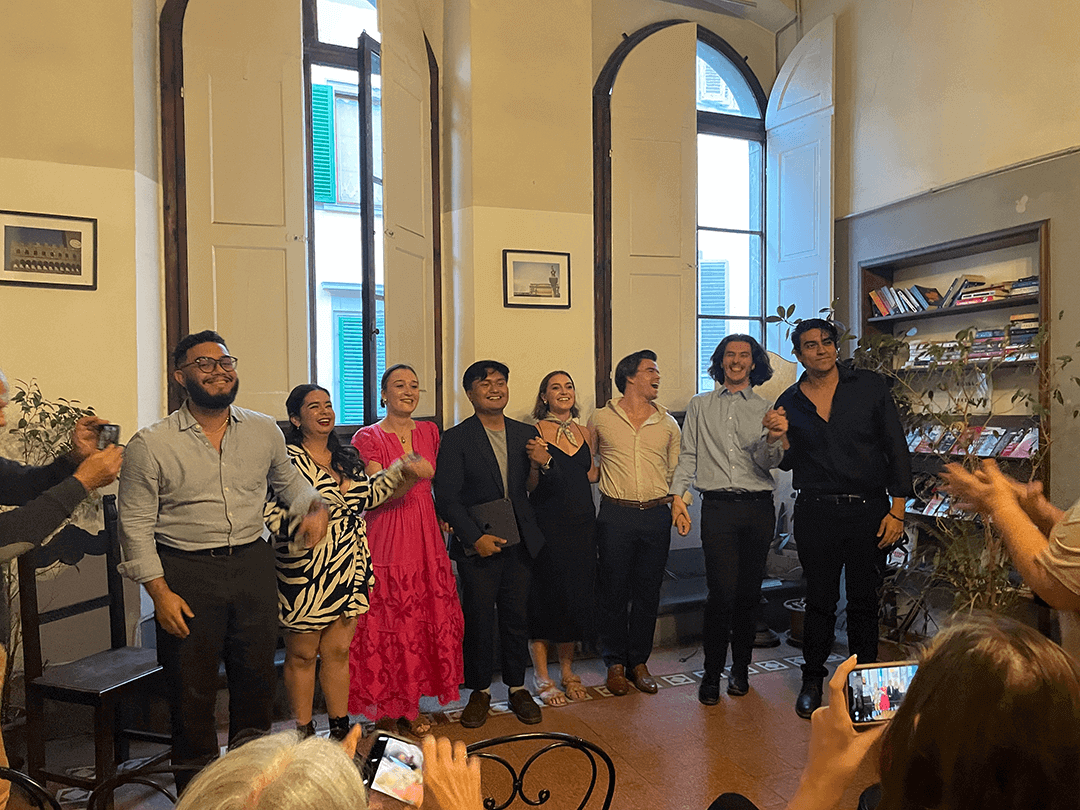
It’s difficult for second-year master’s student Megan Brilleslyper to pick her favorite memory from her three-week trip to Florence, Italy, with several other voice students from Rice University’s Shepherd School of Music .
“Opera was born in Italy,” Brilleslyper said. “Whether you speak the language or not, it was amazing to just be in the region and feel the history.”
Sifting through memories of Italian lessons at the Michelangelo Institute , day trips, cooking classes and wine tours, Brilleslyper got emotional recounting the recital she and the other Shepherd School students performed for their Michelangelo colleagues.
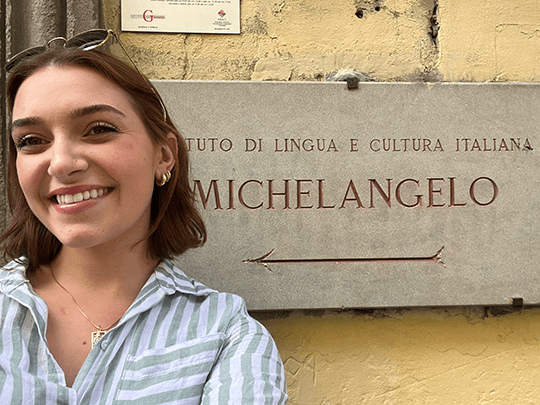
“There we were after three weeks of learning the language, singing some of the biggest Italian arias for a roomful of people who know nothing about opera,” Brilleslyper said. “And yet every single person in the room was touched by it. Everyone was crying. Everyone was cheering. I get emotional thinking about it, but that is why I perform: for moments like that.”
“This trip made me realize how much bigger the world is — not that my life is insignificant, but there are billions of people with stories and experiences as complex as mine,” said Adam Catangui, another second-year master’s student. “How lucky are we to be in a profession that threads those stories together?”
The trip is possible thanks to the late Margaret Pack , whose generous gift funded the Margaret Pack Language Institute for Singers. For more than a decade, the institute has provided Shepherd School students with a special opportunity unique among its peer institutions: to travel to Italy and immerse themselves in the country’s culture and teachings of the Michelangelo Institute.
“Imagine the nicest group of people from all over the world coming together to learn Italian,” Catangui said, adding that the program offered a balanced approach that featured structured learning with dedicated grammar sessions and opportunities to interact with fellow students through conversation classes. “It was in the conversation portion that I got to learn so much about the lives and cultures of my classmates.”
The program extended well beyond the classroom. For example, a weekend trip to Lucca, Italy, the birthplace of composer Giacomo Puccini , offered a tangible connection to the Shepherd School students’ artistic heritage.

“We got to see his house where he grew up,” said Brilleslyper. “All the plaques and information in the museum were in Italian, so we were practicing our Italian and learning about what we were seeing.”
Brilleslyper and Catangui said understanding the language helped them unlock a deeper appreciation for the music they perform.
“It doesn’t really matter how much you memorize translations,” Brilleslyper said. “If you don’t know the language, you can’t truly convey the essence of the character or the story.”
Beyond artistic growth, the experience fostered strong bonds between the students, forging connections that promise to have lasting benefits in the competitive world of opera.
“Being there with not only eight of the most talented people I’ve ever met but just wonderful people, we just had such a good time together,” Brilleslyper said with Catangui adding, “The fact that I got to experience this with my best friends is something that I will hold on to for the rest of my life.”
Just as they’ve returned to Houston with strengthened friendships, Brilleslyper and Catangui agreed that they’ve also brought back a continued commitment to maintaining Italian fluency.
“All of my Italian music now has a deeper meaning for me because I know the words I’m saying,” Brilleslyper said.
That is the goal of the program, said Joshua Winograde , director of opera studies at the Shepherd School.
“Opera is an art form that begins and ends with the expression of text,” Winograde said, expressing his gratitude for Pack’s generosity. “Most students at Rice will spend much of their professional lives singing primarily in languages that they had to learn as adults, and so dedicated immersive language study, such as this trip to Italy, is a crucial part of the education we provide.”
It was an experience Catangui described as “the opportunity of a lifetime,” and one Brilleslyper said has inspired her to apply for young artist programs overseas.
“That just wasn’t something I had really thought of before because of the language barrier,” Brilleslyper said. “Now I’m a little less scared about the idea of trying to have an international opera career. It showed me, ‘OK, you could do it. You can get through it.’”
The Shepherd School’s 2024-25 season will be announced this summer. Sign up to receive the full lineup via email .
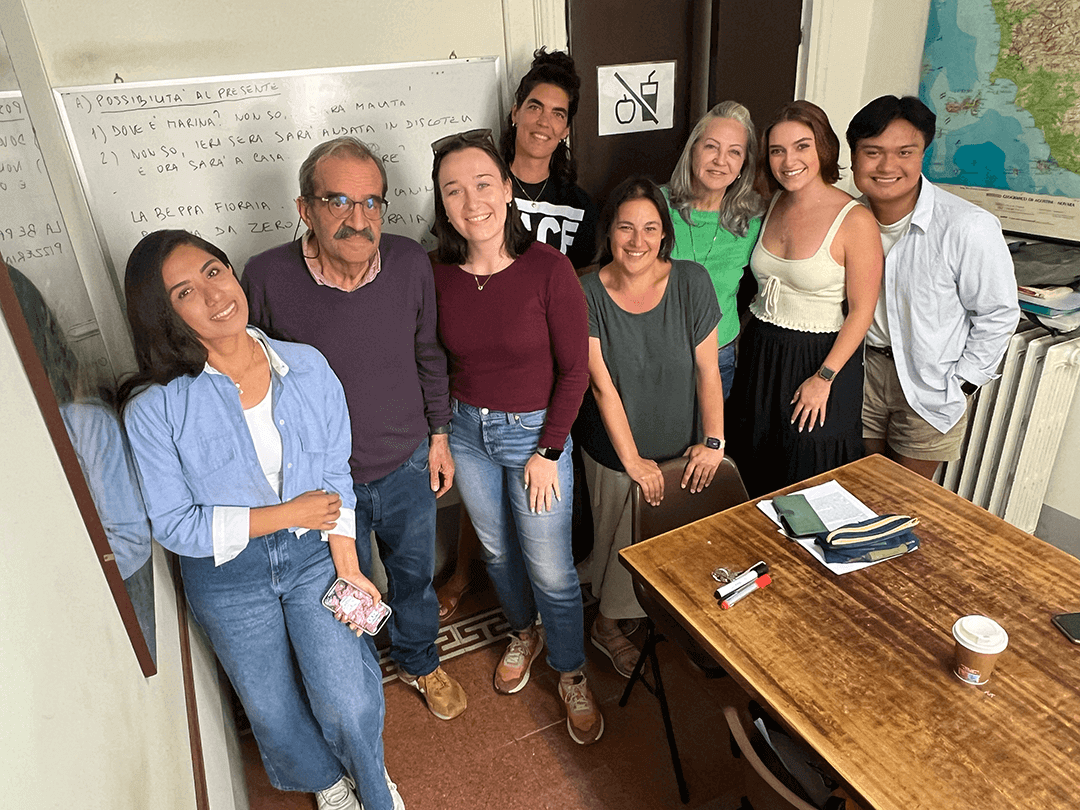

IMAGES
VIDEO
COMMENTS
Learn how to say common words, greetings, numbers, time, days of the week and more in Italian for your trip to Italy. This guide also includes useful phrases for restaurants, museums, transport, shopping and help.
Learn the most important Italian phrases and words for your trip to Italy, from greetings and directions to ordering food and emergencies. Download a free PDF guide with translations, pronunciation and examples.
Learn basic Italian words and sentences for common situations in Italy, such as allergies, kids, seasons, and more. This article is written by a qualified teacher of Italian as a second language and includes free Italian lessons.
Learn the most important Italian words and phrases for your trip to Italy from a travel guide with 20 years of experience. Find basic and common expressions, greetings, numbers, directions, and more with a printable cheat sheet.
Here are 125 of the most basic Italian phrases and words to NEED to know. Mastering common Italian phrases for travel is easy, especially Italian greetings . Whether you're lost amongst the floating alleys of Venice , ordering a tasty gelato in Rome , or browsing the boutiques of Milan, this Italian travel phrase guide will help
Learn essential Italian greetings, questions, and expressions for your Italian vacation. This guide covers common situations, polite interactions, and dining out with confidence.
30+ common Italian phrases for your trip to Italy. There's no better way to level up your trip to Italy than by practicing your Italian! Learning a few key phrases will help you feel more confident ordering in an Italian gelateria (gelato shop) and chatting with locals over an espresso and colazione (breakfast).
Learn the basic Italian words and phrases that will help you communicate and enjoy your trip to Italy. Travel + Leisure shares the essential expressions you need to know.
Check out this video to see 10 essential phrases used by Italians everyday. 3. Making Small Talk in Italian. It's always good to have some small talk phrases under your belt. Here are some phrases that'll help you carry on a simple, casual conversation when you meet someone new. Italian. English.
Learn how to communicate in Italian with these handy phrases for introductions, directions, transportation, restaurants, and emergencies. Whether you want to order food, ask for help, or make friends, this guide will help you prepare for your trip to Italy.
You've collected your luggage and are trying to grab a taxi, but can't find your way around. Here are some useful phrases to help you communicate with the locals. 1. Mi scusi. - Excuse me. When interrupting someone to ask for help, it's polite to use these two words before asking for anything. 2.
Learn how to greet, ask, order, and navigate in Italy with these useful Italian phrases. Discover Discomfort shares audio, examples, and tips for traveling Italy with ease and respect.
Learn These 27 Basic Italian Travel Phrases for Tourists Before Visiting Italy! January 31, 2024 August 6, 2022 by Heather Broster. Contrary to popular belief, the best way to learn Italian for travel isn't to memorise an entire travel phrase book from start to finish, but rather, to pick out a few key phrases that will come in handy over the ...
Here's a couple of funny Italian phrases to impress yoru Italian Travel Director. These two are untranslateable idioms, where teh literal meaning makes no sense to an English speaker. Usually someone is quite advanced at the language to be able to pull one of these Italian phrases out! 39. "Break a leg!"/Good luck! - In bocca al lupo
Basic Italian Words & Phrases (Perfect for Travelers!) Perfect for beginners, here are 70 basic Italian words and phrases for travel inc. getting around, booking hotels, eating & drinking, etc all with phonetic pronunciation. Impress locals and enhance your experience! When it comes to visiting Italy, whether you're planning a trip to Rome ...
Communicating in the local language can deepen connections with native speakers and unlock experiences that English alone may miss. I've created a basic Italian travel phrases PDF to assist your journey. Accessible and user-friendly, it's a good idea to download the PDF and make it your ideal companion for swift reference while on the move.
Click here to take the quiz for this episode: 100+ Common Italian Travel Phrases For Your Trip. Buongiorno = Hello (formal, lit. "good day") Vorrei = I'd like. Vorrei un cappuccino, grazie = I'd like a cappuccino, thank you. Vorrei pagare, per favore = I'd like to pay please.
Check out my Online Italian Course for Beginners here: https://www.teacherstefano.com/beitalianoAre you ready to learn some Italian phrases for travel? In to...
️Learn the MOST COMMON Italian phrases for travellers 🔥Download your FREE Travel Phrase Guide here 👉 https://bit.ly/ItalianPhrasesLP 🇮🇹 Learn travel Ita...
Focus on basic Italian phrases that'll get you through daily interactions. Remember, "Ciao" isn't the only way to say hello! 😉. - **Sentence Structure**: Italian sentences have their own rhythm. Pay attention to how they're built—it's like learning to dance with words. 💃🕺. - **Speak Up**: Practice makes perfect.
Time-Saving Tip 🡆 Download our Travel Guide to obtain a printable PDF of Useful Italian Phrases & Words. It's a great resource to access quickly as a printout or on your phone while traveling in Italy. Additional Italian Language & Travel Tips. Coffee Break Italian Podcast: This podcast has free and members-only versions. While there are ...
Basic Italian phrases. Buongiorno. Good morning. The greetings change depending on the time of the day. Buongiorno is generally used from 5:00 am to midday. Buon pomeriggio. Good afternoon. Buon pomeriggio should be used from 12:00 pm to 4:00 pm, but many Italians skip it and just use buongiorno. Buonasera.
Mastering Italian travel phrases as a beginner can greatly enhance your travel experience and open up a whole new world of connections and opportunities. Whether you're planning a vacation to or simply want to immerse yourself in the culture during your travels, learning some basic Italian phrases is essential. By mastering these phrases, you can navigate through different situations with ...
For more than a decade, the Margaret Pack Language Institute for Singers has provided Shepherd School students with a special opportunity unique among its peer institutions: to travel to Italy and immerse themselves in the country's culture and teachings of the Michelangelo Institute.